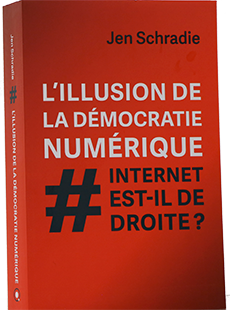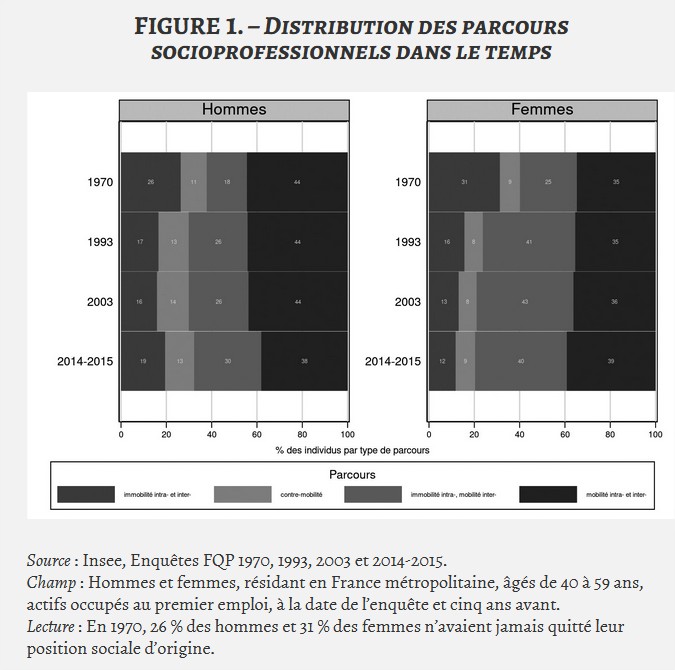Are mixed ability classes bad for school performance and educational choice?

 Image Ground Picture (via Shutterstock)
Image Ground Picture (via Shutterstock)
CRIS Scientific Seminar 2022-2023
Friday, October 28th 2022, 11:30 am
Sciences Po (1, Place Saint-Thomas-d'Aquin) - Room K031
Are mixed ability classes bad for school performance and educational choice?
Or for social and ethnic inequality?
Jan O. Jonsson (Professor, Nuffield College, Oxford university)
Joan E. Madia (DPhil student, Nuffield College, Oxford university)


A longstanding question in the organisation of education has been how to handle pupil groups with differing ability. At the centre of this political discussion and academic theorizing is the question of teaching and learning in ability-homogenous groups. Previous research has suggested that tracking or ability grouping, attempting to make the pupil body homogeneous, does not improve learning on average, in some instances ability grouping leads to increasing inequality. However, lack of suitable data and methodological difficulties have made results inconclusive.
We contribute to the literature with a comparative study between the English school system (with institutionalized ability grouping) and Sweden (with occasional use). We study the effect of (a) homogeneity in ability in instructional groups on grade point averages (GPA), (b) the effect of ability grouping within subjects on grades in these subjects, and we extend our analyses to include educational choice of upper secondary education.
We use the harmonised CILS4EU data (around 9,000 pupils, 200 schools and 400 classrooms), containing rich information on students' ability at individual, class and school levels. We fit school fixed effects and selection models to reduce risks of selection into schools and ability groups.
We find little evidence for any efficiency gain in homogeneous instruction groups or ability grouping, but also little evidence that such grouping has any effects on inequality between students of different socioeconomic or immigrant background. In addition, we find few differences between England and Sweden.
Registration is mandatory. Thank you.
Jan O Jonsson's homepage: https://www.nuffield.ox.ac.uk/people/profiles/jan-o-jonsson/
Joan Madia's homepage: https://www.nuffield.ox.ac.uk/people/profiles/joan-madia/
School Segregation in Post-Apartheid South Africa
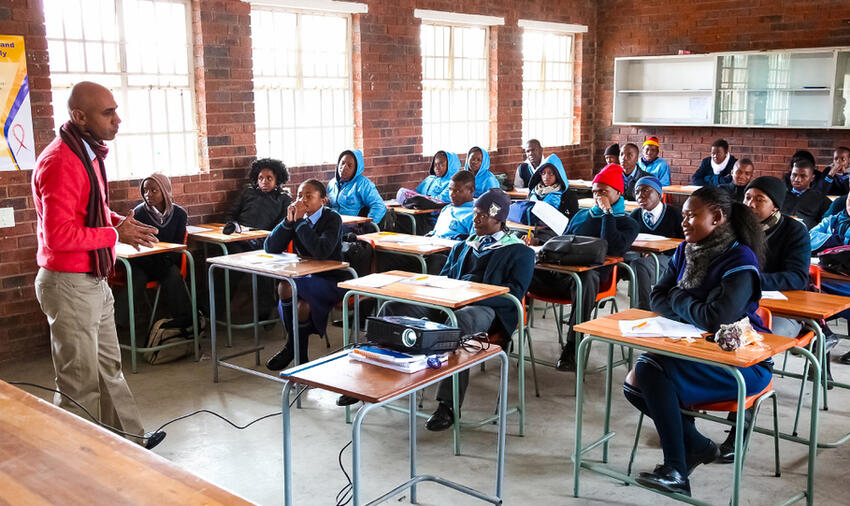
 African High School Children, Johannesburg (Sunshine Seeds, via Shutterstock)
African High School Children, Johannesburg (Sunshine Seeds, via Shutterstock)
CRIS Scientific Seminar 2022-2023
Friday, October 21th 2022, 11:30 am
Sciences Po (1, Place Saint-Thomas-d'Aquin) - Room K011
School Segregation in Post-Apartheid South Africa
Rob J. Gruijters
(Sociologist, Assistant Professor, REAL Centre, University of Cambridge)
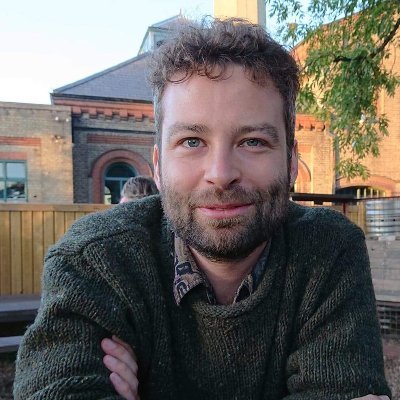
School integration is an important indicator of equality of opportunity and racial reconciliation in post-apartheid South Africa and remains a prominent topic in public and political discourse.
Nonetheless, the extent to which schools have desegregated since the end of apartheid in 1994 remains unclear.
This study therefore provides a comprehensive overview of current patterns of school segregation by race and class in South Africa. It is based on the 2021 Annual School Survey—an administrative dataset covering all South African schools—and the 2019 TIMSS school survey.
Using indicators for unevenness, exposure, and diversity, we report very high levels of school segregation along racial as well as socioeconomic lines in South Africa. White students almost exclusively attend former White schools, have little exposure to the low-income Black majority, and are vastly overrepresented in elite public and private schools.
Based on these findings, we argue that the political settlement that emerged in post-apartheid South Africa facilitated the hoarding of educational opportunities by the White minority and, to a lesser extent, the new Black middle class. In South Africa and other contexts with under-resourced education systems, elite capture of the few high-performing schools serves to reproduce race and class privilege.
Registration is mandatory. Thank you.
Rob Gruijters' homepage: https://www.educ.cam.ac.uk/people/staff/gruijters/
Education and Social Inequality across the Life Course

 Paris s'éveille... Image Bastian Betthäuser
Paris s'éveille... Image Bastian Betthäuser
La mise en œuvre des réformes structurelles en éducation

 Image d'illustration Gorodenkoff (via Shutterstock)
Image d'illustration Gorodenkoff (via Shutterstock)
CRIS Scientific Seminar 2022-2023
Vendredi14 octobre 2022, 11h30
Sciences Po (1, Place Saint-Thomas-d'Aquin) - Salle A201
La mise en œuvre des réformes structurelles en éducation : analyse de cas d’une politique qui visait la suppression d’un système de filières
Kilian Winz
Assistant, docteur, Groupe genevois d'analyse des politiques éducatives (Université de Genève)
 Cette présentation, qui mobilise tant des concepts de sciences politiques que de la sociologie de l'action publique, proposera une réflexion poursuivant l’objectif de mieux comprendre les dynamiques sociales à l'œuvre dans un contexte de réforme structurelle en éducation. Pour ce faire, nous mobiliserons une réforme du mode de répartition des élèves au secondaire 1 en Suisse.
Cette présentation, qui mobilise tant des concepts de sciences politiques que de la sociologie de l'action publique, proposera une réflexion poursuivant l’objectif de mieux comprendre les dynamiques sociales à l'œuvre dans un contexte de réforme structurelle en éducation. Pour ce faire, nous mobiliserons une réforme du mode de répartition des élèves au secondaire 1 en Suisse.
Les résultats, fruits de 84 entretiens semi-directifs menés avec des politiques, des syndicats, membres de l'administration, directions d'établissement et enseignants, sont multiples. Ils mettent en exergue que les professionnels qui œuvrent au sein des établissements scolaires, de par leur marge de manœuvre, contribuent de façon significative à réinterpréter les directives règlementaires à l'aune de leurs expériences, de leurs idées, de leurs intérêts, mais aussi de leur motivation. Par ailleurs, si les propos portent ici sur les acteurs de l’éducation, des ponts sont sans doute envisageables avec d’autres corps de métier.
Merci de vous inscrire en suivant ce lien - En savoir plus sur le chercheur (UNIGE)
Handicap, genre et emploi : regards croisés

 Illustration Kate McDonnel, 2022
Illustration Kate McDonnel, 2022
Handicap, genre et emploi : regards croisés
Sciences Po, Mardi 8 novembre 2022
Accès gratuit, en présentiel ou en visioconférence par Zoom.
Traduction Vélotypie en ligne (Systemrisp) - Traduction LSF en salle (VIA).
Journée de restitution et d’échanges autour du projet de recherche participative « Handicap, genre et précarité professionnelle : parcours biographiques et réception de l’action publique », financé par la FIRAH, l’Agefiph, la Fondation MAAF Initiatives et Handicap, la Croix Rouge Française et mené à Sciences Po (CRIS-LIEPP) sous la direction d' Anne Revillard. Cette journée donnera lieu à des échanges autour du projet avec des chercheur.e.s, des personnes concernées et des acteurs publics et associatifs.
La recherche visait un double objectif : une meilleure connaissance des facteurs de précarisation professionnelle des femmes handicapées, et l’identification de pistes d’amélioration de l’action publique à partir de l’expertise expérientielle des personnes. Elle a été conçue en étroite relation avec six associations du secteur qui partagent un engagement commun en faveur de l’emploi des personnes handicapées, tout en ayant des formats et des spécialisations complémentaires : LADAPT, Agefiph, apiDV, APF-France handicap, Femmes pour le Dire Femmes pour Agir (FDFA), Fibromyalgie France.
Pour plus de renseignements, consultez la page du projet.
Programme
9h20 - Mots d’accueil par Cécile Vallée (Chargée de développement, FIRAH) et Véronique Bustreel (Directrice de l'innovation, de l’évaluation et de la stratégie de l’Agefiph)
9h30 - Handicap, genre et précarité professionnelle : une recherche participative et appliquée
Cette session revient sur la démarche participative du projet. Les associations partenaires ont été impliquées à toutes les étapes du projet, de la conception au questionnement à la diffusion des résultats, selon un triple rôle : expertise, relai, et opérationnalisation des savoirs. La recherche a ainsi vocation à produire des savoirs utiles pour la pratique.
- Présentation du cadre scientifique du projet par Anne Revillard (Professeure associée en sociologie, Sciences Po - CRIS et LIEPP) [support, pdf 183 Ko]
- Retours d'expériences des associations sur leur participation au projet, par Carole Saleres (APF - France handicap)
- Résultats et valorisation, par Mathéa Boudinet (Doctorante en sociologie, Sciences Po, CRIS-LIEPP)
- Dimension appliquée du projet, par Véronique Bustreel (Agefiph)
10h30 - Handicap, genre et travail : quelles données ?
Cette session revient sur les données qualitatives et quantitatives disponibles ou à produire pour investiguer l'articulation entre handicap genre et travail. Animation : Célia Bouchet (Mission pour la place des femmes, CNRS, CRIS)
- Les données disponibles et manquantes, par Arnaud Lenoir (Agefiph)
- Présentation de l'ouvrage « Portraits de travailleuses handicapées », par Anne Revillard et Mathéa Boudinet (CRIS-LIEPP)
11h30 - Handicap, genre et accès à l’emploi
Quelles sont les difficultés d'accès à l'emploi des personnes handicapées et notamment des femmes ? Cette session croise les points de vue des chercheuses, d'une spécialiste de l'accompagnement vers l'emploi et de femmes directement concernées. Animation : François Martinez (Agefiph)
- Handicap et division du travail au sein des couples, par Célia Bouchet (Postdoctorante en sociologie, Mission pour la place des femmes, CNRS, associée CRIS) [support, pdf 520 Ko]
- Discrimination dans l'accès à l'emploi en raison du handicap, par Naomie Mahmoudi (Postdoctorante au CNAM, chercheuse affiliée au laboratoire de recherche ERUDITE) [support, pdf 722 Ko]
- Accompagner vers l’emploi, par Déguène Alix (APF - France handicap)
- Témoignages de créatrices d’entreprise, avec Giulia Riccioni et Sandra Tournadre
13h – 14h30 – Pause déjeuner
14h30 - Handicap et genre au travail
Comment se joue l'articulation entre handicap et genre dans les expériences au travail ? Une fois en emploi, à quels obstacles les femmes handicapées doivent-elles faire face ? Quels sont les dispositifs publics et les pratiques des entreprises pour favoriser leur accompagnement ? Comment les faire évoluer ? Animation : Charles Myara (LADAPT)
- Qui trouble l'ordre de l'entreprise ? La figure du travailleur idéal au croisement entre genre et handicap, par Mathéa Boudinet (Doctorante en sociologie, Sciences Po - CRIS et LIEPP)
- Barrières systémiques à l’insertion professionnelle : entre handicap, genre et culture, par Audrey Dupont (Postdoctorante Université de Montréal/CHU Ste-Justine - Université du Québec à Rimouski) [support, pdf 400 Ko]
- Témoignages de femmes en entreprise, avec Margaux Gambier (MSA)
16h15 – Handicap, genre et politiques de l’emploi
Cette session ouvre un débat sur les recommandations issues de cette recherche participative et des autres travaux présentés au cours de la journée : comment améliorer l'accompagnement des femmes handicapées vers et dans l'emploi ? Animation : Anne Revillard
- Quelles recommandations à l'issue de cette recherche, par Mathéa Boudinet (Doctorante en sociologie, Sciences Po - CRIS et LIEPP)
- Présentation de l’action de FDFA en matière d’emploi, et apports de cette recherche pour la réflexion et l’action associatives, par Claire Desaint (Vice-présidente de Femmes pour le Dire Femmes pour Agir, FDFA) [support, pdf 218 Ko]
- Quelques images de la journée (réalisation Thomas Arrivé, Sciences Po)
- Compte-rendu de la journée (Camille Chaudron) [pdf, 283 ko]

L'ouvrage coordonné par Mathéa Boudinet et Anne Revillard est publié aux Éditions science et bien commun.
Accès à la version en ligne (libre consultation) en suivant ce lien.
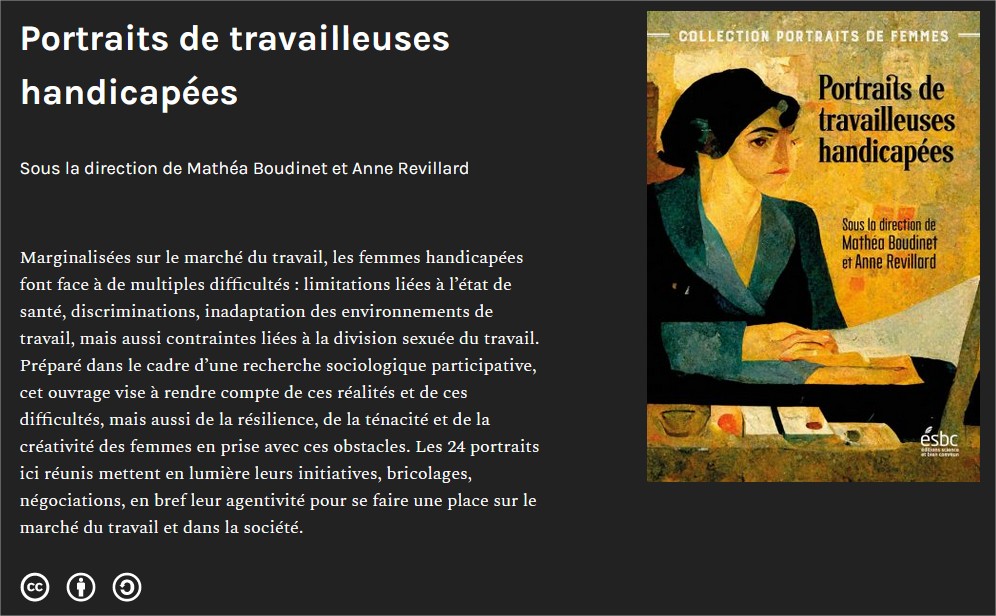
The intersection of Family Income, Race and Academic Performance in Access to Higher Education in Brazil
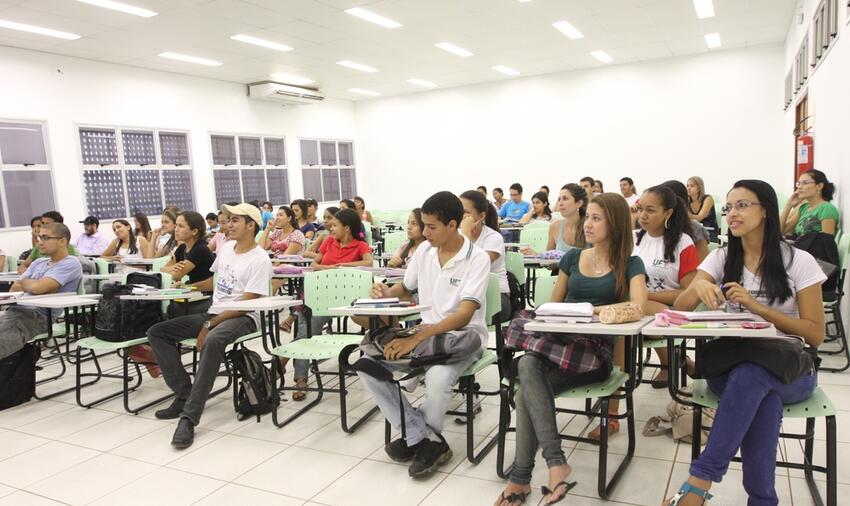
 Federal University of Tocantins, Image Bruno Cesar Spada (via Shutterstock)
Federal University of Tocantins, Image Bruno Cesar Spada (via Shutterstock)
CRIS Scientific Seminar 2022-2023
Friday, October 7th 2022, 11:30 am
Sciences Po (1, Place Saint-Thomas-d'Aquin) - Room K008
The intersection of Family Income, Race and Academic Performance in Access to Higher Education in Brazil
Carlo Antonio Costa Ribeiro
Full Professor of Sociology, Instituto de Estudos Sociais e Políticos da Universidade do
Estado do Rio de Janeiro (IESP-UERJ)
 This presentation investigates the intersection of income and race in structuring access to higher education among students that participate in a national high-stakes exam in Brazil.
This presentation investigates the intersection of income and race in structuring access to higher education among students that participate in a national high-stakes exam in Brazil.
Our objectives are:
- to estimate the probability of students coming from different income strata, racial groups, and performance levels to access higher education and
- to decompose income and racial effects into direct (net of educational performance) and indirect effects (through educational performance).
Our data comes from a panel of high school graduates tracked between 2012 and 2017 and allows us to describe the following findings.
Firstly, the probability of entering higher education is always higher among candidates from higher income strata. Second, there is a convergence in admission probabilities across the performance scale. Third, the admission curve across a performance scale is much steeper among applicants from low-income strata compared to richer students.
In all of these results, students self-identified as black, brown, or indigenous (BBI) are less likely to transition to higher education than whites, even though they are in the same income and performance strata.
We suggest that students from privileged socioeconomic backgrounds benefit from alternative entry strategies, such as paying tuition at less competitive private colleges. For students from low-income strata, the main alternative for entering higher education is through high academic performance. By decomposing racial effects, we show the cumulative effect of racial stratification; the gap between white and BBI students is both related to a higher propensity of transitioning to higher education and higher educational performance.
Réceptions et appropriations parentales du diagnostic médical de variation du développement sexuel

 Image d'illustration DC Studio (via Shutterstock)
Image d'illustration DC Studio (via Shutterstock)

Gaëlle Larrieu, doctorante au CRIS soutiendra sa thèse de doctorat le jeudi 13 octobre 2022 à 14h à Sciences Po.
Entre leurs enfants et les médecins : les expériences parentales des variations du développement sexuel
Composition du jury : Nathalie BAJOS (EHESS - IRIS), Janik BASTIEN‑CHARLEBOIS (UQAM), Marta DOMINGUEZ FOLGUERAS (Directrice de recherche, Sciences Po - CRIS), Wilfried RAULT (INED), Anne REVILLARD (Sciences Po - CRIS et LIEPP), Isabelle VILLE (EHESS - CEMS).
La prise en charge médicale des variations du développement sexuel, aussi nommées intersexuation, est l’objet de débat depuis une vingtaine d’années dans le monde, et plus récemment en France.
Partant du constat que la prise en charge est centrée sur la période de l’enfance, cette thèse propose d’analyser les expériences parentales contemporaines des variations du développement sexuel en France.
Son objectif est de saisir et caractériser la place singulière et intermédiaire qu’occupent les parents entre leurs enfants et les médecins. Pour cela, la thèse s’appuie sur des matériaux qualitatifs : des entretiens biographiques avec 54 parents d’enfants présentant une variation du développement sexuel, des entretiens informatifs menés auprès d’autres acteurs ainsi que l’exploitation de sources écrites.
Le parcours des parents est retracé selon une approche chronologique en partant de l’annonce d’un diagnostic médical en allant jusqu’aux implications de cette découverte au sein du foyer et dans les relations familiales.
Au croisement des études sur l’intersexuation et de la sociologie de la famille, cette thèse permet d’enrichir ces deux champs de recherche ainsi que la sociologie du genre et de la médecine.
Concours chargé·e de recherche CNRS 2023
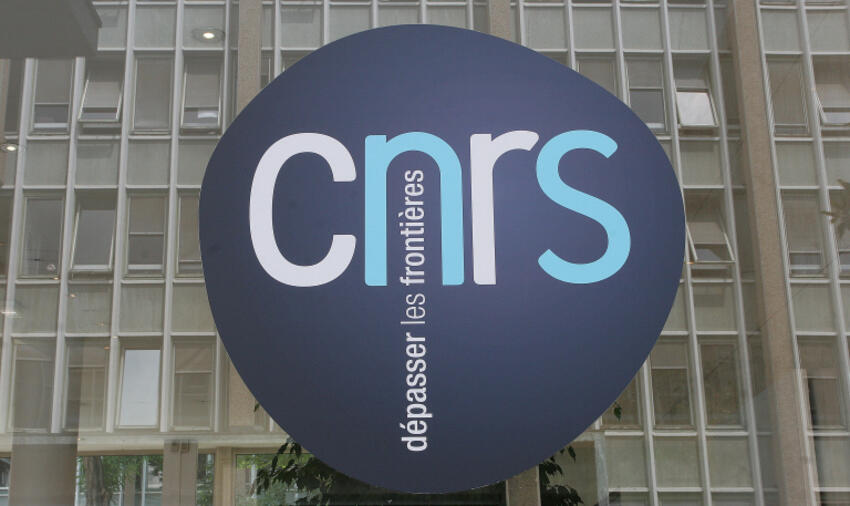
 Image Nicole Tiget, CNRS Images
Image Nicole Tiget, CNRS Images
Les candidats et candidates au concours de Chargé·e de recherche 2023 du CNRS peuvent bénéficier du soutien actif du CRIS (anciennement OSC), UMR 7049.
Le Centre de Recherche sur les Inégalités Sociales (CRIS) est rattaché au CNRS (sections 36 et 40) et à Sciences Po. Il accueille des chercheurs issus de plusieurs disciplines souhaitant développer une recherche de pointe sur la stratification et les inégalités sociales.
Les travaux menés au CRIS couvrent une diversité de domaines (genre, origine, milieu social, éducation, ségrégation urbaine, politiques sociales, mobilités et migrations, pratiques culturelles, usages du numériques) et utilisent plusieurs types de méthodologies, y compris expérimentales. Le centre souhaite développer l'étude des inégalités liées à l'environnement et à la santé.
L'internationalisation, la rigueur théorique et méthodologique, le respect de l'autonomie des personnels académiques constituent les piliers de la politique scientifique du CRIS.
Les candidat·e·s intéressés par nous rejoindre sont invité·e·s à prendre rendez-vous avant le 12 novembre avec la directrice de l'unité, Mirna Safi (mirna.safi@sciencespo.fr), avec en copie la Secrétaire générale (marie.ferrazzini@sciencespo.fr) en joignant un CV et un descriptif de leur projet de recherche.
Le Conseil du laboratoire statuera sur les demandes et pourra programmer une présentation orale en séminaire d'équipe.
Left Behind Whom? Economic Status Loss and Populist Radical Right Voting

 Image patpitchaya (via Shutterstock)
Image patpitchaya (via Shutterstock)
CRIS Scientific Seminar 2022-2023
Friday, September 30th 2022, 11:45 am
Sciences Po (1, Place Saint-Thomas-d'Aquin) - Room A201 + Zoom
Left Behind Whom? Economic Status Loss and Populist Radical Right Voting
Giuseppe Ciccolini
PhD Student, European University Institute
Consultant for the OECD, Adjunct Professor at Heinrich Heine University Düsseldorf
 Citizens’ resentment at losing out to the rest of society is commonly thought to be the foundation of the demand for the populist radical right (PRR).
Citizens’ resentment at losing out to the rest of society is commonly thought to be the foundation of the demand for the populist radical right (PRR).
Yet whether PRR voters are objectively disadvantaged remains disputed, which raises doubts regarding the alleged economic basis behind PRR support.
Relying on European Social Survey (ESS) individual-level data from 23 elections across Western Europe, I demonstrate that the PRR polls better among social classes facing economic status loss. To do so, I leverage income data from Eurostat and develop a novel positional measure of income.
This approach allows me to gauge (objective) economic status decline as distinct from worsening financial circumstances. The pre-eminence of the former over the latter as regards PRR voting is further corroborated by evidence on cultural stances and redistributive preferences.
My study confirms the complementarity of cultural- and economic-based explanations of PRR voting and reveals one electoral consequence of rising economic inequalities.
The Education Gospel and the Death of Human Capital Theory

 Image smolaw (via Shutterstock)
Image smolaw (via Shutterstock)
CRIS Scientific Seminar 2022-2023
Friday, September 23th 2022, 11:30 am
Sciences Po (1, Place Saint-Thomas-d'Aquin), room K011
The Education Gospel and the Death of Human Capital Theory
Hugh Lauder
Professor, University of Bath
 There has been a widely held view that education is central to the development of individual and national prosperity because the 4th Industrial Revolution has heralded the dawn of a knowledge economy. For policy makers the attraction is that the knowledge economy has a near infinite demand for highly educated workers which has led to the development of mass higher education. In turn, it offers the promise of economic efficiency allied to social justice since all those with the ability and motivation to succeed in education can ascend the credential ladder to gain well paid rewarding jobs. This dominant policy view is known as the Education Gospel.
There has been a widely held view that education is central to the development of individual and national prosperity because the 4th Industrial Revolution has heralded the dawn of a knowledge economy. For policy makers the attraction is that the knowledge economy has a near infinite demand for highly educated workers which has led to the development of mass higher education. In turn, it offers the promise of economic efficiency allied to social justice since all those with the ability and motivation to succeed in education can ascend the credential ladder to gain well paid rewarding jobs. This dominant policy view is known as the Education Gospel.
This Gospel is justified by Human Capital Theory, the orthodox economic bridge between education and the labour market and was identified by Michel Foucault as providing the key tenets of neo-Liberalism. The problem is that this theory is flawed theoretically and empirically, while turning education into the servant of the economy: the result is that it offers students a false prospectus, learning no longer equals earning. A data analysis is provided on graduate returns in the labour market over a forty year period since the inception of the 4th Industrial Revolution. These data do not support human capital theory and hence the Education Gospel.
We, therefore, need to reconsider the role of education and the contribution that graduates can make to society.
Is there a "white upper class" privilege in educational achievement in France?

 Image Chumakov Oleg (via Shutterstock)
Image Chumakov Oleg (via Shutterstock)
CRIS Scientific Seminar 2022-2023
Friday, September 16th 2022, 11:30 am
Sciences Po (1, Place Saint-Thomas-d'Aquin), room K008
Is there a "white upper class" privilege in educational achievement in France?
Insights from an intersectional empirical design
Philippe Coulangeon
Directeur de recherche CNRS, Sciences Po - CRIS
 This presentation applies the intersectional analytical framework to the analysis of the impact of class, gender, and origin on educational outcomes in contemporary France, relying on data from the 2007 panel of the Ministry of national education matched with those of the first waves of the ongoing EVA (Entrée dans la vie active) survey of the INSEE. This longitudinal data set tracks the educational trajectories of young French people from the time they enter junior high school (classe de 6ème), around age 11, until age 25.
This presentation applies the intersectional analytical framework to the analysis of the impact of class, gender, and origin on educational outcomes in contemporary France, relying on data from the 2007 panel of the Ministry of national education matched with those of the first waves of the ongoing EVA (Entrée dans la vie active) survey of the INSEE. This longitudinal data set tracks the educational trajectories of young French people from the time they enter junior high school (classe de 6ème), around age 11, until age 25.
The intersectional approach of the intertwining effect of these variables is operationalized through the Multilevel Analysis of Individual Heterogeneity and Discriminatory Accuracy (MAIHDA) originally developed in social epidemiology (Merlo, 2018, Evans et al., 2018; Green, et al., 2017). This approach relies on the definition of strata based on the intersection of four variables: gender, class, origin, and cognitive abilities measured at 11. It differs from the usual approach by the interaction terms between these variables in that it allows the identification of specific combinations in which these effects interact more particularly, even in the presence of limited general interaction effects.
The most salient result relates to French native students of upper-class origin with low cognitive level at age 11 who, even when controlled for the additive effects of these characteristics, display a higher probability to reach an upper tertiary diploma than non-native students from lower social background but higher cognitive abilities measured at 11. On the other hand, non-native students from lower social backgrounds and low-cognitive abilities do not experience a specific “intersectional” penalty. This result suggests a kind of “white upper-class privilege” that may be partially interpreted in terms of compensatory advantage (Bernardi, 2014; Bernardi and Triventi, 2020).
Sociologie de l'école
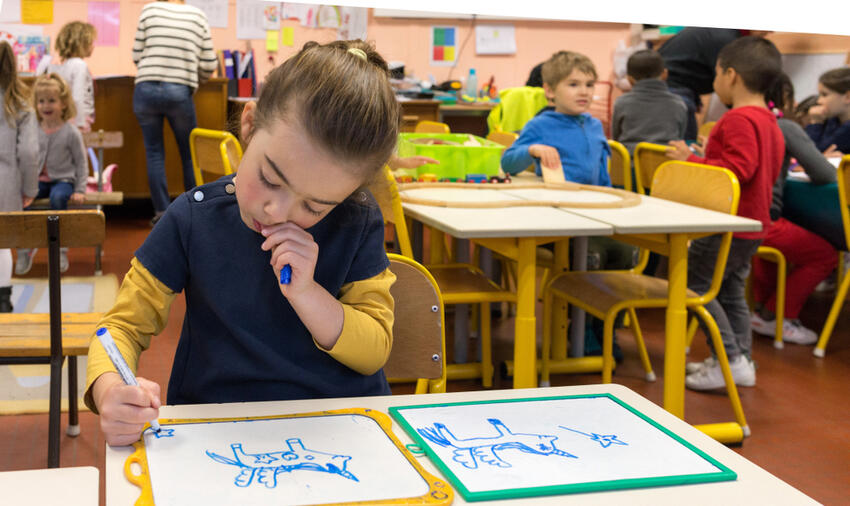
 Image Elena Chevalier (via Shutterstock)
Image Elena Chevalier (via Shutterstock)
Sociologie de l'école, publié par les éditions Armand Colin / Dunod, collection U sociologie. 384 pages, EAN 9782200630577.
Après la publication de l'édition originale en 1992, Marie Duru Bellat et Agnès van Zanten ne s'imaginaient peut-être pas qu'elles allaient devoir actualiser et compléter cet ouvrage à de nombreuses reprises : 1999 (2ème ed.), 2006 (3ème), 2012 (4ème), 2018 (5ème) et enfin 2022 pour la sixième édition, rédigée avec Géraldine Farges. Au fil du temps, les retirages intermédiaires ou l'inscription dans la bibliographie officielle des concours de recrutement des Conseillers Principaux d'Education ont confirmé son statut d'ouvrage de référence pour les acteurs du monde éducatif.
Même si la structure a été conservée, au fil du temps, le volume a pris de l'ampleur, la bibliographie notamment a intégré les dernières références internationales tout en prenant soin de ne pas effacer les ouvrages et articles considérés comme fondateurs.
Le vaste champ de la sociologie de l'éducation est ici abordé dans ses multiples dimensions, enjeux et acteurs impliqués. Les auteures traitent de sujets aussi variés et complémentaires que les politiques scolaires, les idéaux autour de l'école et de la réussite, les conditions de mise en place des programmes, le métier et la carrière des enseignants, l'insertion des établissement dans un milieu local, l'évolution de la pédagogie, la ségrégation scolaire subie par les élèves, l'excellence ou les choix et pratiques des parents. Une partie plus épistémologique aborde l'évolution des recherches dans le domaine.
Inequalities, intersectionality and vulnerability to climate change impacts

 Navarra, June 2022 - Image JMGarcestock via Shutterstock
Navarra, June 2022 - Image JMGarcestock via Shutterstock
OSC Scientific Seminar 2022-2023
Friday, September 9th 2022, 11:30 am
Sciences Po (1, Place Saint-Thomas-d'Aquin), room K011
Inequalities, intersectionality and vulnerability to climate change impacts
Samuel Rufat
Maître de conférence - CY Cergy Paris University & Institut Universitaire de France
 Social vulnerability is a measure of the sensitivity of a population to climate change impacts and its ability to respond to and recover from the impacts of environmental hazards. It is considered to mirror the geographies of inequality. As public agencies are increasingly seeking tools to understand inequity in exposure and decide distribution of prevention funds, aggregated indicators of vulnerability are being considered as equity measures. However, such indices rely on single-axis frameworks with the underlying assumptions that a deficit in one dimension of vulnerability can be offset (or compensated) by a surplus in another. More recently, the intersectionality perspective has been gaining traction to offer a more nuanced mapping of vulnerability and thereby overcome binary categorizations of vulnerable groups.
Social vulnerability is a measure of the sensitivity of a population to climate change impacts and its ability to respond to and recover from the impacts of environmental hazards. It is considered to mirror the geographies of inequality. As public agencies are increasingly seeking tools to understand inequity in exposure and decide distribution of prevention funds, aggregated indicators of vulnerability are being considered as equity measures. However, such indices rely on single-axis frameworks with the underlying assumptions that a deficit in one dimension of vulnerability can be offset (or compensated) by a surplus in another. More recently, the intersectionality perspective has been gaining traction to offer a more nuanced mapping of vulnerability and thereby overcome binary categorizations of vulnerable groups.
Registration is mandatory. Thanks!
Homepage (CY Université)
A systematic review and meta-analysis of the impact of the COVID-19 pandemic on learning
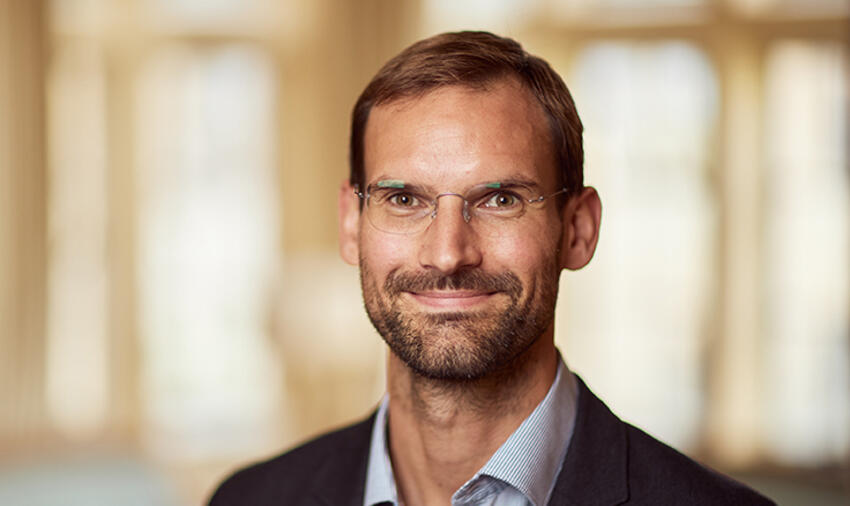
 Bastian Betthäuser (Sciences Po - CRIS)
Bastian Betthäuser (Sciences Po - CRIS)
A systematic review and meta-analysis of the impact of the COVID-19 pandemic on learning
Bastian Betthäuser (Assistant Professor of Sociology, Sciences Po - CRIS)
FacSem, Monday 15th September, 12:30 - 2 pm
Discussant: Clément de Chaisemartin (Professor, Sciences Po - Department of Economics)
Venue: Sciences Po, 1 place Saint-Thomas-d'Aquin, room K011
How has the COVID-19 pandemic affected learning progress among school-age children? A growing number of studies address this question, but findings vary depending on context. We conduct a pre-registered systematic review, quality appraisal and meta-analysis of 42 studies across 15 countries to assess the magnitude of the effect of the pandemic on learning. We find a substantial overall learning deficit (Cohen’s d = -0.14, 95% c.i. -0.17, -0.10), which arose early in the pandemic and persists over time. Forgone learning is particularly large among children from low socio-economic backgrounds. It is also larger in math than in reading, and in middle-income countries, relative to high-income countries. There is a lack of evidence on learning progress during the pandemic in low-income countries. Future research should address this evidence gap and avoid the common risks of bias that we identify. The full paper can be accessed here
Registration: marina.abelskaiagraziani@sciencespo.fr (intern audience)
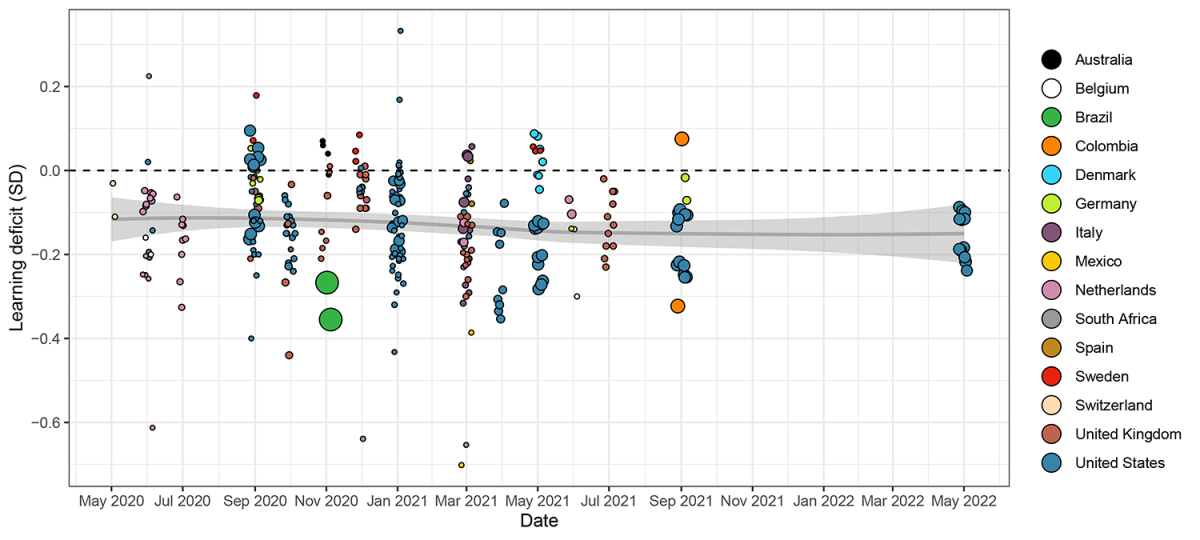
Bringing underprivileged middle-school students to the opera

 Palais Garnier - Image STLJB via Shutterstock
Palais Garnier - Image STLJB via Shutterstock
Bringing underprivileged middle-school students to the opera: cultural mobility or cultural compliance?
Philippe Coulangeon & Denis Fougère
British Journal of Sociology of Education
First published: 12 August 2022 - https://doi.org/10.1080/01425692.2022.2109593
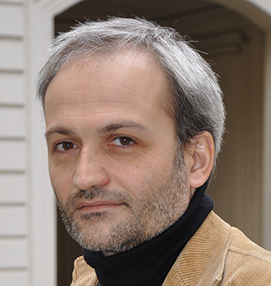
 This article assesses the impact of a two-year long project-based learning program conducted by the National Opera of Paris in a large number of middle schools located in underprivileged areas, aiming at preventing school dropout and tackling educational inequalities by providing disadvantaged students with the opportunity to discover the world of opera. This program is not exclusively concerned with democratizing access to the opera. Rather, it focuses on improving students’ self-confidence, motivation and school involvement.
This article assesses the impact of a two-year long project-based learning program conducted by the National Opera of Paris in a large number of middle schools located in underprivileged areas, aiming at preventing school dropout and tackling educational inequalities by providing disadvantaged students with the opportunity to discover the world of opera. This program is not exclusively concerned with democratizing access to the opera. Rather, it focuses on improving students’ self-confidence, motivation and school involvement.
Taking a counterfactual statistical approach (propensity score matching), we measure the impact of participation in the program on final exam and continuous assessment grades.
The analysis displays mixed results: a significant and positive impact for the students who participate in the program for its whole duration (two years), at least for continuous assessment scores, but a negative impact for those who leave the program after only one year.
The contrast between the effects of full and partial participation in the program suggests that these may be primarily due to a selection effect in favor of the most culturally and socially compliant students, in line with Bourdieu’s and Passeron’s reproduction theory rather than a mobility effect resulting from the transfer of cultural capital to disadvantaged students.
Failure at school has often been attributed to the cultural gap that may exist between the resources students inherit from their families and school culture. In this paper, we focus on two strategies aimed at reducing this cultural gap: arts and culture education, and project-based learning. Arts education includes all didactic action directed towards the dissemination of artistic and cultural knowledge. Project-based learning refers to a didactic approach based on interdisciplinary and collaborative educational activities. Advocates of this approach assume that it has a propensity to reduce the distance between students with working-class backgrounds and the school environment, as it involves real, practical objects. Project-based learning may interact with arts education to the extent that this pedagogical orientation often entails the production of artifacts such as creative writing, visual art, drawings, videos, photography, and on-stage performances.
In order to assess the impact of the National Opera of Paris' program on participating students’ educational achievements, we interpret the underlying mechanism of this impact in relation with the cultural capital theory. We show that the socially redistributive impact of the program is questionable depending on whether the program help students from disadvantaged background to compensate for their lack of cultural resources or favor their ability to conform to the middle-class cultural norms and repertoires.
We start this paper by linking the issues raised by the evaluation of the impact of this program with the broader question of the role of cultural capital in educational inequalities. Second, we review the existing literature on arts education and project-based learning. We then describe in more detail the program implemented at the National Opera of Paris since 1991. We finally present our data, our methods, our hypotheses and our results, followed by a discussion on their implications and significance.
Job Talks - Professor recruitment 2022
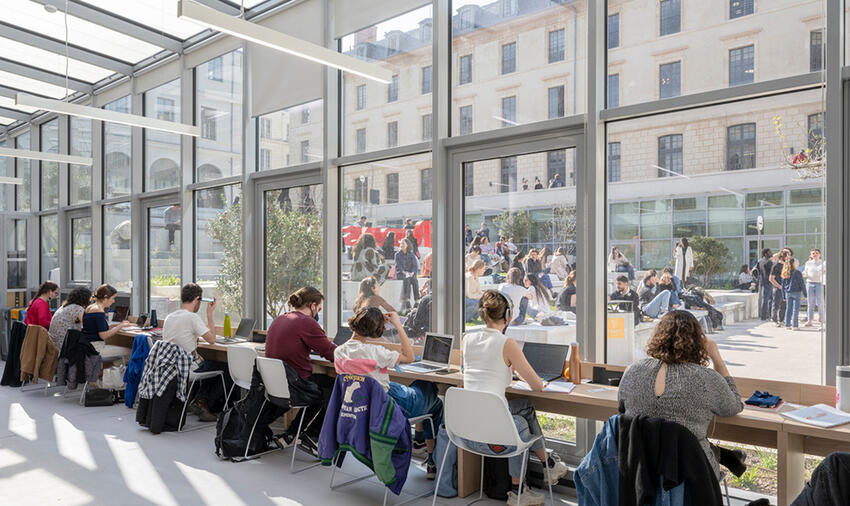
 Image Martin Argyroglo / Sciences Po
Image Martin Argyroglo / Sciences Po
These job talks follow the Associate / Full Professor position published in June 2022.
Venue: Sciences Po, 13 rue de l'Université, 75007 Paris, Room "Salle du conseil"
Date: Monday, August 29th 2022
Schedule:
-
10:00 am - Lucas Chancel, Associate researcher at Paris School of Economics (PSE) and IDDRI. Co-Director of the World Inequality Lab (PSE).
Political economy of energy transitions
The time is shared between presentation (career path, scientific project, 40 min.) and Q&A (20 min.).
The French social space of material consumption between 1985 and 2017

 Image Maxx-Studio (via Shutterstock)
Image Maxx-Studio (via Shutterstock)
The more it changes the more it stays the same: The French social space of material consumption between 1985 and 2017
 Maël Ginsburger
Maël Ginsburger
The British Journal of Sociology, First published: 19 July 2022 - Open Access paper
(https://doi.org/10.1111/1468-4446.12970)
The alleged homogenization of material consumption patterns in Western societies in the end of the twentieth century has been a central argument of scholars who predicted a general flattening of class inequalities. However, divisions in material consumption practices and their evolution have largely been neglected in studies of the social stratification of lifestyles.
Drawing on six waves of the French Households Budget Surveys (INSEE) from 1985 to 2017 and Geometric Data Analysis, this article shows that the two main structuring oppositions in the French space of material consumption remained unchanged over 32 years.
A total of 28 categorical variables were computed, referring to consumption practices, habits and material possessions in five different areas: food consumption and supply; electric and electronic devices; home energy consumption; clothing; and transportation.
Two divides are strongly but not exclusively associated with social class.
- The first persistently opposes integration with and exclusion from mass consumption.
- The second opposes connected and autonomous consumption styles.
However, between 1989 and 2011, the practices associated with these divides have changed and households have experienced a major shift in their position toward the most integrated and connected poles.
The divide between connected and autonomous consumption styles reflects a strong opposition in terms of professions (between managers and farmers/industrial workers), but also in terms of cultural capital.
This study paves the way for comparisons to assess the permanence of those two polarities in material consumption—not only across periods, but also in different countries.
L'OSC devient le CRIS !

 Image d'après MJgraphics (via Shutterstock)
Image d'après MJgraphics (via Shutterstock)
L’Observatoire sociologique du changement (OSC), unité mixte de recherche n° 7049 du CNRS et de Sciences Po, devient le Centre de Recherche sur les Inégalités Sociales (CRIS) à partir du 1er juillet 2022.
Cette appellation incarne le projet scientifique du Centre : investir la thématique des inégalités sociales dans leur multidimensionnalité en mobilisant des données et des méthodes variées et des perspectives interdisciplinaires.
Les travaux des membres du CRIS sont ancrés en France et tournés vers les sphères internationales de la recherche en sciences sociales.
Le CRIS est rattaché au Département de sociologie de Sciences Po. Il rassemble une équipe d'une soixantaine de personnes, dont 20 enseignants-chercheurs permanents qui développent une recherche de pointe sur la stratification et les inégalités sociales.
Son programme de recherche poursuit 3 objectifs :
- Mesurer et comparer l’évolution des inégalités sociales en France et dans les sociétés contemporaines
- Analyser les mécanismes des inégalités sociales à plusieurs niveaux
- Contribuer à l’analyse des politiques publiques.
Les travaux des membres du CRIS portent sur les inégalités socioéconomiques, éducatives, culturelles, urbaines, environnementales, numériques liées au genre, à l’origine sociale ou géographique, à l’orientation sexuelle, à l’état de santé, qui se développent dans la famille et s’accumulent tout au long du cycle de vie.
Les recherches sont également attentives aux politiques publiques dans le domaine des inégalités sociales : elles étudient leur mise en œuvre ainsi que leurs effets.
Le centre développe une approche comparatiste qui s’intéresse aux effets des contextes nationaux, urbains, scolaires, etc.
Téléchargez le communiqué de presse - Download the Press Release
The Observatoire sociologique du changement (OSC), a joint CNRS-Sciences Po research centre #7049 becomes the Centre for Research on social InequalitieS (CRIS) starting from the 1rst of July, 2022.
This name illustrates the Centre's scientific project, which addresses the multidimensional issues of social inequality by mobilising a diversity of data, methods and interdisciplinary perspectives.
The work of CRIS members is rooted in France and oriented towards the international field of social science research.
CRIS is affiliated to Sciences Po Department of Sociology. It includes a team of some 60 people, including 20 permanent researchers who develop cutting-edge research on stratification and social inequalities.
Its research program pursues 3 goals to:
- Measure and compare the evolution of social inequalities in France and in contemporary societies
- Analyze the mechanisms of social inequalities at several levels
- Contribute to the analysis of public policies
The work of CRIS members focuses on socio-economic, educational, cultural, urban, environmental and digital inequalities related to gender, social or geographical origin, sexual orientation and health status, which develop in the family and accumulate throughout the life cycle.
The research also pays attention to public policies in the field of social inequalities and studies their implementation and effects.
The Centre is furthermore developing a comparative approach that looks at the effects of national, urban, education and other contexts.
Job Talks - Full Professor recruitment
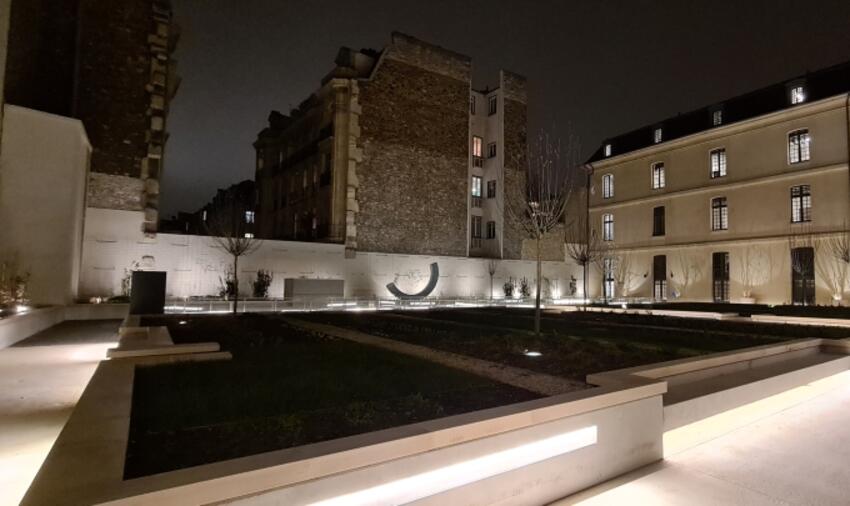
 Campus Saint-Thomas
Campus Saint-Thomas
These job talks follow the Full Professor position published in March 2022 (Professeur des Universités).
Venue: Sciences Po, 1 place Saint-Thomas-d'Aquin, 75007 Paris, Room B-103.
Date: Tuesday, July 12th 2022
Schedule:
-
10:00 am - Lidia Panico, Chargée de recherche, INED
How birth health matters for subsquent child inequalities - 11:15 am - Merlin Schaeffer, Associate Professor, University of Copenhagen
Do Right-Wing Governors Promote Informal Healthcare Chauvinism? Ethnic Discrimination in Access to Basic Healthcare in Italy
The time is shared between presentation (40 min.) and Q&A (20 min.).
We Are Not Omnivores, or, how our culture became more open, but remained unequal

 Image Luboslav Tiles (via Shutterstock)
Image Luboslav Tiles (via Shutterstock)
OSC Scientific Seminar 2021-2022
Friday, June 24th 2022, 11:00 am
Sciences Po (1, Place Saint-Thomas-d'Aquin), room K008
We Are Not Omnivores, or,
how our culture became more open, but remained unequal
Jennifer C. Lena
Associate Professor of Arts
Department of Sociology
Columbia University in the City of New York
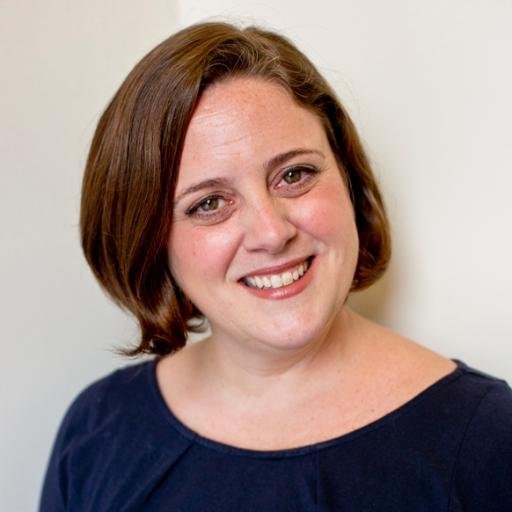 Drawing from Richard A. Peterson’s signature work on taste, hundreds of studies have reported that elites' cultural tastes have broadened such that they are best categorized as “omnivores.” Most of the research in this tradition to date has sought to replicate the primary finding (in different times, places, with different populations) while little attention was paid to the mechanisms in play.
Drawing from Richard A. Peterson’s signature work on taste, hundreds of studies have reported that elites' cultural tastes have broadened such that they are best categorized as “omnivores.” Most of the research in this tradition to date has sought to replicate the primary finding (in different times, places, with different populations) while little attention was paid to the mechanisms in play.
Using a single case study (The Museum of Primitive Art) as a prism, I argue that the most likely explanation for the original omnivorousness finding is a simultaneous diversification of “benchmark” arts collections and programs to include more kinds of culture (via the process of “artistic legitimation”), and a push on the part of vernacular culture advocates to have some works and creators appreciated as art. That is, the diversification of elite tastes is likely a result of both the artistic legitimation of vernacular work and a “lowering” of highbrow tastes to include vernacular culture.
In this study, I present a “production of culture” style explanation for purportedly high levels of omnivorous tastes among American elites, and explore the robustness of Shyon Baumann’s theory of the artistic legitimation process, as applied to 16 fields of creative production.
Position Vacancy: Associate / Full Professor

 Image d'après Fah061043 (via Shutterstock)
Image d'après Fah061043 (via Shutterstock)
Sciences Po is recruiting an Associate / Full Professor at the OSC - Observatoire Sociologique du Changement. Position starting on October 1st, 2022.
This professorship position is designed to reinforce and complement our expertise in the study of environmental inequality. We welcome applications from candidates with an excellent publication record in leading social science journals capable of stimulating new expertise on environmental inequality within Sciences Po.
We particularly value candidates with an ambitious research agenda on global economic and environmental inequality using large-scale worldwide data.
This position is for a senior scholar (Rang A) and only candidates with an Habilitation or with a current position at least equivalent to associate professor are eligible.
The successful candidate will fully become a member of the Observatoire sociologique du changement. He.She is expected to play an active role in OSC’s collective activity: seminars, academic events, participation in research networks. He.She should also engage in responding to national and international calls to fund research projects. He.She is also supposed to supervise master and PhD students. The selected candidate will also be welcome to participate to AIRE, the Sciences Po Interdisciplinary Research Program on the Environment.
The successful candidate will teach a class on environmental approaches in the social sciences (undergraduate level) and may also teach on global and environmental inequality (graduate level).
Teaching load: 3 courses with 24 contact hours each per year, 56 hours per year of other academic duties.
Applications are due by [Extended deadline] July 10th.
Submissions must include:
● CV with a list of publications
● Motivation letter
● Research Statement (2 pages)
● Short Teaching statement (1 page)
● 2 significant publications chosen by the candidate
● The name of two academic referees
Please read the full Job description and the complete requirements (pdf, 172 ko).
Contact: Carlo Barone carlo.barone@sciencespo.fr, Chair of the recruitment committee
or Administrative contact Marie Ferrazzini marie.ferrazzini@sciencespo.fr, Secrétaire générale de l’OSC.
Discrimination partly explains why Blacks are more depressed than average in Europe

 Image fizkes (via Shutterstock)
Image fizkes (via Shutterstock)
OSC Scientific Seminar 2021-2022
Friday 17th June 2022, 11:30 am
Sciences Po (1, Place Saint-Thomas-d'Aquin), room K011
Discrimination partly explains why
Blacks are more depressed than average in Europe
Martin Aranguren
Associate Scientist, CNRS, Sciences Po - OSC
While studies on the association between perceived discrimination and adverse mental health outcomes abound, those that investigate the role of discrimination in the production of mental health disparities are rare.
My work contributes to the latter field by examining whether discrimination creates disparities in depressive symptoms between Asians or Blacks in Europe. Using the social stress model as a theoretical guide, the empirical strategy consists in combining cross-sectional epidemiological data from the representative European Social Survey (sample size 37,406) with evidence from a large-scale field experiment (sample size 4,555).
A mediation analysis performed on the ESS data confirms that European Blacks, but not clearly Asians, report more symptoms of depression than the reference group, and that this excess in depression is mediated by perceived discrimination. Similarly, the field experiment corroborates that Blacks, and less univocally so Asians, are discriminated against in everyday interactions. Together, the two studies concur to support the social stress hypothesis that Blacks’ surplus in depression symptoms results from greater exposure to discrimination.
Registration is mandatory. Thanks!
From Diversity to Mixing? Socioeconomic Homophily in French Desegregated Middle Schools

 Image BearFotos (via Shutterstock)
Image BearFotos (via Shutterstock)
OSC Scientific Seminar 2021-2022
Friday 10th June 2022, 11:30 am
OSC meeting room (1, Place Saint-Thomas)
From Diversity to Mixing?
Socioeconomic Homophily in French Desegregated Middle Schools
Timothée Chabot
PhD European University Institute, Post-doc INED (ELVIS Project)
À quel point l’origine sociale des élèves de collège structure-t-elle leurs relations les uns avec les autres ? Pour répondre à cette question, une cohorte d’environ 800 collégien·nes français·es a été suivie pendant trois ans, dans quatre établissements socialement mixtes. L’analyse de leurs réseaux de relations, notamment via les méthodes de la statistique de réseaux, permet de mieux comprendre les causes de l’homophilie sociale entre élèves, c’est-à-dire de la tendance à la ségrégation sociale des amitiés.
Socioeconomic mixing at school is often considered to be a desirable objective, as it would reduce academic inequalities and help pacify inter-group relations.
Does spatial diversity imply relational mixing, or do students keep interacting with socioeconomically similar peers even in formally desegregated contexts? This raises the question of homophily, the principle by which relationships occur at a higher rate among similar individuals.
I study socioeconomic homophily among a cohort of 800 middle school students in four schools in France, followed during three years.
Based on the statistical analysis of students’ friendship networks and on qualitative interviews, I examine the magnitude of this homophily, and try to disentangle the relational processes through which it emerges.
Registration is mandatory. Thanks!
Suspect Citizenship

 Image Elena Dijour (via Shutterstock)
Image Elena Dijour (via Shutterstock)
OSC Scientific Seminar 2021-2022
Friday 3rd June 2022, 9:30 am
Online, via Zoom
Suspect Citizenship
Jean Beaman
Associate Professor of Sociology in the University of California, Santa Barbara
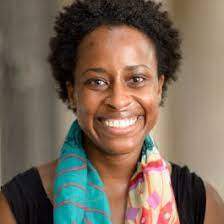 Incidents of state violence and activism against that violence illustrate the continuing significance of race and the persistence of white supremacy in France, the United States, and worldwide.
Incidents of state violence and activism against that violence illustrate the continuing significance of race and the persistence of white supremacy in France, the United States, and worldwide.
Based on past and current ethnographic research and interviews with ethnic minorities in the Parisian metropolitan region, this talk argues that, despite France’s colorblind and Republican ethos, France’s “visible minorities” function under a “suspect citizenship” in which their full societal belonging is never granted.
I focus on the growing problem of state-sponsored violence against ethnic minorities which reveals how France is creating a “bright boundary” between whites and non-whites, furthering disparate outcomes based on race and ethnic origin.
By considering the multifaceted dimensions of citizenship and belonging in France, I demonstrate the limitations of full societal inclusion for France’s non-white denizens and how French Republicanism continues to mark, rather than erase, racial and ethnic distinctions.
Registration is mandatory. Thanks! (Zoom users: the link for the videoconference will be sent one day before)
To find out more: Jean Beaman homepage
Last papers:
- with Jennifer Fredette, “The US/France Contrast Frame and Black Lives Matter in France”, Perspectives on Politics [Forthcoming]
- “Racial Gaslighting in a Non-Racial France”, Contemporary French & Francophone Studies/SITES [Forthcoming]
- “Towards a Reading of Black Lives Matter in Europe”, Journal of Common Market Studies Annual Review, 59: 103-114, 2021
- “France’s Ahmeds and Muslim Others: The Entanglement of Racism and Islamophobia”, French Cultural Studies, 32(3): 269-279, 2021
Who took care of what?

 Image SB Arts Media (via Shutterstock)
Image SB Arts Media (via Shutterstock)
Who took care of what?
The gender division of unpaid work during the first year of the COVID-19 pandemic in France
Marta Pasqualini, Marta Dominguez-Folgueras, Emanuele Ferragina
Olivier Godechot, Ettore Recchi, Mirna Safi
Demographic Research, vol. 46, art. 34, p. 1007-1036
24 May 2022, doi 10.4054/DemRes.2022.46.34
This paper is available in open access
France was one of the first countries implementing lockdown measures to mitigate the spread of COVID-19. Since families spent more time at home, household and care workloads increased significantly. However, existing findings are mixed in terms of whether this situation contributed to a more gender-egalitarian division of unpaid work.
This paper explores the division of domestic work within couples across two different COVID-19 lockdowns and compares them to the out-of-lockdown period in France. We use the theoretical lenses of time availability, relative resources, and ‘doing gender’ to make sense of these changes.
The longitudinal analyses rely on an original panel study we collected in France between April 2020 and April 2021.We employ the different types of restrictions to mobility and social life imposed during the first year of the pandemic as a contextual background, within which we measure the main drivers of change in the division of unpaid work within couples. We use individual fixed effect regression models to estimate changes in men’s share of unpaid work by time, changes in work conditions, partners’ educational gaps, and types of domestic tasks.
Another data and analysis are available within the CoCo Project (Coping with Covid-19: Social distancing, cohesion and inequality in 2020 France) - Data produced by the CDSP via the ELIPSS Panel (8 waves) are described in the Sciences Po data repository: https://data.sciencespo.fr/dataverse/elipss
An Unequal Digital World?

 Image Videoflow (via Shutterstock)
Image Videoflow (via Shutterstock)
72nd Annual International Communication Association Conference - Paris
Media Sociology Hybrid Post-Conference
An Unequal Digital World?
Critical Perspectives on Media Sociology as Transdisciplinary Global Network
Date: Wednesday, June 1: 9:00 am - 5:30 pm
Venue (in-person sessions): Observatoire sociologique du changement, Sciences Po Paris, 1 Place St Thomas d'Aquin.
Join sociologists and media scholars around the world who are convening in Paris for the ICA for this focused one-day post-conference. Contributing to ICA’s theme “One World, One Network”, the post-conference provides a global tent for the field of media sociology at the intersection of communication, media, technology, inequalities, politics, and social change.
The event’s featured speakers are Antonio Casilli and Paola Tubaro whose talks are respectively entitled "Who bears the burden of a pandemic? COVID-19 and the transfer of risk to digital platform workers" and "Digital Venezuela: Global inequalities, economic crisis and local networks behind the online economy”.
Panels: Current Issues in Media Sociology - Digital Politics - Digital Divides - Cultural Production - Digital Production - Inequalities
The day’s agenda features a variety of speakers and paper presentations with both in-person and online formats. For more information, contact jen.schradie@sciencespo.fr.
Committee and Organizers
Grant Blank, Antonio Casilli, Wenhong Chen, Massimo Ragnedda, Laura Robinson, Jen Schradie, Jeremy Schulz, Juliana Trammel, Paola Tubaro, and Julie Wiest.
Conference Partnerships
ICA Division Affiliates: Global Communication and Social Change and Computational Methods Divisions
Institutional Host: Jen Schradie, Observatoire sociologique du changement, Sciences Po Paris
Publication Sponsors: Palgrave Studies in Digital Inequalities & Emerald Studies in Media and Communications
Institutional Sponsors: Observatoire sociologique du changement, Sciences Po Paris, Department of Sociology at Santa Clara University, and the Center for Entertainment and Media Industries at the University of Texas at Austin
https://www.icahdq.org/page/ICA2022
The Subjective Cost of Young Children: A European Comparison
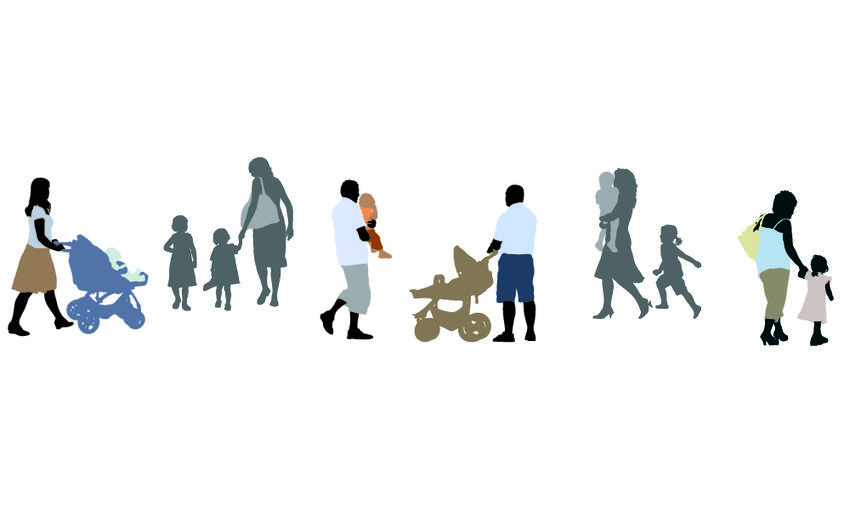
 Illustration from Boguslaw Mazur (via Shutterstock)
Illustration from Boguslaw Mazur (via Shutterstock)
The Subjective Cost of Young Children: A European Comparison
Sonja Spitzer, Angela Greulich, Bernhard Hammer
Social Indicators Research, First Published 15 May 2022
Paper in open access via Springer Link - https://doi.org/10.1007/s11205-022-02942-5
The researchers have investigated how the birth of a child affects the objective and subjective economic situation of young parents in Europe. They mobilize longitudinal data from the European Union’s Statistics of Income and Living Conditions, covering the time period 2004 to 2019 for 30 European countries.
Does the work and income situation for young parents differ between European countries?
They study the career break: is it and to what extend primarily reserved for mothers?
Is it the case in every European country that parental leave massively harms women in their working life, while fathers have no losses?
Results show that newborns decrease subjective economic well-being in all regions, yet with economies of scale for the number of children. The substantial labour income losses of mothers explain only a small part of subjective child costs. The initial drop in subjective economic well-being observed shortly after childbirth is caused by increased expenses due to the birth of a child and other drivers such as stress.
The study finds that everywhere in Europe, mothers take longer breaks from work than fathers – particularly in the German-speaking countries.
The authors observe that despite a decline in labor market income for mothers after childbirth, the household income of many couples remains relatively constant across all regions in the short term. This is, firstly, because – on average – a lot is offset by public subsidies, such as lump-sum benefits and leave payments. Secondly, the labor incomes of many fathers are observed to increase slightly after the birth of a child in many European countries regions.

Job talks

 Illustration Sandrine Gaudin / Sciences Po
Illustration Sandrine Gaudin / Sciences Po
These job talks follow the Assistant Professor position published in March 2022.
Schedule:
-
Monday 23 May 2022 – Room CS 16 - 1, Place Saint-Thomas d’Aquin 75007 Paris
08:45 - Welcome Coffee
09:15 - 10:00 Magda BOUTROS, Assistant Professor, University of Washington
Policing "undesirables"
10:10 - 10:55 Margot DAZEY, Post-doctoral researcher, Institute for Advanced Study in Toulouse
Muslim uplift in France: Excellence and good manners in the face of stigma
10:55 - Coffee break
11:15 - 12:00 Gaja MAESTRI, Lecturer in Sociology and Policy, Aston University
Between Charity and Protest. Meanings, dilemmas, and transformations of migrant solidarity in France and the UK
12:10 - 12:55 Filippo ONCINI, Marie Curie Fellow, University of Manchester
It’s the noise of the snacks!: School meals on the fringes and frail food pedagogies
-
Tuesday May 24 2022 – Room CS 16 - 1, Place Saint-Thomas d’Aquin 75007 Paris
08:45 - Welcome Coffee
09:15 - 10:00 Selin SIVIS, Post-doctoral Researcher, University of Vienna
Who is (un)deserving? Differential healthcare access and the interplay between social and symbolic boundary-drawing towards Syrian Refugees in Turkey
10:30 - Coffee break
10:50 - 11:35 Siqi TU, Post-doctoral Fellow, New York University, Shanghai (via Zoom)
Fragile Cosmopolitanism: Global Imaginaries in the Making of Chinese “Parachute Students” in the United States
Do Audit Experiments Reflect Applicant Behavior?

 Image create jobs 51 (via Shutterstock)
Image create jobs 51 (via Shutterstock)
LIEPP' Discriminations and category-based policies and OSC are glad to invite you to the seminar:
Do Audit Experiments Reflect Applicant Behavior? Cautions for Calculations of Probabilities of Success
May 20th, 11:30 am - 1:00 pm
Location: Room K008, 1 place Saint Thomas d'Aquin, Paris
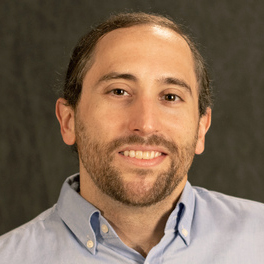 Speaker: Mike Vuolo, PhD, is an Associate Professor in the Department of Sociology at The Ohio State University and Editor-in-Chief of Sociological Methodology, the official methods journal of the American Sociological Association. His research interests include law, crime, and deviance; health; employment; substance use; the life course; and statistics and methodology.
Speaker: Mike Vuolo, PhD, is an Associate Professor in the Department of Sociology at The Ohio State University and Editor-in-Chief of Sociological Methodology, the official methods journal of the American Sociological Association. His research interests include law, crime, and deviance; health; employment; substance use; the life course; and statistics and methodology.
Abstract: Audit and correspondence studies have flourished in sociology and related disciplines. By sending actual applications that differ only by particular treatments, this method allows researchers to tap into discrimination by decision-makers such as employers, landlords, and schools that surveys and qualitative interviews are unlikely to reveal, with the strong internal validity of an experiment. However, the applicant is assumed to apply to all available openings for which they are qualified, and the probability of success represents an estimate at the unit level rather than that of the applicant.
This presentation uses two studies in progress to consider these two assumptions.
First, I present the results of an experiment and qualitative interviews with individuals with criminal records regarding whether they apply for jobs based on inquiries regarding records appearing on job applications. We find that when applications have criminal record questions or warnings of a criminal background check, applicants are less likely to apply for a position and that the reasoning behind such self-selection differs by race and gender. In other words, applicants do not apply to all positions as audits typically assume.
Second, I demonstrate via the binomial distribution that unit-level probabilities do not accurately reflect real world applicant chance of success. For most studies of the labor market, they underrepresent the effects of discrimination and do not consider the degree of choice in jobs that applicants of differing treatments attain. For studies of other units such as housing and schools, the unit-level probabilities that note discrimination are of relatively little consequence for real-world applicants. Both studies necessitate a new focus on applicants within audit experiments, with a consideration of both self-selection into applying and applicant-level probabilities of success.
Individual and Societal Consequences of Widowhood

 Image Superstar (via Shutterstock)
Image Superstar (via Shutterstock)
Sciences Po and the Observatoire Sociologique du Changement (OSC) will be hosting a workshop on the individual and societal consequences of widowhood, especially in light of the Covid-19 pandemic.
Despite spousal loss being one of the most devastating events in the lives of men and women, research on the consequences of bereavement is limited in the social sciences.
This workshop will highlight new findings and perspectives as well as pave the path for new research on how widowhood affects the wellbeing of bereaved spouses.
The workshop will take place in Sciences Po Paris, on June 9, in hybrid format. If you would like to participate in person or online, please complete the following form.
Confirmed participants and contributors:
- Zachary Van Winkle and Angela Greulich (Sciences Po),
- Nicole Kapelle and Jose-Manuel Aburto (University of Oxford),
- Carole Bonnet, Julie Tréguier and Léa Cimelli (INED),
- Aart Jan Riekhoff (Finnish Centre for Pensions),
- Patrick Präg (ENSAE),
- Thomas Leopold (University of Cologne).










This workshop takes place within the remit of the WIDOW19 project funded by the ANR Résilience Covid-19 programme.
The Covid-19 pandemic has left, and continues to leave, numerous men and women prematurely and unexpectedly widowed. Surviving spouses must not only cope with the psychological consequences of bereavement, but also deal with greater economic hardship following partner loss. Especially younger widows and widowers had less time on the labor market to finish financial preparations for old age and discuss post-bereavement financial planning.
The overarching aim of this project is to assess the consequences of increased rates of premature and unexpected widowhood due to the covid-19 pandemic in terms of individual economic wellbeing and societal economic costs.
Project members from six French and European universities and research institutes will collaborate to not only fill several gaps in social scientific knowledge on widowhood, but also provide French and European policy makers with evidence-based policy suggestions to counter and mitigate the individual and societal consequences of widowhood in the short and long-term following the pandemic.
Filière du bac et premier emploi

 Image Reflexpixel (via Shutterstock)
Image Reflexpixel (via Shutterstock)
Filières du baccalauréat et emploi à la fin des études : contribution des parcours scolaires et analyse des écarts entre femmes et hommes
Estelle Herbaut, Carlo Barone et Louis-André Vallet
Economie et Statistique, n° 530-31, 2022, p 65-86.
Cet article est librement consultable en ligne sur le site de l'INSEE. [English version is also available]
Quelles sont les conséquences de la filière suivie au lycée sur l’insertion professionnelle des bacheliers ?
Les auteurs exploitent un panel de 17000 élèves du second degré entrés en sixième en 1995 et une enquête sur le début de la carrière professionnelle, marquant l’entrée dans la vie adulte, menée entre 2005 et 2012. Ils analysent et mettent en lien les caractéristiques sociodémographiques de chaque élève, le choix d'orientation, la performance scolaire, le diplôme obtenu, la date du premier emploi, sa catégorie professionnelle, le salaire...
La méthodologie et la richesse des données permet de prendre en compte la diversité des étudiants dans chaque filière et de suivre des trajectoires, y compris lorsque la scolarité est interrompue.
Les résultats soulignent l’importance de prendre en compte toutes les caractéristiques des élèves avant l’orientation. Il existe une dynamique complexe entre les compétences scolaires et les niveaux de diplômes qui tend à masquer en partie les inégalités professionnelles entre femmes et hommes en début de carrière, tandis que la filière du baccalauréat tend à les expliquer.
La première partie de l'article propose une revue de littérature sur le lien entre filières de baccalauréat et insertion professionnelle, via les mécanismes et choix d'orientation.
Coordinated Markets, School-to-Work Linkages, and Labor Market Outcomes in the European Union

 Image EtiAmmos (via Shutterstock)
Image EtiAmmos (via Shutterstock)
OSC Scientific Seminar 2021-2022
Friday 29th April 2022, 11:30 am
Sciences Po, 1 St-Thomas, Room K008
Coordinated Markets, School-to-Work Linkages,
and Labor Market Outcomes in the European Union
Thomas A. DiPrete
Giddings Professor of Sociology, Columbia University in the City of New York
and Director, Institute of Social and Economic Research and Policy
A large literature in both sociology and political science has theorized about the importance of country differences in skill formation systems for labor market outcomes.
Focusing on twenty-one European countries, my study establishes that countries differ in the strength of the pathways that connect educational credentials to the occupational structure, though there is considerable variability in the country rankings of the strength of individual pathways. Pathway strength matters for the quality of occupational matching, for employment and earnings, and for the earnings gap between well matched and less well-matched workers. In general, the total effects of local linkage strength are to raise earnings and to lower unemployment risk, though positive total effects of local linkage on earnings are concentrated at the lower tertiary and non-tertiary educational levels.
The results suggest that pathway effects are stronger in high-linkage countries for male and for older female workers, and the results also support the hypothesis that local linkage is more protective against unemployment in high linkage countries. However, the local linkage effect is not consistently higher in high-linkage countries when one analyzes the data one educational level at a time. Therefore, the most robust effect of high linkage countries appears to be the fact that – even taking internal heterogeneity into account – their pathways from educational credentials to occupations generally show tighter linkage along with its attendant advantage on labor market outcomes.
To find out more:
See the webpage of Thomas A. DiPrete
Firms and the Intergenerational Transmission of Labor Market Advantage

 Image moomsabuy (via Shutterstock)
Image moomsabuy (via Shutterstock)
LIEPP's Educational Policies research group and OSC are glad to invite you to the seminar:
Firms and the Intergenerational Transmission of Labor Market Advantage
Friday April 15th, 11h30-13h00 (CET)
Location: Room K008, Sciences Po, 1 place Saint Thomas d'Aquin, 75007
Mandatory registration
During this seminar, Per Engzell (Research Fellow in Sociology, postdoctoral Researcher in the Leverhulme Centre for Demographic Science, University of Oxford and visiting professor at LIEPP from March to April 2022) will present his recent paper with Nathan Wilmers (MIT Sloan).
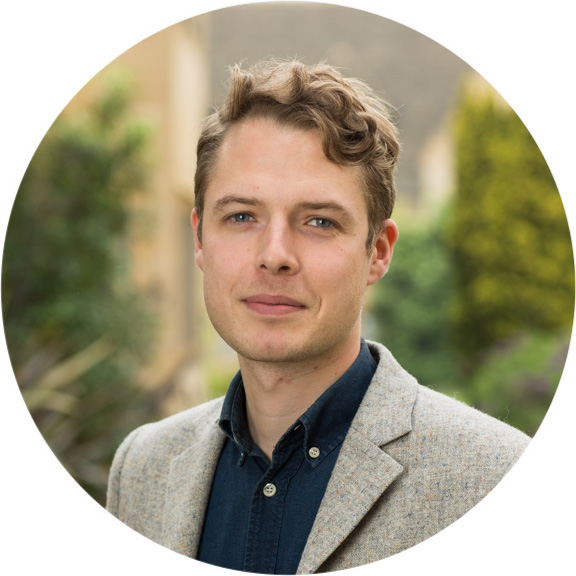 Recent research finds that pay inequality stems both from from pay-setting and from workers’ individual characteristics. Yet, intergenerational mobility research remains focused on transmission of individual traits, and has failed to test how firms shape the inheritance of inequality. We study this question using three decades of Swedish population register data, and decompose the intergenerational earnings correlation into firm pay premiums and stable worker effects. One quarter of the intergenerational earnings correlation at midlife is explained by sorting between firms with unequal pay. Employer or industry inheritance account for a surprisingly small share of this firm-based earnings transmission. Instead, children from high-income backgrounds benefit from matching with high-paying firms irrespective of the sources of parents’ earnings advantage. Our analysis reveals how an imperfectly competitive labor market provides an opening for skill-based rewards in one generation to become class-based advantages in the next.
Recent research finds that pay inequality stems both from from pay-setting and from workers’ individual characteristics. Yet, intergenerational mobility research remains focused on transmission of individual traits, and has failed to test how firms shape the inheritance of inequality. We study this question using three decades of Swedish population register data, and decompose the intergenerational earnings correlation into firm pay premiums and stable worker effects. One quarter of the intergenerational earnings correlation at midlife is explained by sorting between firms with unequal pay. Employer or industry inheritance account for a surprisingly small share of this firm-based earnings transmission. Instead, children from high-income backgrounds benefit from matching with high-paying firms irrespective of the sources of parents’ earnings advantage. Our analysis reveals how an imperfectly competitive labor market provides an opening for skill-based rewards in one generation to become class-based advantages in the next.
To find out more: http://perengzell.com/ - https://osf.io/preprints/socarxiv/mv3e9/ (Paper)
Admission en doctorat, rentrée 2022

 Image Marta Nascimento / Sciences Po
Image Marta Nascimento / Sciences Po
La campagne d'admission en doctorat à l'École de la Recherche de Sciences Po est ouverte jusqu'au 18 mai 2022. Les résultats de l'admission seront communiqués à la mi-juillet 2022.
Le calendrier et les procédures d'admission sont disponibles sur cette page : https://www.sciencespo.fr/ecole-doctorale/fr/content/ladmission-en-these.html
Les candidat·e·s qui demandent un rattachement à l'OSC doivent joindre à leur dossier de candidature :
- Une lettre motivée et signée par un membre de l’OSC habilité à diriger des recherches, indiquant qu'il accepte de diriger votre thèse,
- Une lettre de la directrice de l’OSC indiquant qu'elle accepte votre intégration à l'OSC.
Merci aux candidats d'envoyer avant le 8 mai 2022 à Marie Ferrazzini, secrétaire générale de l'OSC, un CV et une version, même préliminaire, de leur projet de thèse.
Les demandes de soutien seront examinées par le Conseil de laboratoire de l'OSC le 13 mai 2022.
Contact et information : Marie Ferrazzini
A feel for the game? A contribution to the analysis of social stratification through higher education
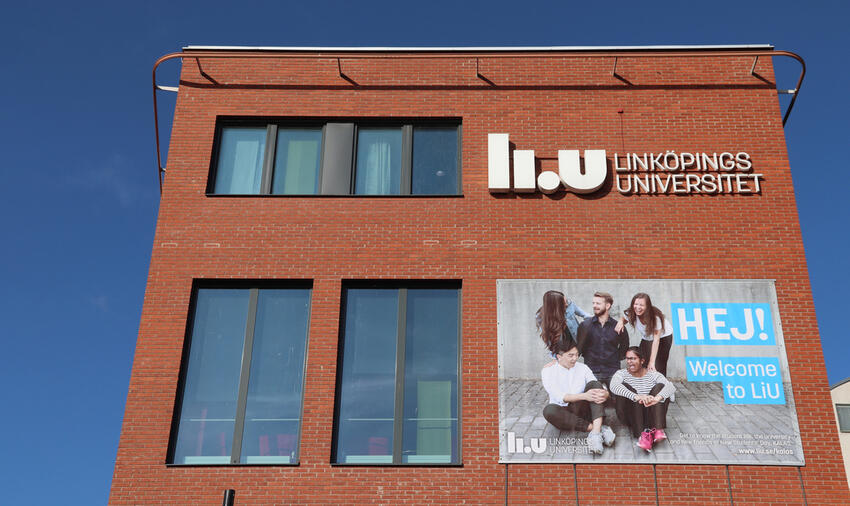
 Image Tupungato (via Shutterstock)
Image Tupungato (via Shutterstock)
OSC Scientific Seminar 2021-2022
Friday 8th April 2022, 11:30 am
Sciences Po, 1 St-Thomas, Room A201 & Online via Zoom
A feel for the game?
A contribution to the analysis of social stratification through higher education
Yann Renisio & Emil Bertilsson
Associate Scientist, CNRS, Sciences Po - OSC & Senior Lecturer, Uppsala University
Higher education plays a major role in the social stratification of contemporary western societies. Studies of this influence, generally compare properties of upper secondary graduates who enter higher education with those who do not enter (binary stratification), or, among those who enter, between short term vs long term programs (vertical stratification) or, among those who enter programs with the same duration, between the fields of these programs (horizontal stratification).
We propose three improvements in this research design, using Swedish register-data. First, we recalculate the actual space of reachable programs for all upper-secondary graduates, meaning that we can predict with very high accuracy which programs a given individual could have, or could have not, entered into if she had applied to them. Second, we construct a continuous characterization of programs based on a synthetic measure of their social outcomes (conjunction of average level of study, median income, and rate of upper-class occupations among accepted students to these programs, 10 years after their entrance).
By doing so, rather than relying only on the level and field of programs, we get a better approximation of the relation between higher education stratification and social stratification.
Finally, we decompose the process of entering a program in higher education as a succession of constrained practices, that is, first, the possibility to enter higher education, second, the practice of applying to higher education given the objective chances of success, third, the fact that these applications are oriented towards at least one reachable program, fourth, the fact of registering to this program once accepted to it, and finally, the relative position of this program in terms of outcomes, compared with all the other reachable programs.
We focus on the respective and cumulative influence of gender and level of education of parents on each of these steps.
Registration is mandatory. Thanks! (Zoom users: the link for the videoconference will be sent one day before)
L'illusion de la démocratie numérique

 Image TY Lim (via Shutterstock)
Image TY Lim (via Shutterstock)
L'illusion de la démocratie numérique. Internet est-il de droite ?
Jen Schradie
Edition française avec introduction originale, de l'ouvrage "The Revolution That Wasn't: How Digital Activism Favors Conservatives", Harvard University Press (2019), Presses polytechniques et universitaires romandes, Lausanne, Collection Quanto, 2022, 468 p.
# La naissance d'internet il y a plus de 25 ans déclenche une sorte de vertige révolutionnaire. Ses plus ardents défenseurs pensent qu'il a le potentiel de refaçonner fondamentalement chaque aspect de la civilisation, en mieux. [...] Personnalisation, participation et pluralisme sont certains de faire advenir la démocratie numérique.
# L'activisme semble accessible, immédiat et ouvert à tous. Un hashtag accrocheur, ou l'actualisation judicieuse d'un statut semblent suffisants pour donner naissance à tout un mouvement. Soudaint, tout un chacun est en mesure de changer le monde.
Si ce discours narratif célébratoire a largement dominé le discours depuis des années, il doit à présent se confronter directement à une vision de plus en plus inquiétante d'internet.
Jen Schradie mène un minutieux travail de terrain en Caroline du nord pour comprendre comment militantisme et numérique - réseaux sociaux plus précisément - se conjuguent au profit de certains groupes structurés porteurs de courants de pensée conservateurs. Elle aborde dans son ouvrage les inégalités selon la classe sociale, les types d'organisation des groupes militants (syndicats d'enseignants, d'étudiants, d'employés du secteur public), les motivations politiques de ces groupes (idéologie de "droite" ou de "gauche"), leurs stratégies d'occupation des réseaux. Le militantisme numérique prend corps dans toutes ses dimensions, le distinguant des mouvements et pratiques observés avant la généralisation du numérique.
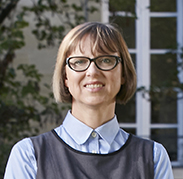 # L'ère de l'utopie numérique semble être sur sa fin. A l'avenir les activistes de tous bords vont tenter de s'emparer du pouvoir d'internet pour promouvoir leur cause. Si la fracture présente dans l'activisme numérique continue à s'élargir, seules les voix de certains privilégiés pourront se faire entendre dans la nouvelle ère à venir. Un tel scénario signerait l'arrêt de mort du rêve technologique comme force de progrès, mais aussi de la possibilité d'une société réellement démocratique.
# L'ère de l'utopie numérique semble être sur sa fin. A l'avenir les activistes de tous bords vont tenter de s'emparer du pouvoir d'internet pour promouvoir leur cause. Si la fracture présente dans l'activisme numérique continue à s'élargir, seules les voix de certains privilégiés pourront se faire entendre dans la nouvelle ère à venir. Un tel scénario signerait l'arrêt de mort du rêve technologique comme force de progrès, mais aussi de la possibilité d'une société réellement démocratique.
Pour en savoir plus
Downward mobility and radical right gender gap vote

 Image Alexandru Nika (via Shutterstock)
Image Alexandru Nika (via Shutterstock)
OSC Scientific Seminar 2021-2022
Friday 1st April 2022, 11:30 am
Sciences Po, 1 St-Thomas, Room K008
Downward mobility and radical right gender gap vote
Alexis Baudour
PhD Student, Sciences Po - MaxPo/OSC
This talk explores the link between inter-generational status decline and right-wing populist vote. We found a strong association between subjective status decline and populist vote for men but not for women.
We consider three hypotheses to explain this disparity.
First, status anxiety and feeling to not get their ”fair share” for men would be associated with bitterness against women and minorities.
Second, downward mobile women would be more feminist and therefore less likely to support right-wing populism.
Lastly, downward mobile men have a higher perception of external locus of control, and this would impact their political inclinations. Our data supports only this last hypothesis.
These results shed some light on the puzzle of the gender gap vote.
To find out more:
See the webpage of Alexis Baudour http://www.maxpo.eu/center-staff-doctoralfellow-baudour.asp
The Sounds of Silence: Why French Bishops Supported Vichy's First Statut des Juifs

 Le Matin (Newspaper) - Document Gallica.bnf.fr/Bibliothèque Nationale de France
Le Matin (Newspaper) - Document Gallica.bnf.fr/Bibliothèque Nationale de France
OSC Scientific Seminar 2021-2022
Friday 25th March 2022, 16:00 pm
Online via Zoom
The Sounds of Silence: Why French Bishops Supported Vichy's First Statut des Juifs
Aliza Luft
Assistant Professor of Sociology, University of California, Los Angeles
This talk explains how French bishops during the Holocaust decided to support the Vichy regime's initial antisemitic policy against Jews.
Previous work on the French Catholic Church during the Holocaust argues that bishops' interests and ideologies motivated their support for Vichy along with its Statut des Juifs. I complicate these claims through process-tracing analysis of original documents from French diocesan archives, including bishops' notes, diaries, and correspondences.
Findings suggest that the rupture caused by the Nazi invasion and occupation of France, and the resulting division of the Church, powerfully impacted French bishops' abilities to coordinate and determine a course of action. This chaos, and the selective repression by Nazis of bishops who were once outspoken advocates of Jews, provided opportunities for vocal, high-status, and pro-Statute bishops to set the trajectory of the Church in motion. Others remained quiet, and their silence was decisive: in a time of disarray when the Church was seeking to determine a common stance, bishops' silence appeared as a tacit signal in favor of endorsing legal antisemitism.
Registration is mandatory (the link for the videoconference will be sent one day before)
To find out more:
See the website of Aliza Luft https://www.alizaluft.com/
Partisan proximity and intention to vaccinate against COVID-19
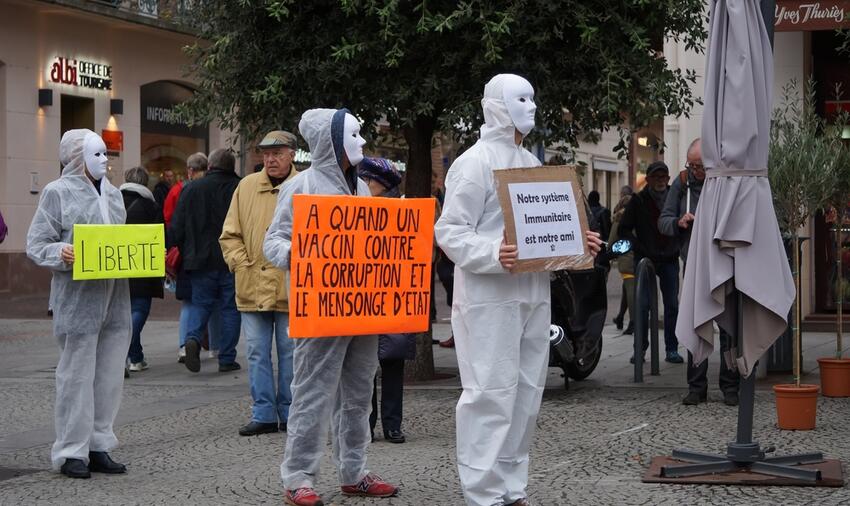
 Image Spech (via Shutterstock)
Image Spech (via Shutterstock)
OSC Scientific Seminar 2021-2022
Friday 18th March 2022, 11:30 am
Room K008 (1 St Thomas) and Online via Zoom
Partisan proximity and intention to vaccinate against COVID-19
Jeremy K. Ward & Sébastien Cortaredona
INSERM, CERMES 3 - IRD, Vitrome
For the past five years, increasing attention has been devoted to the relationship between political identities and attitudes to science and scientific issues. Vaccination has been one of the most studied cases. In the USA, most studies have found signitficant differences between Republicans and Democrats, the former being much more vaccine hesitant than the latter. In this litterature dominated by social and cognitive psychologists, the main explanation of these differences draws on the concepts of partisan cue and motivated reasoning.
Here, we will show the merits and limits of this form of explanation by analysing the political differences in intention to vaccinate against COVID-19 in France. We do so by drawing on a dataset of 34 crossectional online surveys conducted between march 2020 and june 2021 among representative samples of the French adult population (n=38 416).
Registration is mandatory (for Zoom users, the link for the videoconference will be sent one day before)
To find out more:
- Aurélie Bosquet et al., « L’hésitation vaccinale en France. Prévalence et variation selon le statut socio-économique des parents », Med Sci, vol. 36, n° 5, p. 461-464, 2020.
- Jeremy K. Ward et al., "The French public's attitudes to a future COVID-19 vaccine: The politicization of a public health issue", Soc Sci Med, 265:113414, 2020.
- Florian Cafiero, Paul Guille-Escuret, Jeremy K. Ward, “'I’m not an antivaxxer, but…': Spurious and authentic diversity among vaccine critical activists", Social Networks, 65, 2020.
- The Coconel Group, "A future vaccination campaign against COVID-19 at risk of vaccine hesitancy and politicisation", The Lancet Infectious Diseases, vol. 20, n° 7, p. 769-770, July 2020.
The financialisation of floor space, Mumbai 1880-2015
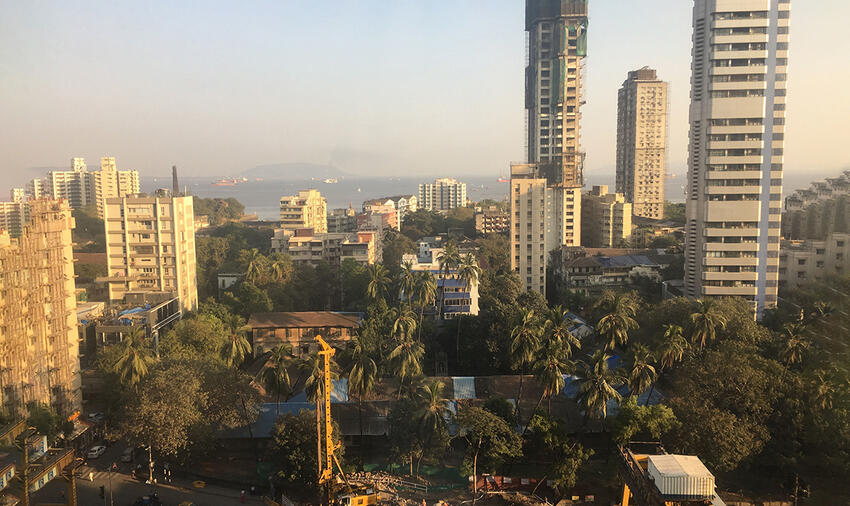
 Image from Mumbai by Sukriti Issar
Image from Mumbai by Sukriti Issar
The financialisation of floor space, Mumbai 1880–2015
Sukriti Issar (Sciences Po - OSC)
Urban Studies, first published February 25, 2022
This paper is available online on Sage Journals
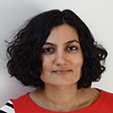 The paper explores the history of floor space policies, analysing instrument design, the actors and state agencies involved, key moments and policy debates in Mumbai over more than a hundred years.
The paper explores the history of floor space policies, analysing instrument design, the actors and state agencies involved, key moments and policy debates in Mumbai over more than a hundred years.
In 1991, the local state in Mumbai, India, introduced the financial instrument of ‘Transferable Development Rights’ (TDR). This instrument creates a market in concessions to building height regulations, allowing developers to buy and sell exemptions in a logic similar to carbon credits. TDR allows developers to monetise the undeveloped potential of (literally) the air over their plot and to sell it to others.
From a prescriptive regulation where a standard was set for the height of buildings (colonial-era standards of maximum permissible height in metres, or post-1950s floor space index) TDR is a shift to a market-based incentive. Paradoxically, TDR or ‘air rights’, and related incentives, are used by the state to achieve urban development and social goals like green space conservation or redevelopment of slum and dilapidated buildings in Mumbai.
This paper traces and explains, drawing on original archival research and interviews with 80 policy experts, the shift from a prescriptive regulation to a financial instrument, from standard to incentive, and the consequences of that shift. Contrary to assumptions that floor space instruments are apolitical and determined by the subjective opinions of planners, the shift from a command-and-control policy to a financialised policy instrument was here local, endogenous, gradual, and conflictual...
Highlight the in-work poverty under sociological point of view

 Image 09910190 (via Shutterstock)
Image 09910190 (via Shutterstock)
Family demographic processes and in-work poverty: A systematic review
Antonino Polizzia, Emanuela Struffolino, Zachary Van Winkle
Advances in Life Course Research, vol. 52, June 2022, 100462
Paper available on ScienceDirect portal
Paper also available in Preprint version (SocArXiv)
The presence of working poor individuals – employed individuals who live in households with incomes below the poverty threshold – represents a worrisome phenomenon in advanced democracies that can engender social exclusion. Individuals in in-work poverty constitute a sizeable group in rich countries, with the share of employed people at risk of poverty in the EU approaching 10% before the COVID-19 pandemic.
A comprehensive and critical review on how family demographic processes shape in-work poverty risks is still missing.
In this systematic review, made with 84 analyses extracted from 30 studies, we first provide a quantitative review of results from analyses that estimated the association between in-work poverty and parental home leaving, union formation, marriage, parenthood, and dissolution of non-marital and marital unions. This allows us to formulate tentative conclusions about whether and in which direction family demographic processes are associated with in-work poverty. Second, we discuss in detail conceptual and methodological advances in in-work poverty research, such as longitudinal analytical designs or attempts to make in-work poverty research more sensitive to policy context, gender, and the life course. Our review highlights theoretical and methodological challenges for future studies linking in-work poverty and family demography.
Some findings: Roughly 80 percent of analyses reported the risk of in-work poverty increased with children. 60 percent of analyses indicated that being in a union decreased this risk. The majority of the few studies considering union dissolution indicated that it increased the in-work poverty risk.
Fig.2 - Total number of analyses selected for the quantitative review by family demographic process: direction and significance of associations
Une analyse de la contre mobilité sociale en France

 Image Olena Yakobchuk (via Shutterstock)
Image Olena Yakobchuk (via Shutterstock)
Des trajectoires professionnelles qui ramènent au milieu social d’origine :
une analyse de la contre-mobilité en France en 2015
Marta Veljkovic
Doctorante, Sciences Po - OSC, INED
Revue française de sociologie, n° 2021/2, vol. 62), p.209 à 251 (publié le 23/02/2022)
 Dans le champ d'étude de la stratification sociale, Marta Veljkovic utilise les données longitudinales de l’enquête « Formation et Qualification Professionnelle » de l’Insee (de 1970 2015), pour mesurer de manière empirique les mobilités sociales intragénérationnelles et éprouver le concept de « contre-mobilité ». Un individu « contre-mobile » voit le poids de son origine sociale (milieu, conditions familiales) se renforcer au cours de sa vie professionnelle.
Dans le champ d'étude de la stratification sociale, Marta Veljkovic utilise les données longitudinales de l’enquête « Formation et Qualification Professionnelle » de l’Insee (de 1970 2015), pour mesurer de manière empirique les mobilités sociales intragénérationnelles et éprouver le concept de « contre-mobilité ». Un individu « contre-mobile » voit le poids de son origine sociale (milieu, conditions familiales) se renforcer au cours de sa vie professionnelle.
Cette étude confirme bien l'importance de ce phénomène d'éloignement temporaire de sa position sociale d'origine qui touche un homme sur quatre et une femme sur cinq. Elle permet de caractériser cette population distincte des mobiles et des immobiles, d'apprécier sa structuration et d'expliquer les mécanismes de contre-mobilité.
La sociologue questionne ici les cycles de vie, les conditions de la reproduction sociale, l'insertion professionnelle, les classes sociales ou les inégalités de genre.
Consultez cet article sur le portail Cairn (Abstract available in English and German)
Sciences Po is recruiting an Associate or Full Professor of Sociology
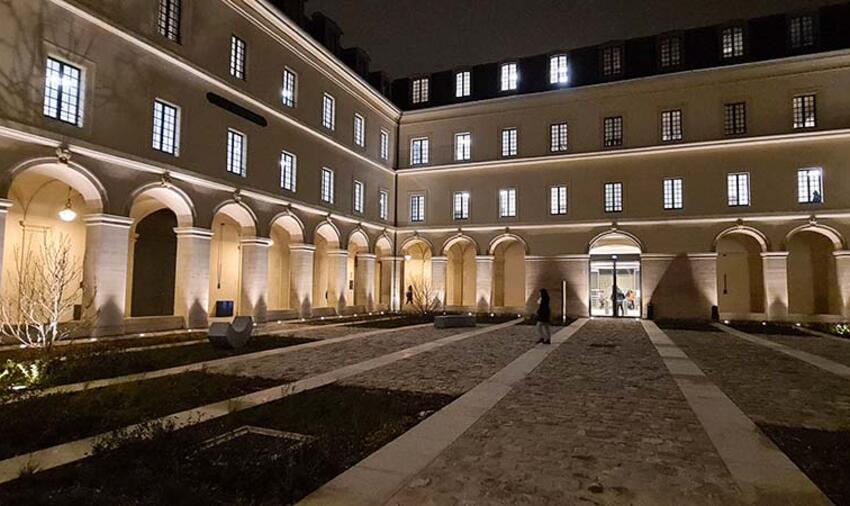
 Sciences Po, Cour René Seydoux (Sébastopol) - Image Yannick Savina
Sciences Po, Cour René Seydoux (Sébastopol) - Image Yannick Savina
Sciences Po recrute un.e Professeur.e des universités en sociologie (section 19 du CNU), à plein temps, qui sera affilié.e à l’Observatoire sociologique du changement (OSC) et au Département de sociologie. Prise de fonction le 1er janvier 2023.
Nous apprécierons les candidatures présentant un excellent dossier de publications dans les revues centrales de la sociologie et un programme de recherche ambitieux dans le domaine de la stratification sociale, indépendamment de leur expertise méthodologique. Nous accorderons une importance particulière aux candidat.e.s capables de stimuler de nouveaux domaines de recherche à l’OSC sur les inégalités de santé.
La personne recrutée conduira son programme de recherche à l’OSC. Elle participera activement aux activités collectives du centre, aux réseaux de recherche et répondra à des appels nationaux ou internationaux pour obtenir des financements.
La personne recrutée enseignera - en français ou en anglais - aux élèves du premier cycle de Sciences Po (Collège universitaire à Paris et dans les campus en région) et participera à la formation et à la supervision des élèves du programme de sociologie (master et doctorat).
La procédure de recrutement implique un dépôt de candidature sur le portail Galaxie du Ministère de l'Enseignement Supérieur, de la Recherche et de l'Innovation jusqu'au 29 avril 2022 à 16h (référence du poste : 4128).
- Consultez le profil du poste et la procédure pour y répondre (français, pdf, 375 ko)
- See the job description and the recruitment procedure (English, pdf, 180 ko)
Sciences Po is recruiting an associate or full professor of Sociology at the OSC - Observatoire Sociologique du Changement. Position starting on January 1st, 2023.
We welcome applications from candidates with an excellent publication record in leading journals of sociology and with an ambitious research agenda in the area of social stratification regardless of their methodological expertise. We particularly value applicants capable of stimulating new research areas on health inequality at OSC.
The successful candidate will become a full member of the Observatoire sociologique du changement (OSC). He / She is expected to play an active role in OSC’s collective activities and research networks. He / She will respond to national and international calls to fund research projects.
The successful candidate will teach - in English or French - in Sciences Po’s undergraduate and graduate programs (Collège universitaire in Paris and in other campuses), and will contribute to training and supervision in the graduate program in sociology (Master’s and PhD).
Applicants must complete their application on the "Galaxy" portal (French Ministry of Higher Education and Research) until the 29th of April, 4 pm (ref. 4128).
Sciences Po is recruiting a Full Professor of Sociology
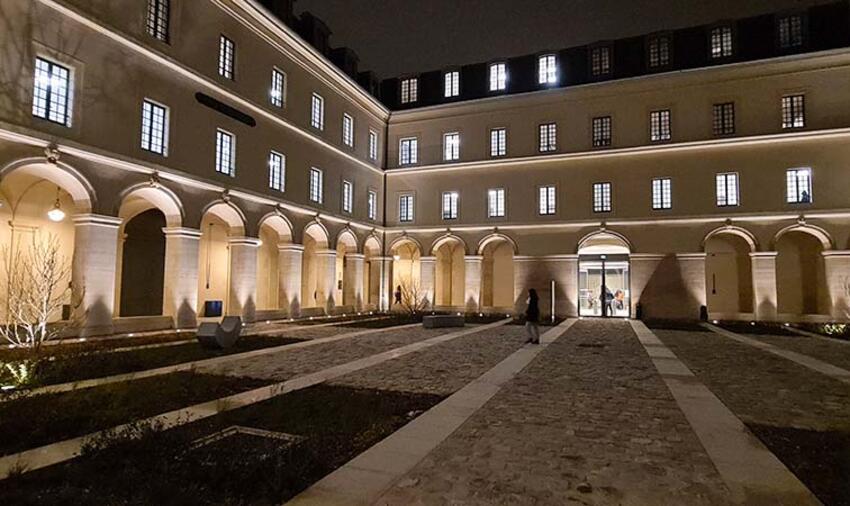
 Sciences Po, Cour René Seydoux (Sébastopol) - Image Yannick Savina
Sciences Po, Cour René Seydoux (Sébastopol) - Image Yannick Savina
Sciences Po is recruiting an associate or full professor of Sociology at the OSC - Observatoire Sociologique du Changement. Position starting on January 1st, 2023.
We welcome applications from candidates with an excellent publication record in leading journals of sociology and with an ambitious research agenda in the area of social stratification regardless of their methodological expertise. We particularly value applicants capable of stimulating new research areas on health inequality at OSC.
The successful candidate will become a full member of the Observatoire sociologique du changement (OSC). He / She is expected to play an active role in OSC’s collective activities and research networks. He / She will respond to national and international calls to fund research projects.
The successful candidate will teach - in English or French - in Sciences Po’s undergraduate and graduate programs (Collège universitaire in Paris and in other campuses), and will contribute to training and supervision in the graduate program in sociology (Master’s and PhD).
Applicants must complete their application on the "Galaxy" portal (French Ministry of Higher Education and Research) until the 29th of April, 4 pm (ref. 4128).
- Consultez le profil du poste et la procédure pour y répondre (français, pdf, 375 ko)
- See the job description and the recruitment procedure (English, pdf, 180 ko)
Sciences Po recrute un.e Professeur.e des universités en sociologie (section 19 du CNU), à plein temps, qui sera affilié.e à l’Observatoire sociologique du changement (OSC) et au Département de sociologie. Prise de fonction le 1er janvier 2023.
Nous apprécierons les candidatures présentant un excellent dossier de publications dans les revues centrales de la sociologie et un programme de recherche ambitieux dans le domaine de la stratification sociale, indépendamment de leur expertise méthodologique. Nous accorderons une importance particulière aux candidat.e.s capables de stimuler de nouveaux domaines de recherche à l’OSC sur les inégalités de santé.
La personne recrutée conduira son programme de recherche à l’OSC. Elle participera activement aux activités collectives du centre, aux réseaux de recherche et répondra à des appels nationaux ou internationaux pour obtenir des financements.
La personne recrutée enseignera - en français ou en anglais - aux élèves du premier cycle de Sciences Po (Collège universitaire à Paris et dans les campus en région) et participera à la formation et à la supervision des élèves du programme de sociologie (master et doctorat).
La procédure de recrutement implique un dépôt de candidature sur le portail Galaxie du Ministère de l'Enseignement Supérieur, de la Recherche et de l'Innovation jusqu'au 29 avril 2022 à 16h (référence du poste : 4128).
Expliquer les inégalités de classe et de genre dans la prise en charge des accidents vasculaires cérébraux

 Image Monkey Business Images (via Shuttertsock)
Image Monkey Business Images (via Shuttertsock)
OSC Scientific Seminar 2021-2022
Vendredi 25 février 2022, 11:30
Conférence en ligne via Zoom
Expliquer les inégalités de classe et de genre
dans la prise en charge des accidents vasculaires cérébraux
Muriel Darmon
Directrice de recherche CNRS
Centre Européen de Sociologie et de Science Politique (EHESS)
Discutantes : Émilie Grisez et Rébecca Lévy-Guillain (Sciences Po - OSC et INED)
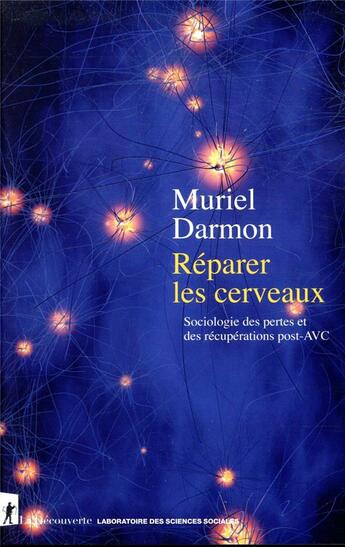 À propos de son ouvrage « Réparer les cerveaux. Sociologie des pertes et des récupérations post-AVC », Éditions La Découverte, 2021. Cet ouvrage est aussi consultable en ligne sur Cairn.
À propos de son ouvrage « Réparer les cerveaux. Sociologie des pertes et des récupérations post-AVC », Éditions La Découverte, 2021. Cet ouvrage est aussi consultable en ligne sur Cairn.
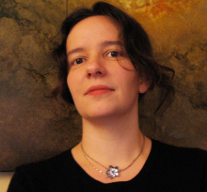 Les suites des AVC et notamment les récupérations de compétences ou d’habiletés perdues semblent marquées par des inégalités de classe et de genre importantes, et ce même à gravité de la lésion ou type de prise en charge comparables.
Les suites des AVC et notamment les récupérations de compétences ou d’habiletés perdues semblent marquées par des inégalités de classe et de genre importantes, et ce même à gravité de la lésion ou type de prise en charge comparables.
Mon intervention présentera quelques explications qui peuvent en être données à partir d’une approche sociologique. J’examinerai notamment les valeurs socialement attribuées aux pertes et aux récupérations qui font suite à l’AVC, qui peuvent rendre compte des moins bonnes récupérations pour les femmes, ainsi que la « forme scolaire » de l’hôpital, qui permet de mettre en lumière l’existence de déterminismes sociaux de classe de la récupération neurologique.
Cette intervention visera également à montrer l’apport et la robustesse des approches qualitatives (et en particulier des ethnographies hospitalières) dans la recherche d’explications aux inégalités sociales de santé observées statistiquement.
Inscription obligatoire (le lien vers la conférence vous sera envoyé la veille)
Pour en savoir plus : Page au CESSP
![]() Quand on demande à un neurologue si les séquelles d’un AVC sont les mêmes pour tout le monde, il peut répondre par exemple : "Tout dépend de la vitesse d’intervention (...) de l’état du cerveau (...) et de la qualité de la rééducation." Faire intervenir la sociologie consiste à se donner les moyens d’apporter encore d’autres réponses à cette même question, en soulignant que les séquelles, à gravité équivalente de la lésion, ne seront pas les mêmes si le patient est un homme ou une femme, un ouvrier ou un cadre supérieur, une personne dont les récupérations ont une grande ou une moindre valeur pour les professionnels, si la compétence perdue a une grande ou une moindre valeur pour le patient, si l’AVC a laissé intact chez lui un rapport aisé ou difficile aux modes scolaires d’apprentissage, et beaucoup d’autres éléments encore qui seront révélés au fil des chapitres de ce livre, qui cherche précisément à identifier les processus sociaux par lesquels les différences et inégalités dans les issues biologiques et neurologiques de l’AVC s’établissent. L’AVC et ses séquelles ne sont pas seulement une question de cerveau, ou plutôt, tout n’est pas neuronal dans le cerveau : ce qui s’y joue est déterminé, construit et reconstruit par les structures sociales qui lui sont extérieures.
Quand on demande à un neurologue si les séquelles d’un AVC sont les mêmes pour tout le monde, il peut répondre par exemple : "Tout dépend de la vitesse d’intervention (...) de l’état du cerveau (...) et de la qualité de la rééducation." Faire intervenir la sociologie consiste à se donner les moyens d’apporter encore d’autres réponses à cette même question, en soulignant que les séquelles, à gravité équivalente de la lésion, ne seront pas les mêmes si le patient est un homme ou une femme, un ouvrier ou un cadre supérieur, une personne dont les récupérations ont une grande ou une moindre valeur pour les professionnels, si la compétence perdue a une grande ou une moindre valeur pour le patient, si l’AVC a laissé intact chez lui un rapport aisé ou difficile aux modes scolaires d’apprentissage, et beaucoup d’autres éléments encore qui seront révélés au fil des chapitres de ce livre, qui cherche précisément à identifier les processus sociaux par lesquels les différences et inégalités dans les issues biologiques et neurologiques de l’AVC s’établissent. L’AVC et ses séquelles ne sont pas seulement une question de cerveau, ou plutôt, tout n’est pas neuronal dans le cerveau : ce qui s’y joue est déterminé, construit et reconstruit par les structures sociales qui lui sont extérieures.
Visiting researchers: the comeback!
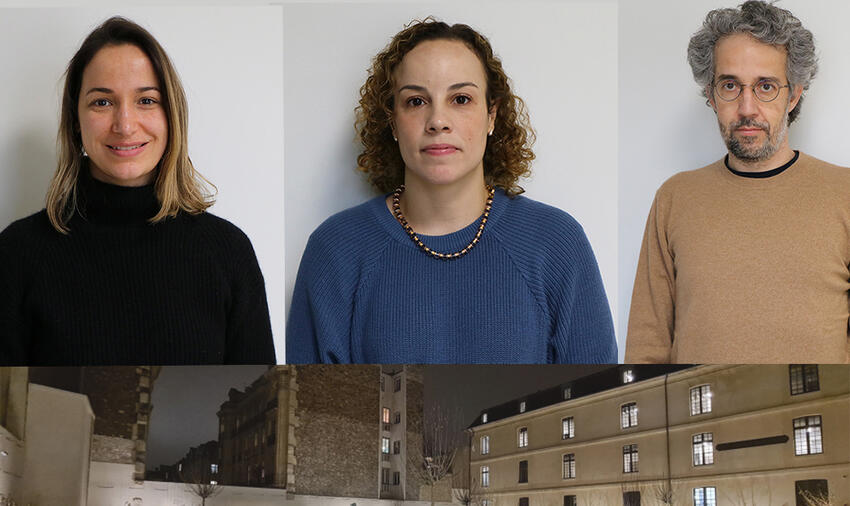
 New visitings in Sciences Po - OSC (February 2022)
New visitings in Sciences Po - OSC (February 2022)
Following many months of break due to the Covid pandemic, we are very pleased to welcome this year our three first Visiting colleagues.
Léa Pessin is an assistant professor of Sociology and Demography at the Pennsylvania State University, where she is also affiliated with the Population Research Institute. Her research focuses on the unequal consequences of the gender revolution on women’s work and family outcomes across class, race-ethnicity, and geographic contexts. During her stay at OSC, she will collaborate with Zachary Van Winkle on joint projects revolving around the intersectional consequences of work and family life courses in comparative perspective.
Website: https://leapessin.com/
Recent publications:
- Pessin, L., R. Rutigliano, and M. H. Potter. (2022). Time, Money, and Entry into Parenthood: The Role of (Grand) Parental Support. Journal of Marriage and Family, 84(1): 101-120. DOI: 10.1111/jomf.12782
- Newmyer, L., A. M. Verdery, R. Margolis, and L. Pessin (2021). Measuring Older Adult Loneliness across Countries. The Journals of Gerontology: Series B, 76(7): 1408–1414. DOI: 10.1093/geronb/gbaa109
- Pessin, L. (2018). Changing Gender Norms and Marriage Dynamics in the United States. Journal of Marriage and Family, 80(1):25-41. DOI: 10.1111/jomf.12444
Anna Carolina Venturini is a Postdoctoral Fellow at the Brazilian Center of Analysis and Planning – CEBRAP's International Interdisciplinary Postdoctoral Program (IPP). She received a Ph.D. in Political Science at the Institute for Social and Political Studies – IESP of the Rio de Janeiro State University (UERJ) in 2019. In 2017 she was a visiting fellow at Harvard University.
Her research interests lie at the intersections of affirmative action and public policies, race, ethnicity, gender, and institutional change. She uses mixed methods, including primary surveys and in-depth qualitative interviews.
At OSC, Venturini is working on a comparative study about the affirmative action policies implemented by Sciences Po (Conventions Éducation Prioritaire, studied by Marco Oberti) in France and the University of São Paulo (USP) in Brazil. The goal is to understand the policies' formulation and implementation processes over the last years, looking at patterns of institutional change and identifying differences and similarities concerning social and racial inclusion.
Website: http://annaventurini.com.br/
Recent publications:
- Affirmative action for Brazilian graduate programs: patterns of institutional change, Revista de Administração Pública, vol. 55, n° 6, Nov-dec 2021 https://doi.org/10.1590/0034-761220200631
- Affirmative action policy in graduate studies: The case of public universities, Cadernos de Pesquisa, vol. 50, n° 177, July-September 2020 [PT] https://doi.org/10.1590/198053147491
- Comparing diffusion patterns in affirmative action policies for graduate education in Brazil, Journal of Comparative Policy Analyses: Research and Practice, Published 18 January 2022. https://doi.org/10.1080/13876988.2021.2011608
Mauricio Ernica, is Professor at the University of Campinas (Unicamp, Brazil), Faculty of Education. He is also researcher at the Public Policy Study Centre of the State University of Campinas (Núcleo de Estudos de Políticas Públicas - NEPP). Until end of July 2022, he works together with Agnès van Zanten on scholar inequalities and their relationship with social inequality in Brazil.
Regarding the São Paulo case, he published:
- "The school, the metropolis and the vulnerable neighboorhood" (or Portuguese full version) and
- "Educational inequalities in metropolises: territory, socioeconomic status, race and gender".
He leads a collective project to produce an indicator of learning inequality usable for each Brazilian municipalities (IDeA). https://portalidea.org.br/.
Gendered contexts?

 Hanley, Stoke-on-Trent, Staffordshire - Image RMC42 (via Shutterstock)
Hanley, Stoke-on-Trent, Staffordshire - Image RMC42 (via Shutterstock)
OSC Scientific Seminar 2021-2022
Friday 18th February 2022, 11:30 am
Online conference via Zoom
Gendered contexts?
The effect of neighbourhood socioeconomic deprivation
on girls' and boys' cognitive and non-cognitive development
Laura Silva
PhD Student, Sciences Po
CREST Affiliated Member
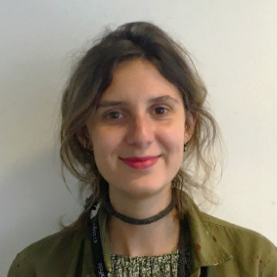 Does socio-economic deprivation of adolescents' residential neighbourhoods affect their cognitive and non-cognitive development? Leveraging data from the National Child Development Study (NCDS) in the UK, this study investigates this question focusing on gender differences.
Does socio-economic deprivation of adolescents' residential neighbourhoods affect their cognitive and non-cognitive development? Leveraging data from the National Child Development Study (NCDS) in the UK, this study investigates this question focusing on gender differences.
By exploiting the quasi-exogenous social housing allocation procedures in the UK, I aim to limit issues related to the endogeneity of neighbourhood selection.
Results show that living in more deprived areas has overall a negative effect on cognitive and non-cognitive development. However, neighbourhood deprivation negatively affects girls’, as compared to boys’, cognitive skills, academic motivation and employability skills, while no significant gender difference is detected for problem behaviour. On the one hand, these findings highlight the importance of taking gender into account in neighbourhood studies and, on the other hand, they suggest that the availability of support within the local area and the quality of institutions should be considered as relevant theoretical mechanisms to understand the role of neighbourhoods on different spheres of adolescents development.
Registration is mandatory (the link for the videoconference will be sent one day before)
To find out more: Profile Page (OSC)
Entering the Mainstream Economy? Workplace Segregation and Assimilation across Immigrant Generations

 Image Hyejin Kang (via Shutterstock)
Image Hyejin Kang (via Shutterstock)
OSC Scientific Seminar 2021-2022
Friday 11th February 2022, 11:30 am
Online conference via Zoom
Entering the Mainstream Economy?
Workplace Segregation and Assimilation across Immigrant Generations
Are Skeie Hermansen
Dept. of Sociology and Human Geography, University of Oslo
Swedish Institute for Social Research, Stockholm University
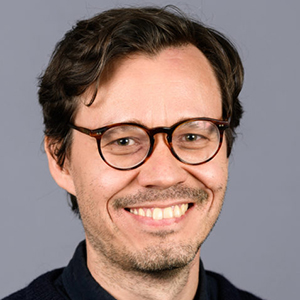 Low-status immigrants in Europe and North America are often found in workplaces with high shares of minority employees and less prestigious jobs compared to natives. However, less in known on whether and how socioeconomic progress in the second generation translates into declining workplace segregation.
Low-status immigrants in Europe and North America are often found in workplaces with high shares of minority employees and less prestigious jobs compared to natives. However, less in known on whether and how socioeconomic progress in the second generation translates into declining workplace segregation.
Using linked employer-employee administrative data from Norway, this study shows that, on average, 43% and 28%, respectively, of immigrants’ and their descendants’ coworkers have immigrant background compared to 14% among natives.
For economic segregation, the average workplace percentile rank in mean coworker salaries are 39, 48, and 51 for immigrants, descendants, and natives.
A formal decomposition shows that individual worker traits, employer characteristics, and residential segregation collectively explain about 44-49% and 83-86% of ethnic and socioeconomic workplace segregation, respectively, in both immigrant generations.
Overall, this documents a clear pattern of intergenerational assimilation where many immigrant descendants are entering workplaces in the mainstream economy, that resemble those of natives.
Registration is mandatory (the link for the videoconference will be sent one day before)
To find out more: Profile Page (Univ. Oslo)
What do fathers use their leave for? Exploring the diversity of uses and non-uses of paternity leave in France

 Image Prostock-studio (via Shutterstock)
Image Prostock-studio (via Shutterstock)
OSC Scientific Seminar 2021-2022
Friday 4th February 2022, 11:30 am
Online conference via Zoom
What do fathers use their leave for?
Exploring the diversity of uses and non-uses of paternity leave in France
Alix Sponton
PhD Student, Sciences Po - OSC & INED
 Between 2002 and 2021, French fathers could take up to 14 days of paid leave until the baby turns four month old. From the institutional perspective, the main aim of this public policy was to guarantee a more balanced division of childcare between parents. But from fathers’ point of view, what is the purpose of paternity leave? And how to understand that some eligible fathers make no use of it?
Between 2002 and 2021, French fathers could take up to 14 days of paid leave until the baby turns four month old. From the institutional perspective, the main aim of this public policy was to guarantee a more balanced division of childcare between parents. But from fathers’ point of view, what is the purpose of paternity leave? And how to understand that some eligible fathers make no use of it?
Based on longitudinal interviews with fathers before and after the birth, I adopt an approach of reception to explore the diverse uses and non-uses fathers can make of French paternity leave. The presentation gives particular attention to when and why fathers decided to use their leave (just after the birth to help their partner recovering, during a holiday period so they can visit family, etc.) Results highlight how paternity leave is articulated with alternative options available to fathers (for instance, informally “extended” by regular leave or “replaced” by a business interruption in the case of self-employed workers).
This presentation encourages to consider not only the leave take-up but also the myriad of usages that can be made of the same public policy. Better understanding what the leave can do to fathers thus necessitate to first look at what fathers do to the leave.
Registration is mandatory (the link for the videoconference will be sent one day before)
To find out more: Profile Page (OSC)
Assistant Professor en sociologie (Job offer)
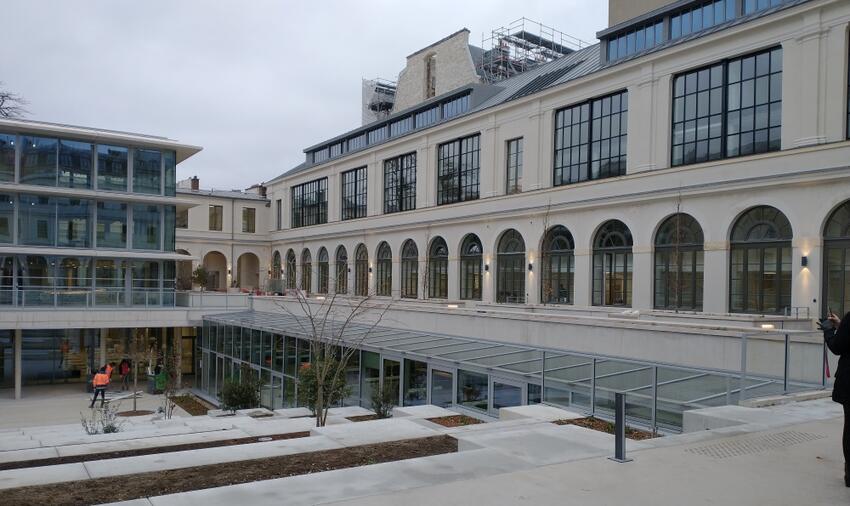
 Le nouveau campus "1 Saint Thomas" à Paris 7ème (image B. Corminboeuf, OSC)
Le nouveau campus "1 Saint Thomas" à Paris 7ème (image B. Corminboeuf, OSC)
Sciences Po recrute un.e Assistant Professor en sociologie, emploi de statut privé, à temps plein, avec tenure track. La personne recrutée sera rattachée à l’Observatoire sociologique du changement (OSC) et au Département de sociologie.
Ce poste est destiné à renforcer et compléter l’expertise de l’OSC dans l’étude des inégalités sociales.
Nous accueillons les candidatures de personnes ayant un doctorant récent, proposant un programme de recherche ambitieux dans le domaine de la stratification et des inégalités sociales, et visant des publications dans les revues centrales de la sociologie.
Les chercheur.e.s de l’OSC sont reconnu.e.s au plan international pour leur expertise dans l’étude des inégalités dans différents domaines : l’éducation, le genre, le parcours de vie, le marché du travail et les inégalités économiques, la mobilité sociale, la ségrégation urbaine, la migration, les minorités ethno-raciales, la culture et le numérique. De nouvelles expertises sur les inégalités environnementales ou de santé seront également les bienvenues.
La personne retenue justifiera d’une solide expérience en matière de méthodologie de recherche qualitative (ethnographie, entretiens, observations, focus groups, etc.) Nous apprécierons également des candidats et des candidates capables de faire appel à des approches qualitatives innovantes (enquêtes en ligne, analyses de contenu, analyse de données historiques, analyse comparative qualitative, traçage des processus, méthodes de visualisation, méthodes mixtes, etc.).
La personne recrutée enseignera aux élèves du premier cycle de Sciences Po (Collège universitaire à Paris et dans les campus en région) et participera à la formation et à la supervision des élèves du programme de sociologie (Master et Doctorat). Au-delà de ses spécialités thématiques, elle pourra être amenée à enseigner le cours de sociologie générale au Collège universitaire.
La fiche complète de poste et le détail des modalités de candidature sont disponibles en téléchargement ici :
- Fiche en français (pdf, 220 ko)
- Job description and recruitment process in English (pdf, 280 ko)
Sciences Po is recruiting an Assistant Professor of sociology (tenure track), position beginning on the 1st of September 2022. The successful candidate will be affiliated to the Observatoire sociologique du changement (OSC) and to the Department of Sociology at Sciences Po.
This position is designed to reinforce and complement our expertise in the study of social inequality. We welcome applications from candidates with a recent PhD and with an ambitious research agenda in social stratification and inequality targeting publications in leading journals of sociology.
OSC faculty members are international experts on central questions of inequality such as education, gender, life course, labor market and economic inequality, social mobility, urban segregation, migration, ethnoracial minorities, cultural inequality and digital inequality.
We welcome candidates engaged in all these areas as well as those capable of stimulating new expertise in the center on environmental inequality and health inequality.
The successful candidate should specifically demonstrate solid experience in qualitative research methodology (ethnography, interviews, observations, focus groups, etc.). We will also value applicants capable of stimulating innovative qualitative approaches (online qualitative methods, content analysis, historical data analysis, qualitative comparative analysis, process tracing, visual methodologies, mixed-methods, etc.)
The successful candidate will teach in Sciences Po’s undergraduate and graduate programs (Collège universitaire in Paris and in other campuses), and will contribute to training and supervision in the graduate program in sociology (Master’s and PhD). Beyond her / his specific research fields, she / he should also be willing to teach general sociology in the Collège universitaire.
Immigrants' Descendants' Wages: An overlooked dimension of Ethno-racial Inequalities in France

 Image H_Ko (via Shutterstock)
Image H_Ko (via Shutterstock)
OSC Scientific Seminar 2021-2022
Friday 21st January 2022, 11:30 am
Online conference via Zoom
Immigrants' Descendants' Wages:
An overlooked dimension of Ethno-racial Inequalities in France
Mathieu Ichou
Tenured researcher at INED (the French Institute for Demographic Studies)
Co-head of the International Migrations and Minorities (MIM)
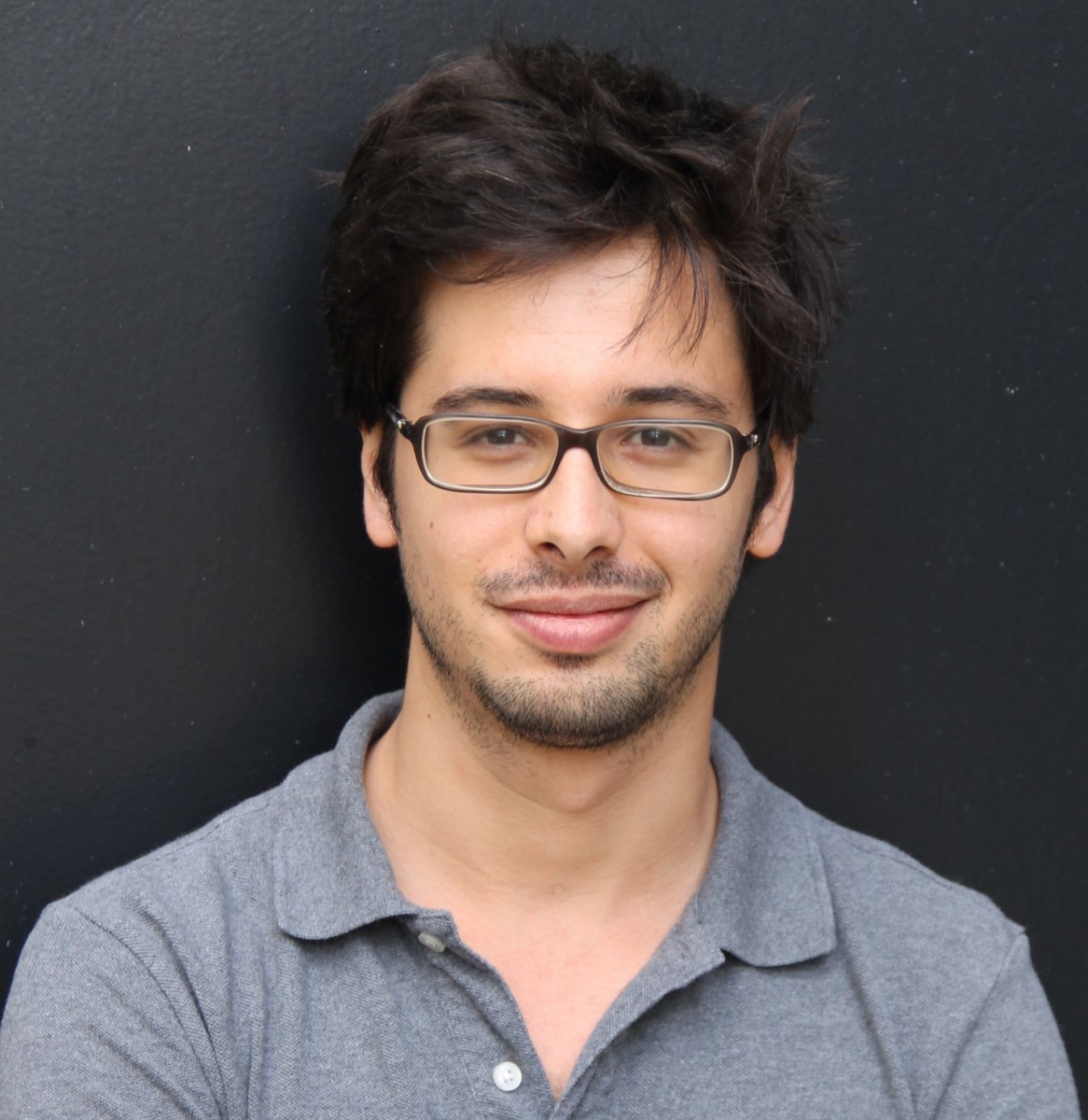 Research on the labor market situation of descendants of immigrants in France has highlighted the strong ethno-racial inequalities in access to employment at the expense of descendants of non-European immigrants. Yet, very few studies have focused specifically on ethno-racial gaps in wages and those that did have mostly concluded that these inequalities are negligible.
Research on the labor market situation of descendants of immigrants in France has highlighted the strong ethno-racial inequalities in access to employment at the expense of descendants of non-European immigrants. Yet, very few studies have focused specifically on ethno-racial gaps in wages and those that did have mostly concluded that these inequalities are negligible.
In this paper, write with Ugo Palheta, we revisit the analysis of ethno-racial wage inequalities in France. To do so, we compile 14 years of the French Labor Force Survey (from 2005 to 2018).
Our results contradict the dominant consensus: ethno-racial wage gaps appear to be strong, especially when urban and regional differences are taken into account, and the intersectional nature of these inequalities is analyzed.
Registration is mandatory (the link for the videoconference will be sent one day before)
To find out more: Profile Page - CV
Labour market protection across space and time

 Image Werner Spremberg (via Shutterstock)
Image Werner Spremberg (via Shutterstock)
Labour market protection across space and time:
A revised typology and a taxonomy of countries’ trajectories of change
Emanuele Ferragina & Federico Danilo Filetti (Sciences Po - OSC & LIEPP)
Journal of European Social Policy
First Published 2022, January 11
https://doi.org/10.1177/09589287211056222
We measure and interpret the evolution of labour market protection across 21 high-income countries over three decades, employing as conceptual foundations the ‘regime varieties’ and ‘trajectories of change’ developed by Esping-Andersen, Estevez-Abe, Hall and Soskice, and Thelen.
We measure labour market protection considering four institutional dimensions – employment protection, unemployment protection, income maintenance and activation – and the evolution of the workforce composition.
This measurement accounts for the joint evolution of labour market institutions, their complementarities and their relation to outcomes, and mitigate the unrealistic Average Production Worker assumption.
We handle the multi-dimensional nature of labour market protection with Principal Component Analysis and capture the characteristics of countries’ trajectories of change with a composite score. We contribute to the literature in three ways.
(1) We portray a revised typology that accounts for processes of change between 1990 and 2015, and that clusters regime varieties on the basis of coordination and solidarity levels, that is, Central/Northern European, Southern European, liberal.
(2) We illustrate that, despite a persistent gap, a large majority of Coordinated Market Economies experiencing a decline in the level of labour market protection became more similar to Liberal Market Economies.
(3) We develop a fivefold taxonomy of countries’ trajectories of change (liberalization, dualization, flexibility, de-dualization and higher protection), showing that these trajectories are not always path-dependent and consistent with regime varieties previously developed in the literature.
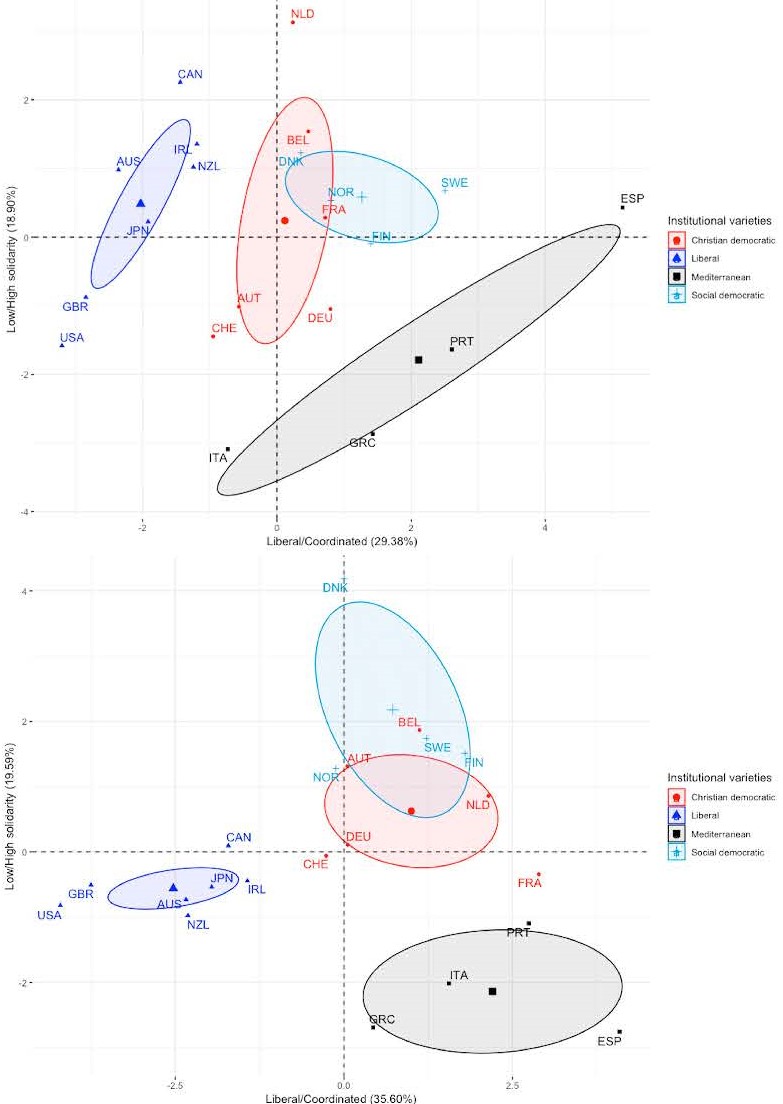
Fig 1 - Varieties of labour market protection (1990–2015)
Property, Custom, and Religion in Early Nineteenth-Century Bombay

 Image Victoria and Albert Museum, 4250 - F. Frith & Co. serial number
Image Victoria and Albert Museum, 4250 - F. Frith & Co. serial number
Property, Custom, and Religion in Early Nineteenth-Century Bombay
Sukriti Issar
Analysis of a novel source of data about early nineteenth-century Bombay, with a novel methodology, makes an important contribution to debates about inter-religious contact in South Asia.
After the fire of 1803 in Bombay, landowners were asked to lease or sell their lands to people. Bombay’s register of sales deeds, which lists the names of buyers, sellers, and neighbors, also permits identification of their religious affiliations when supplemented with archival information about the bureaucratic practices affecting property transactions. Findings suggest that property transactions within religious groups comprised most of the sales (60 percent). Contemporary petitions show that residents sometimes appealed to the state to prevent the sale of property to people who did not share their religion.
Many diverse examples illustrate how religion and urban space intersected in early nineteenth-century colonial Bombay. Landowners attempted to control the religious composition of the groups that were renting their land or buying their neighbors’ land. Given the right of first refusal, and other instances of attempts to sell or rent property only to co-religionists, property transactions are ready terrain for analyzing inter-religious contact.
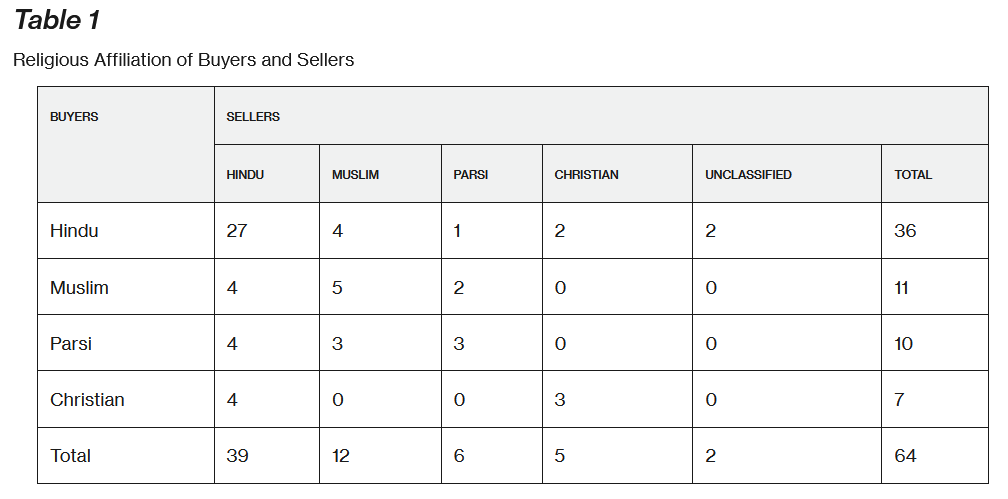
Toxic Neighborhoods: The Effects of Concentrated Poverty and Environmental Lead Contamination on Early Childhood Development

 Image Kolbakova Olga (via Shutterstock)
Image Kolbakova Olga (via Shutterstock)
OSC Scientific Seminar 2021-2022
Friday 28th January 2022, 2:30 pm / 4 pm
Online conference via Zoom
Toxic Neighborhoods: The Effects of Concentrated Poverty and Environmental Lead Contamination on Early Childhood Development
Geoffrey Wodtke
Associate professor, The University of Chicago, Departement of Sociology
 Although socioeconomic disparities in cognitive ability emerge early in the life course, most research on the consequences of living in a disadvantaged neighborhood focuses on school-age children or adolescents.
Although socioeconomic disparities in cognitive ability emerge early in the life course, most research on the consequences of living in a disadvantaged neighborhood focuses on school-age children or adolescents.
In this study, we outline and test a theoretical model of neighborhood effects on cognitive development during early childhood that highlights the mediating role of environmental health hazards, and in particular, exposure to neurotoxic lead.
To evaluate this model, we follow 1,266 children in Chicago from birth through the time of school entry, tracking their areal risk of lead exposure and the socioeconomic composition of their neighborhoods over time.
We then estimate the joint effects of neighborhood poverty and environmental lead contamination on receptive vocabulary ability.
We find that sustained exposure to disadvantaged neighborhoods reduces vocabulary skills during early childhood and that this effect operates through a causal mechanism involving lead contamination.
Registration is mandatory (the link for the videoconference will be sent one day before)
To find out more: Profile Page - CV
Bringing Underprivileged Middle-School Students to the Opera

 Image Nikolay Antonov (via Shutterstock)
Image Nikolay Antonov (via Shutterstock)
Bringing Underprivileged Middle-School Students to the Opera: Cultural Mobility or Cultural Compliance?
Philippe Coulangeon (CNRS Senior Researcher, Sciences Po - OSC) & Denis Fougère (CNRS Senior Researcher, Sciences Po - OSC & LIEPP)
IZA, Institute of Labor Economics Discussion Paper Series, n° 14910, december 2021, 32 p.
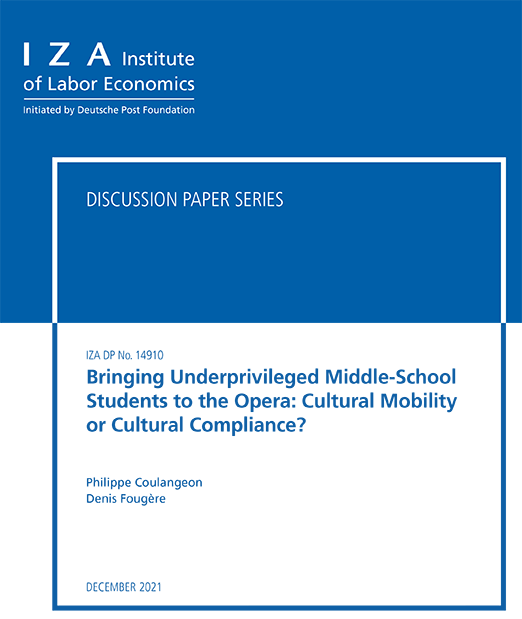 This article assesses the impact of a two-year long project-based learning program conducted by the National Opera of Paris in a large number of junior high-schools located in underprivileged areas, aiming at preventing school dropout and tackling educational inequalities by providing disadvantaged students with the opportunity to discover the world of opera.
This article assesses the impact of a two-year long project-based learning program conducted by the National Opera of Paris in a large number of junior high-schools located in underprivileged areas, aiming at preventing school dropout and tackling educational inequalities by providing disadvantaged students with the opportunity to discover the world of opera.
Taking a counterfactual approach (propensity score matching), we measure the impact of participation in the program on final exam and continuous assessment grades.
The analysis displays mixed results: a significant and positive impact for the students who participate in the program for its whole duration (two years), at least for continuous assessment scores, but a negative impact for those who leave the program after only one year. The contrast between the effects of full and partial participation in the program suggests that these may be primarily due to a selection effect in favor of the most culturally and socially compliant students, in line with Bourdieu’s and Passeron’s reproduction theory (1997 [1970]) rather than a mobility effect (DiMaggio, 1982) resulting from the transfer of cultural capital to disadvantaged students.
Education and social mobility: Rethinking old work in light of new results
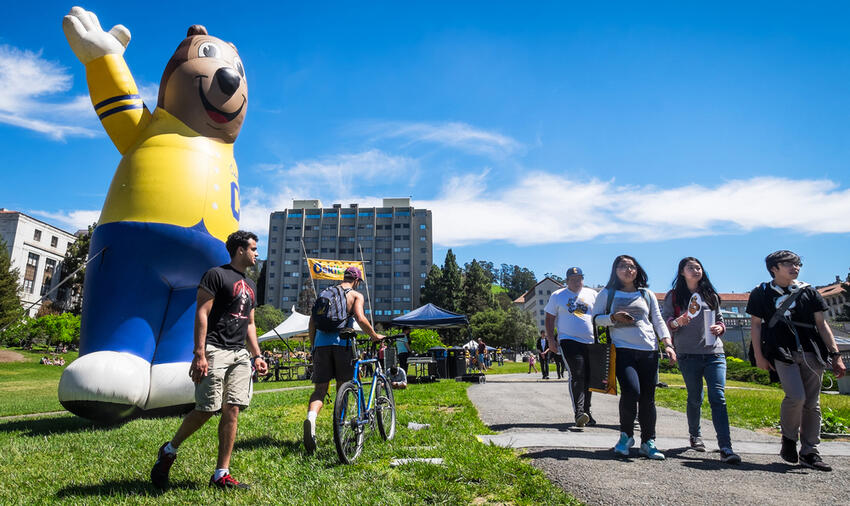
 Univ. of California Berkeley. Mascot Oski greets newly admitted students
Univ. of California Berkeley. Mascot Oski greets newly admitted students
OSC Scientific Seminar 2021-2022
Friday 14th January 2022, 2:30 pm / 4 pm
Online conference via Zoom
Education and social mobility: Rethinking old work in light of new results
Michael Hout
Professor of Sociology, University of New York
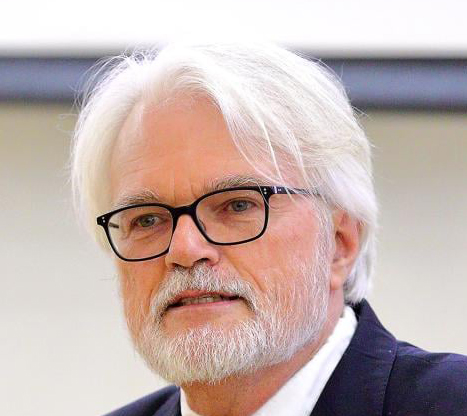 Education mediates much of the association between class origins and destinations — more so for people from lower classes than upper classes. Florencia Torche famously call the pattern “the great equalizer.” It is a special case of heterogenous returns to education.
Education mediates much of the association between class origins and destinations — more so for people from lower classes than upper classes. Florencia Torche famously call the pattern “the great equalizer.” It is a special case of heterogenous returns to education.
I will summarize recently published results on negative selection (Cheng et al. 2021), forthcoming results on college graduation (Voss, Hout, and George 2022), and unpublished results on heterogeneity by occupation (Hout and Martin-Caughey 2022) and discuss their implications for how we understand other findings about heterogeneity. I conclude that university admissions are too uniform in their criteria for admission and limit mobility relative to their potential due to their lack of variation.
PAPERS
- 2021, Siwei Cheng, Jennie E. Brand, Xiang Zhou, Yu Xie and Michael Hout, “Heterogenous returns to college over the life course”, Science Advances, 7 (51): abg7641.
- 2022 (Forthcoming), Kim Voss, Michael Hout and Kristen George, "Persistent inequalities in college completion, 1980–2010”, Social Problems, n° 69.
- 2022, Michael Hout and Ananda Martin-Caughey, “Returns to education by occupation” [To be presented at the annual meeting of the Population Association of America, April 2022].
Registration is mandatory (the link for the videoconference will be sent one day before)
To find out more: Website mikehout.com or Homepage at NYU
Handicap et destinées sociales

 Image Inspiring (via Shutterstock)
Image Inspiring (via Shutterstock)
Handicap et destinées sociales
Une enquête par méthodes mixtes
Célia BOUCHET
Observatoire sociologique du changement (CNRS UMR 7049) et Laboratoire interdisciplinaire d’évaluation des politiques publiques
Soutenance de thèse à l'École de la recherche, Sciences Po, dans le cadre du Programme doctoral de sociologie, mardi 4 janvier 2022 (en ligne, via Zoom).
Thèse dirigée par Anne REVILLARD, Associate Professor, Sciences Po - OSC et LIEPP et Philippe COULANGEON, Directeur de recherche CNRS, Sciences Po - OSC.
Membres du jury :
Emmanuelle CAMBOIS, Directrice de recherche, INED
Philippe COULANGEON, Directeur de recherche CNRS, Sciences Po, OSC (codirecteur)
François DUBET, Professeur des universités émérite, Université de Bordeaux ; Directeur d’études, EHESS (rapporteur)
Serge EBERSOLD, Professeur des universités, CNAM (rapporteur)
Sophie MITRA, Professor, Fordham University
Anne REVILLARD, Associate Professor, Sciences Po (codirectrice)
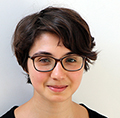 Alors que, au reflet de préoccupations contemporaines, des travaux sociologiques se développent sur les inégalités « entre » groupes sociaux, les différences de parcours liées au handicap sont encore peu documentées. Cette thèse examine les différenciations verticales (inégalités) et horizontales (divisions sans hiérarchies) entre personnes valides et personnes ayant grandi avec des limitations durables vivant en ménage en France métropolitaine.
Alors que, au reflet de préoccupations contemporaines, des travaux sociologiques se développent sur les inégalités « entre » groupes sociaux, les différences de parcours liées au handicap sont encore peu documentées. Cette thèse examine les différenciations verticales (inégalités) et horizontales (divisions sans hiérarchies) entre personnes valides et personnes ayant grandi avec des limitations durables vivant en ménage en France métropolitaine.
Nous combinons une exploitation de l’Enquête Emploi en Continu 2011 et de son module ad-hoc avec une analyse d’entretiens semi-directifs menés avec 37 personnes, dont 20 ayant grandi avec une déficience visuelle et 17 ayant grandi avec des troubles cognitifs spécifiques.
Le handicap façonne les parcours des personnes interrogées à travers trois dynamiques : des assignations (perceptions et traitements par autrui), des auto-identifications (représentations et pratiques des personnes elles-mêmes) et des contraintes liées aux limitations durables (impératifs temporels, restriction des possibles…). Ces dynamiques agissent aussi sur les représentations par les personnes de leurs positions, entre repérages de certaines dévalorisations quotidiennes et biais favorables dans l’auto-évaluation de leur réussite. Des approfondissements relatifs à la scolarité, à l’emploi et à la vie familiale nous apprennent que le handicap coconstruit avec l’origine sociale, le genre, la migration et la race des inégalités au détriment de plusieurs sous-populations handicapées : moindres niveaux d’études, freins à l’emploi et en emploi, obstacles à la conjugalité et à la parentalité… Des divisions horizontales singulières existent également entre personnes valides et personnes perçues par autrui ou s’auto-identifiant comme handicapées, comme des spécialisations scolaires et professionnelles et des appariements conjugaux atypiques.
While sociological research on inequalities "between" social groups is developing in response to contemporary concerns, disability-related differences in life courses are still poorly documented.
This thesis examines differentiations between able-bodied people and people who have grown up with long-term limitations living in households in metropolitan France, in their vertical (inequalities) and horizontal (divisions without hierarchies) components.
We combine an exploitation of the 2011 Continuous Employment Survey and its ad-hoc module with an analysis of semi-structured interviews conducted with 37 people, 20 of whom have grown up with a visual impairment and 17 of whom have grown up with specific learning disorders.
Disability shapes the paths of the interviewees through three dynamics: assignments (perceptions and treatments by others), self-identifications (representations and practices of the people themselves) and constraints linked to long-term limitations (time requirements, reduced scope of possibilities...). These dynamics also influence people's representations of their positions, from the identification of a number of daily devaluations to favorable biases in the self-evaluation of their success. Further investigation on schooling, employment and family life teaches us that disability co-constructs inequalities with social origin, gender, migration and race, to the detriment of several disabled sub-populations: lower levels of education, barriers to employment and in employment, restricted access to conjugality and parenthood... Specific horizontal divisions also exist between able-bodied people and people perceived by others or self-identifying as disabled, such as educational and occupational specializations and atypical conjugal pairings.
Pour des raisons de sécurité, les soutenances (Thèses & HDR) sont réservées aux personnes invitées et aux publics internes de Sciences Po.
POUR EN SAVOIR PLUS
Neighborhood and community effects in East and Southeast Asia
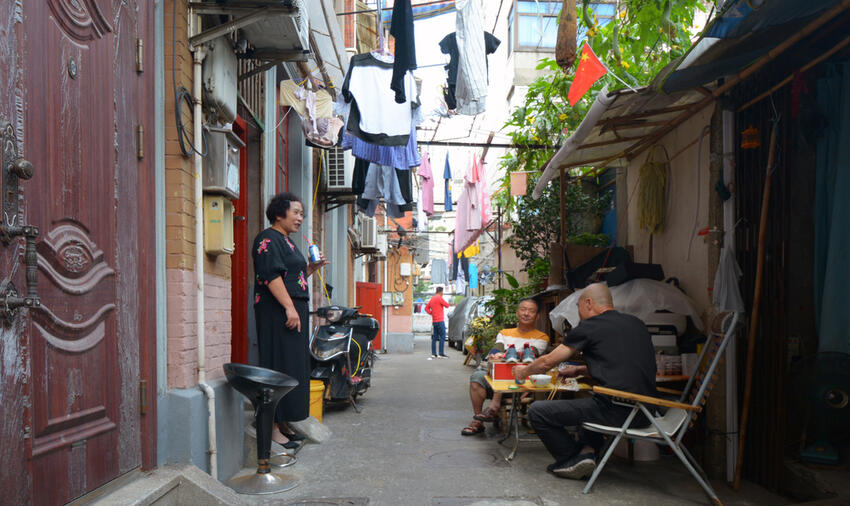
 Centre of Shanghai - Area due for demolition (Image Dave Colman / Shutterstock)
Centre of Shanghai - Area due for demolition (Image Dave Colman / Shutterstock)
OSC Scientific Seminar 2021-2022
Friday 10th December 2021, 11:30 am / 1 pm
On-site (Percheron room) – Also in hybrid format via Zoom (for external audience)
Neighborhood and community effects in East and Southeast Asia, a systematic review and meta-analytical exploration of publication bias
Jaap Nieuwenhuis
Assistant professor, University of Groningen, Department of Sociology
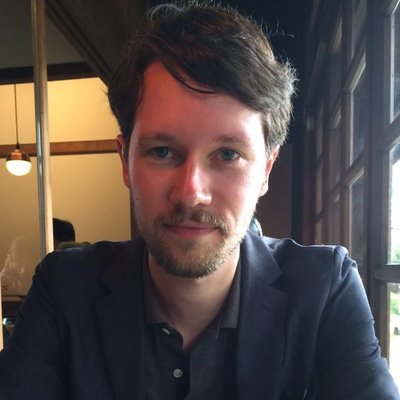 Neighborhood and community effects have been studied at an increasing rate in the Western literature since three decades and have informed urban policies such as housing voucher and neighborhood regeneration programs.
Neighborhood and community effects have been studied at an increasing rate in the Western literature since three decades and have informed urban policies such as housing voucher and neighborhood regeneration programs.
Since about ten years, this line of study is seen more and more in the East and Southeast Asian region as well. As an emerging field in this part of the world, the literature has yet to be critically reviewed and its body of literature provides a unique opportunity to study the effects different research communities might have on the development of neighborhood and community effects.
This systematic review brings together 165 studies about neighborhood and community effects in East and Southeast Asia and first gives an overview of this literature, followed by a critical appraisal of this literature, with a specific focus on publication bias.
The results show that due to publication bias, the “true” neighborhood effect might be overestimated in this literature. Health research shows greater publication bias than human geography and general social science. Studies by only local scholars are more prone to bias than studies from collaborative teams or only nonlocal scholars. This suggests that this field is either relatively early in its life-cycle, where proving the neighborhood effects thesis is still attractive, or that publication pressure is much higher in Asia compared to the West.
In sum, the current state of this literature makes broad generalizations difficult, but the ongoing maturation makes this field an interesting one to follow.
Registration is mandatory (the link for the videoconference will be sent one day before)
TO FIND OUT MORE
Teaching Introduction to Sociology
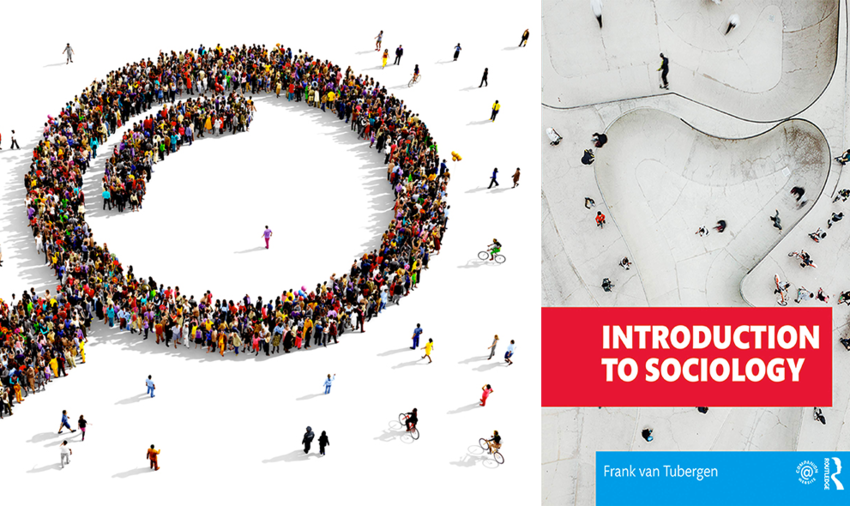
 Images Arthimedes (via Shutterstock) & Routledge
Images Arthimedes (via Shutterstock) & Routledge
OSC Scientific Seminar 2021-2022
Friday 17th December 2021, 11:30 am / 1 pm
Available on Zoom Videoconference
Teaching Introduction to Sociology
Frank van Tubergen
Full Professor of Sociology
Utrecht University & the Netherlands Interdisciplinary Demographic Institute
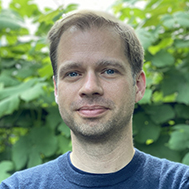
In this talk, I’ll present my textbook Introduction to Sociology (Routledge, 2020). I’ll give an overview of the aims, content, and pedagogical features of the book. I’ll present the companion website, which provides free teaching materials for ever chapter for both instructors and students. Furthermore, I’ll illustrate how to design the Intro to Sociology course using this textbook.
Frank van Tubergen is full Professor of Sociology at Utrecht University and the Netherlands Interdisciplinary Demographic Institute (NIDI). His research interests include immigration and integration, social networks, and religion. He co-coordinated the Children of Immigrants Longitudinal Study in Four European Countries (CILS4EU). Van Tubergen’s research has been published in journals such as American Sociological Review, European Sociological Review, American Journal of Sociology, and Demography. Van Tubergen is an elected fellow of the European Academy of Sociology. To find more about Frank van Tubergen
Registration is mandatory (Zoom users: the link will be sent one day before)
Do Neighborhoods Empower or Disenfranchise?

 Image Halfpoint (via Shutterstock)
Image Halfpoint (via Shutterstock)
OSC Scientific Seminar 2021-2022
Friday 3rd December 2021, 11:30 am / 1 pm
Available on Zoom Videoconference
Do Neighborhoods Empower or Disenfranchise?
Coethnic concentration, spatial disadvantage, and voter registration in France
Haley McAvay & Pavlos Vasilopoulos
Lecturers (sociology & politics), University of York
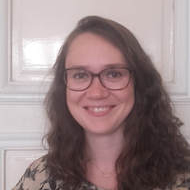
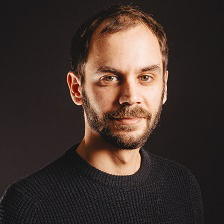 Ethnoracial inequalities in political participation are a key feature of many advanced democracies. Prior research suggests that the socioeconomic and ethnoracial composition of citizens’ local communities could be driving these disparities.
Ethnoracial inequalities in political participation are a key feature of many advanced democracies. Prior research suggests that the socioeconomic and ethnoracial composition of citizens’ local communities could be driving these disparities.
This talk draws on longitudinal data linking individual- and neighborhood-level variables to explore the role of neighborhoods in shaping disparities in voter registration in France.
We make a novel contribution by focusing on both coethnic concentration and spatial disadvantage, controlling for individual heterogeneity to account for residential self-selection. Findings show a robust negative effect of living in a disadvantaged neighborhood on registration. However, proximity to coethnics increases registration among African origin citizens, yet depresses it among Europeans. These differential effects across groups shed new light on the underlying mechanisms of coethnic concentration: collective consciousness of discrimination is the likely mobilizing factor in African neighborhoods, whereas lower sociopolitical integration may hinder political participation in European neighborhoods.
Registration is mandatory (Zoom users: the link will be sent one day before)
The temporal dimension of parental employment:

 Image Halfpoint (via Shutterstock)
Image Halfpoint (via Shutterstock)
OSC Scientific Seminar 2021-2022
Friday 26th November 2021, 11:30 am / 1 pm
Annick Percheron room (Internal audience)
The temporal dimension of parental employment: Fixed-term contracts, non-standard work schedules and children’s education in Germany
Bastian Betthäuser
Assistant Professor, Sciences Po - OSC
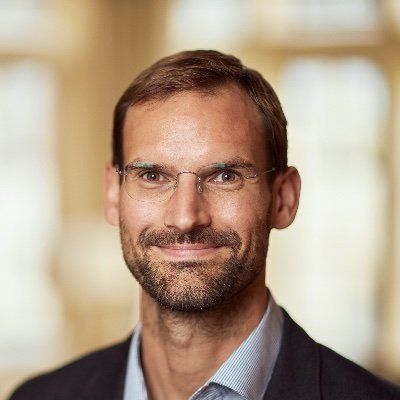 While the rise of non-standard employment and its consequences for people in such forms of employment are well documented, there is little evidence (1) on how common non-standard employment is in households with children and (2) on the extent to which the adverse consequences of non-standard employment for parents are further transmitted to their children. We address both these questions, leveraging the large sample and rich information collected by the German Microcensus.
While the rise of non-standard employment and its consequences for people in such forms of employment are well documented, there is little evidence (1) on how common non-standard employment is in households with children and (2) on the extent to which the adverse consequences of non-standard employment for parents are further transmitted to their children. We address both these questions, leveraging the large sample and rich information collected by the German Microcensus.
Our findings suggest that the temporal dimension of parental employment is key to understanding how changing labor markets reshape the opportunity structure for children from disadvantaged parental backgrounds and the intergenerational transmission of inequality.
TO FIND OUT MORE
Comparing the social economic & cultural impact of Covid-19 on Europeans with high-quality survey data

 Image Fabio Mitidieri (via Shutterstock)
Image Fabio Mitidieri (via Shutterstock)
Comparing the social, economic and cultural impact of Covid-19 on Europeans
with high-quality survey data
Workshop - 9th of December 2021
Observatoire Sociologique du Changement, Sciences Po,
On-site (Paris) – Also in hybrid format via Zoom
This workshop gathers social researchers from four countries (France, Germany, Italy and the UK) who uniquely followed representative samples of national population during the Covid-19 pandemic tracking continuities and changes in social life and attitudes. Drawing on panel or panel-like datasets, we particularly aim to assess whether the pandemic altered pre-existing social inequalities or created new cleavages.
The workshop will mainly address four issues: health and well-being; work and economic conditions; gender and generational relations; and social attitudes. Each research team will present national findings with a view to a preliminary meta-analysis and a possible more integrated comparative take on the issues at stake in a future publication.
Participating teams
- France: Researchers of the ‘Coping with Covid’ project (OSC/Sciences Po)
- Germany: Researchers of the Mannheim Corona study (University of Mannheim)
- UK: Researchers of Understanding Society (University of Essex) and British Social Attitudes (Natcen)
- Italy: Researchers of the ResPOnsE study (University of Milan)

Workshop program
- 8.45 Welcome and introduction to the workshop
Ettore Recchi (director, CoCo project) - 08.50-9.15 Focus on our data (one researcher per dataset)
- 9.15-10.45 Session 1: The impact on health and well being
Marta Pasqualini & Ettore Recchi (OSC), Elias Naumann (Mannheim), Alita Nandi (Essex), Francesco Molteni (Milan)
Coffee break
- 11.00-12.30 Session 2: The impact on work and economic conditions
Andrew Zola & Katharina Tittel (OSC), Katja Moehring (Mannheim), Piotr Marzec (Essex), Marco Maraffi & Marta Moroni (Milan)
Lunch break
- 14-15.30 Session 3: The impact on gender and generational relations
Marta Dominguez Folgueras & Marta Pasqualini (OSC), Maximiliane Reifenscheid & Katja Moehring (Mannheim), Anne McMunn (UCL), Giulia Dotti Sani (Milan)
Coffee break
- 15.45-17.15 Session 4: The impact on social attitudes
Emanuele Ferragina & Andrew Zola (OSC), Elias Naumann & Katja Moehring (Mannheim), John Curtice & Dominic Abrams (Natcen), Ferruccio Biolcati Rinaldi, Riccardo Ladini, Nicola Maggini Francesco Molteni (Milan)
17.15-18.00 Final discussion: advancing a comparative perspective, plans for publication
This workshop is intended for a limited audience.

Suggestion of Papers
- Ethnic disparities in health & social care workers’ exposure, protection, and clinical management of the COVID-19 pandemic in the UK [LINK]
- Is Democracy Effective against Coronavirus? An Analysis of Citizens' Opinions in Italy [LINK]
- Pandemic’s effects on feelings of depression in Italy: The role of age, gender and individual experiences during the first lockdown [LINK]
- Is the Recession a ‘Shecession’? Gender Inequality in the Employment Effects of the COVID-19 Pandemic in Germany [LINK]
- New values, new divides? The impact of the COVID-19 pandemic on public attitudes [LINK]
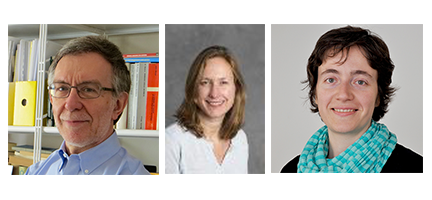
Concours chercheurs CNRS 2022
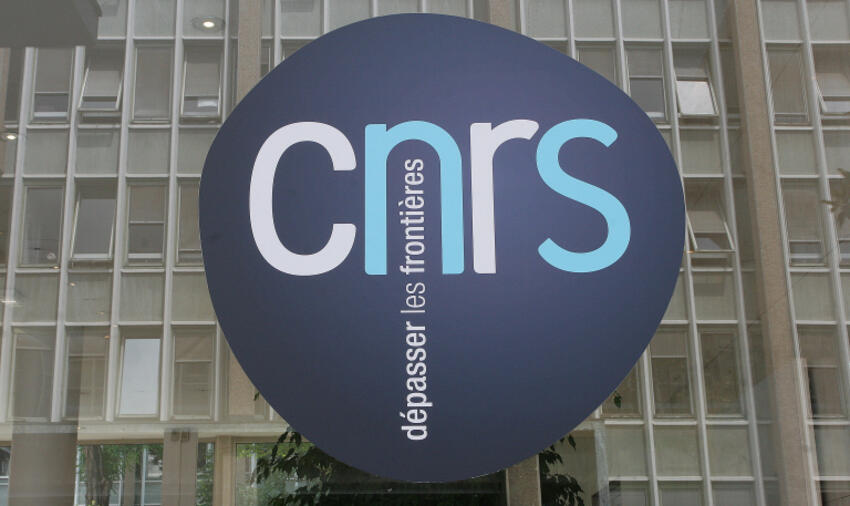
 Image Nicole Tiget (Photothèque CNRS)
Image Nicole Tiget (Photothèque CNRS)
Dans l'objectif de préparer le concours chercheurs et chercheuses (CR) du CNRS 2022 dont la campagne débutera en fin d'année, les candidat·e·s peuvent bénéficier du soutien de l'Observatoire sociologique du changement - UMR 7049.
L’OSC est un centre de recherche en sociologie associant Sciences Po et le CNRS (sections 36 et 40), rattaché au Département de sociologie de Sciences Po. L’ OSC développe une recherche de pointe sur la stratification et les inégalités sociales.
Son programme de recherche poursuit 3 objectifs :
- mesurer et comparer l'évolution des inégalités sociales dans les sociétés contemporaines
- analyser les mécanismes des inégalités sociales à plusieurs niveaux
- contribuer à l’analyse des politiques publiques.
Les travaux des chercheurs et des chercheuses de l’OSC couvrent une diversité de domaines : le genre, l'origine, le milieu social, l'éducation, la ségrégation urbaine, la famille, le rôle de l'état et ses politiques sociales, les mobilités et les migrations, les pratiques culturelles, les usages du numérique, l'environnement, le marché du travail.
L’ancrage dans une sociologie empirique, l'ouverture interdisciplinaire, la rigueur théorique et méthodologique, le respect de l'autonomie des personnels académiques constituent les piliers de sa politique scientifique.
L'OSC se distingue par son engagement dans la formation à la recherche en poursuivant depuis sa création un même objectif : former des sociologues de haut niveau, en phase avec les développements théoriques et méthodologiques les plus récents de la discipline.
Les candidat·e·s sont invité·e·s à prendre rendez-vous avant le 30 novembre avec la directrice de l'unité, Mirna Safi (mirna.safi@sciencespo.fr), avec en copie la Secrétaire générale (marie.ferrazzini@sciencespo.fr) en joignant un CV et un descriptif de leur projet de recherche.
Le Conseil du laboratoire statuera sur les demandes. Une présentation orale pourra être programmée.
L'unité sera particulièrement sensible aux projets traitant des inégalités environnementales et de santé.
Autour de l'ouvrage de Philippe Coulangeon
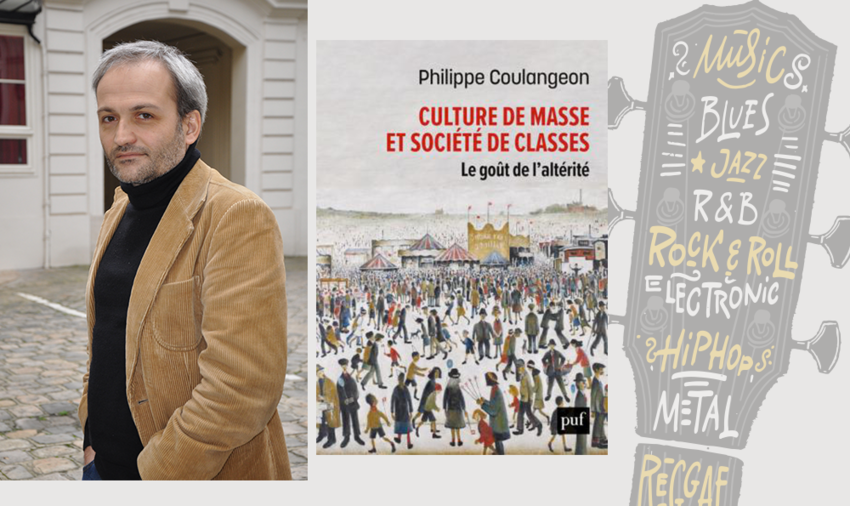
 Crédits: Thomas Arrivé (ScPo), UK Goverment Art coll., visiostyle/Shutterstock
Crédits: Thomas Arrivé (ScPo), UK Goverment Art coll., visiostyle/Shutterstock
Table ronde autour du dernier ouvrage de Philippe Coulangeon
(Directeur de recherche CNRS, Sciences Po - OSC)
Culture de masse et sociétés de classe. Le goût de l'altérité
Puf, septembre 2021, 369 p.
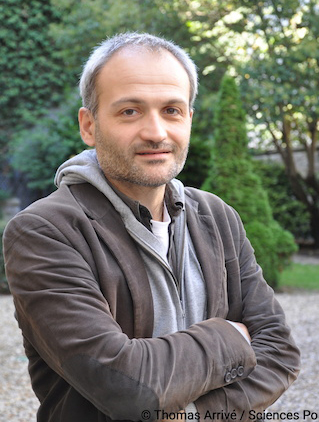
Séance animée par Nicolas Duvoux (Professeur, Université Paris 8 - CRESPPA).
Discutants : Pierre François (DR CNRS, Sciences Po - CSO, Directeur de l'École de la recherche) et Agnès van Zanten (DR CNRS, Sciences Po - OSC).
Mercredi 17 novembre 2021 de 10h30 à 12h30, Salle Percheron, 98 rue de l'Université 75007 Paris (publics internes à Sciences Po). Une retransmission via Zoom (publics externes) pourra être mise en place en fonction des demandes.
L'inscription est obligatoire en suivant ce lien.
Conséquences sociales et culturelles de l'expansion scolaire ; diversification des goûts et des pratiques culturelles, recul de la distinction savante ; recomposition des structures sociales, brouillage des frontières symboliques entre classes... Consultez la table des matières de l'ouvrage.
Mothering While Black: Raising African American Boys and Girls and Confronting Gendered Racism

 Image vystekimages (via shutterstock)
Image vystekimages (via shutterstock)
Mothering While Black: Raising African American Boys and Girls and Confronting Gendered Racism
Dawn M. Dow
Associate Professor, University of Maryland
Friday 12th November, 2:30 pm - 4 pm (OSC location for internal audience or online via Zoom)
Recent events have underscored the harsh and, at times, tragic consequences of gendered racism-racial discrimination that varies based on gender- for African American children in the U.S. How do African American middle-class mothers address these challenges?
Through in-depth interviews with African American middle- and upper-middle-class mothers, Dr. Dow will discuss how gendered racism influences these mothers' concerns for their sons and daughters and how it influences how they approach parenting their children. Dr. Dow describes how for their sons, mothers were principally concerned with preventing perceptions of them as criminals or "thugs" and protecting their physical safety. By contrast, mothers were principally concerned with protecting and building their daughters' self-esteem and self-value. Mothers used different strategies to help their sons and daughters navigate these challenges.
These mothers' experiences illuminate how they prepare their children for the different societal reception they believe their sons and daughters will encounter and shed light on the work needed to build racial empathy and understanding in the contemporary era.
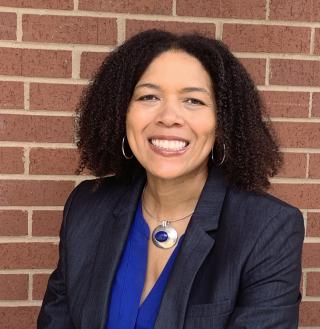 Dr. Dawn M. Dow is an Associate Professor of Sociology at the University of Maryland, College Park, a Faculty Associate in the Maryland Population Research Center, the deputy editor for the Journal of Marriage and Family, and an editorial board member of Contexts.
Dr. Dawn M. Dow is an Associate Professor of Sociology at the University of Maryland, College Park, a Faculty Associate in the Maryland Population Research Center, the deputy editor for the Journal of Marriage and Family, and an editorial board member of Contexts.
From 2019-2021 she served as the faculty director of the Critical Race Initiative. Dr. Dow received a Ph.D. in sociology from the University of California, Berkeley, and earned a J.D. from Columbia University, School of Law.
Her research examines intersections of race, class, and gender within the context of the family, educational settings, the workplace, the law, and political mobilization.
She is the author of the award-winning book Mothering While Black: Boundaries and Burdens of Middle-Class Parenthood (2019), published by the University of California Press. Dr. Dow's work has appeared in journals including Gender & Society, Journal of Marriage and Family, Sociology of Race & Ethnicity, Science Advances, and Mobilization.
Registration is compulsory. Thank you.
Higher Education and Elite Business Schools:
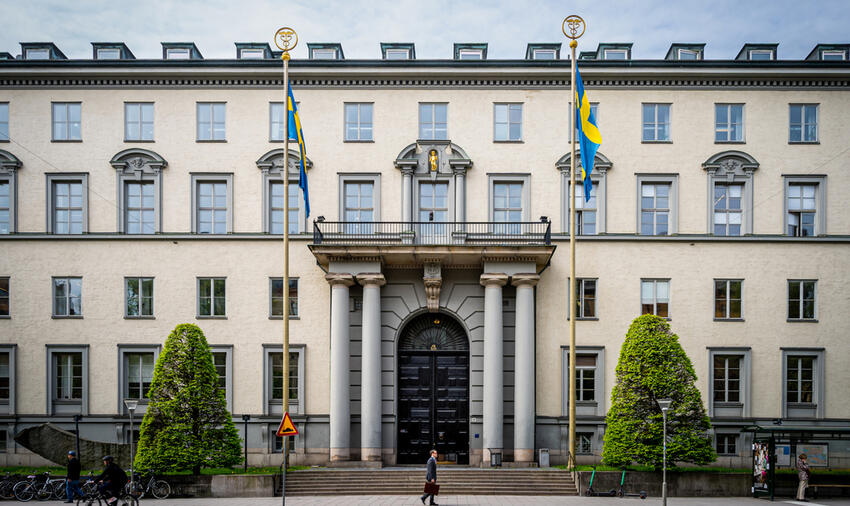
 Image Per Bogue (via Shutterstock)
Image Per Bogue (via Shutterstock)
Higher Education and Elite Business Schools:
The Case of Anticipatory Socialization in Student Unions
Mikael Holmqvist
Professor, Stockholm Business School (Stockholm University)
Wednesday 27th October, 11:30 am - 1 pm (OSC location for internal audience or online via Zoom)
Discussants: Caroline Bertron (University Paris 8 - Cresppa-CSU) & Bruno Cousin (Sciences Po - CEE)
 Business schools and management education are dominating much of higher education in many countries today, resulting in the spread of corporate ideas and values throughout societies; still these institutions remain relatively unexplored in terms of the way they socialize their students. A particularly interesting group are “elite business schools”, i.e., the places where future business and financial elites are made – the future leaders of the neo-liberal economy.
Business schools and management education are dominating much of higher education in many countries today, resulting in the spread of corporate ideas and values throughout societies; still these institutions remain relatively unexplored in terms of the way they socialize their students. A particularly interesting group are “elite business schools”, i.e., the places where future business and financial elites are made – the future leaders of the neo-liberal economy.
In this talk I examine the way students at Sweden’s premier business school, The Stockholm School of Economics, are educated and consecrated as elites through “anticipatory socialization” in student union activities.
Data come from a variety of sources, such as interviews with students and students’ own descriptions on websites.
It is argued that extracurricular activities constitute important socializing practices in creating and re-producing economic elites by business schools, perhaps more importantly than what is taught in classrooms and lecture halls.
Last publication: "Economics as symbolic capital: The consecration of elite business schools", Theory and Society, 2021.
Registration is compulsory. Thank you.
The RECORDS project - Revisiting the sociology of taste in the age of big data

 Image Rawpixel (via Shutterstock)
Image Rawpixel (via Shutterstock)
OSC joint Scientific Seminar with Sciences Po, Department of Sociology
Friday 19th November 2021, 12:30 pm - 2:30 pm
(Hybrid meeting, location 98 rue de l'Université, Paris 7e, for internal audience and online via Zoom)
The RECORDS project - Revisiting the sociology of taste in the age of big data
Philippe Coulangeon
CNRS Senior Researcher, Sciences Po - OSC
with project partners : Thomas Louail (UMR Géographie-cités, scientific coordinator), Robin Cura (UMR Géographie-cités), Jean-Samuel Beuscart (Orange Labs), Samuel Coavoux (LSQ-CREST), Camille Roth (Centre Marc Bloch), Yann Renisio (OSC), Amélie Beaumont (OSC)
 What does streaming do to our music listening? What do the big data collected by the platforms say about our listening behaviors and tastes? How are content consumption and listening practices evolving in an era of abundant supply and recommendation? Does hyperchoice give rise to very dissimilar individual paths? Do platforms essentially favor listening to accompany daily activities, organized by playlists? Do digital traces allow us to revisit the models and theories of the sociology of cultural practices?
What does streaming do to our music listening? What do the big data collected by the platforms say about our listening behaviors and tastes? How are content consumption and listening practices evolving in an era of abundant supply and recommendation? Does hyperchoice give rise to very dissimilar individual paths? Do platforms essentially favor listening to accompany daily activities, organized by playlists? Do digital traces allow us to revisit the models and theories of the sociology of cultural practices?
The RECORDS project proposes to combine survey and big data to study these questions from an empirical material of unprecedented diversity and scope. It is based on an original partnership between social sciences and digital sciences researchers, and one of the major companies in music distribution in France (Deezer).
In addition to a general presentation of the main research axes of this project, the presentation will give an overview of its first results.
Registration is mandatory (for Zoom users the link will be sent one day before)
More information here about the project and the team (Thomas Louail, UMR 8504 Géographie-cités),
Breaking down the privilege of desire. Gender and class inequalities in the socialization processes to sexual desire

 Image Vasiliy Koval (via Shutterstock)
Image Vasiliy Koval (via Shutterstock)
OSC Scientific Seminar 2021-2022
Friday 22th October 2021, 11:30 am / 13 pm (register link)
98 rue de l'Université - Salle Percheron
Breaking down the privilege of desire.
Gender and class inequalities in the socialization processes to sexual desire
Rébecca Lévy-Guillain
PhD Sciences Po - OSC & INED
Why do men desire more than women? And why do some women desire more than others?
In contrast to the dominant disciplinary approaches of neuroscience or sexology, desire is questioned from a sociological point of view and is defined as a social activity and more precisely as a bodily, contextual and relational experience, associated with erotic mental projections organized in the form of scripts, that is to say scenarios symbolically encoded as sexual. Based on biographical interviews conducted with women and men with diverse social profiles, the presentation details the mechanisms that produce gender and class inequalities by tracing the socialization processes that unfold during childhood and teenage years on the one hand, and by characterizing the social groups that are privileged in matters of desire on the other.
Registration is mandatory to join us. Thank you.
Genetic Influences on Educational Attainment across 20th Century Birth Cohorts:

 Image Rob Marmion (via Shutterstock)
Image Rob Marmion (via Shutterstock)
OSC Scientific Seminar 2021-2022
Friday 15th October 2021, 11 am / 12 pm (register link)
Genetic Influences on Educational Attainment across 20th Century Birth Cohorts:
the Role of Parental Separation and Death in the United States
Tina Baier
University of Oslo
Whether environmental conditions provided by parents affect children’s chances to reach their genetic potential for education remains an open question. Previous research mainly considers parents’ socio-economic standing and overlooks a key dimension of social stratification: childhood family structure.
We address this gap by asking three research questions:
- does parental separation lower genetic influences on education,
- are there birth cohort differences, and
- are genetic influences among those who lost a parent more similar to those whose parents separated or those who remained coupled?
This study draws on the US Health and Retirement Study (HRS) to estimate the association between education polygenic scores and adults’ educational attainment by childhood family structure across the 20th Century.
We find that genetic effects on education are smaller for adults whose parents separated than adults whose parents remained married. Moreover, the magnitude of genetic influences remained rather constant across time for adults from two-parent households but decreased for adults whose parents separated.
Additionally, the impact of genes for adults who lost a parent is similar to those who grew up in two-parent households. This suggests that family instability rather than parental absence suppresses genetic influences on education among those whose parents separated.
Sorry, but due to pandemic crisis, this event is only open to internal audience.
Assimilation and racialization?

 Oslo Central Station, Benjamin Olsen (via Shtutterstock)
Oslo Central Station, Benjamin Olsen (via Shtutterstock)
OSC Scientific Seminar 2021-2022
Friday 1st October 2021, 11:30 am / 1:00 pm (Zoom videoconference)
Assimilation and racialization?
Incorporation patterns among descendant of migrants in Norway
Arnfinn Haagensen Midtbøen
Associate Professor in Sociology, University of Oslo
 Comparative research paints a contradictory picture of long-term integration processes. In line with theories of assimilation, descendants of immigrants have higher educational and occupational attainment compared to their immigrant parents. However, in line with theories of racialization, there is a striking stability in patterns of racism and discrimination over time and immigrant generations.
Comparative research paints a contradictory picture of long-term integration processes. In line with theories of assimilation, descendants of immigrants have higher educational and occupational attainment compared to their immigrant parents. However, in line with theories of racialization, there is a striking stability in patterns of racism and discrimination over time and immigrant generations.
While these outcomes are often seen as mutually exclusive in theory, this talk addresses the question of whether they are connected in ways not properly understood. In discussing this question, I draw on recent and ongoing work on the achievements and experiences of descendants of migrants in Norway, based on rich set of data sources (official registries, surveys, field experiments and in-depth interviews).
I demonstrate that an ongoing process of structural assimilation indeed occurs in Norway. However, I also show that descendants of migrants face discrimination at a level equal to individuals that have themselves migrated, that those who have entered high-status occupations are more likely to report discrimination at the work place compared to individuals in low-status occupations, and that descendants of migrants are concentrated in specific locations in the occupational class structure.
Connecting these pieces of evidence, I argue that we need both a more multifaceted model of assimilation, and that we must explore more carefully how assimilation can be the result of how descendants of migrants strategically navigate a situation in which discrimination is likely to occur.
Registration is mandatory to join the Zoom meeting (the link will be sent one day before)
Culture de masse et société de classes

 Images WiP-studio (via Shutterstock) et PUF
Images WiP-studio (via Shutterstock) et PUF
Culture de masse et société de classes. Le goût de l'altérité
Philippe Coulangeon, Directeur de recherche CNRS (Sciences Po - OSC)
Presses universitaires de France, septembre 2021, 368 p.
Présentation débat autour de l'ouvrage, mercredi 17 novembre 2021 à 10h30 (Salle Percheron, 98 rue de l'Université pour les publics internes et sur Zoom - à confirmer).
 Ce livre trouve son origine dans un intérêt ancien pour les questions liées à la composante culturelle des inégalités sociales et des rapports de classes. Il entend à ce titre défendre la portée analytique de la notion de classe sociale (...) dans un contexte où elles apparaissent pourtant moins clairement identifiées que par le passé à des cultures de classes unifiées et cohérentes. Ce brouillage des frontières symboliques entre les classes sociales, qui n'implique pas la réduction des inégalités au chaos anarchique des rivalités individuelles, trouve son origine dans une série de facteurs qui tiennent notamment aux transformations des modes de production et de circulation des biens et services culturels et à la diffusion de l'éducation.
Ce livre trouve son origine dans un intérêt ancien pour les questions liées à la composante culturelle des inégalités sociales et des rapports de classes. Il entend à ce titre défendre la portée analytique de la notion de classe sociale (...) dans un contexte où elles apparaissent pourtant moins clairement identifiées que par le passé à des cultures de classes unifiées et cohérentes. Ce brouillage des frontières symboliques entre les classes sociales, qui n'implique pas la réduction des inégalités au chaos anarchique des rivalités individuelles, trouve son origine dans une série de facteurs qui tiennent notamment aux transformations des modes de production et de circulation des biens et services culturels et à la diffusion de l'éducation.
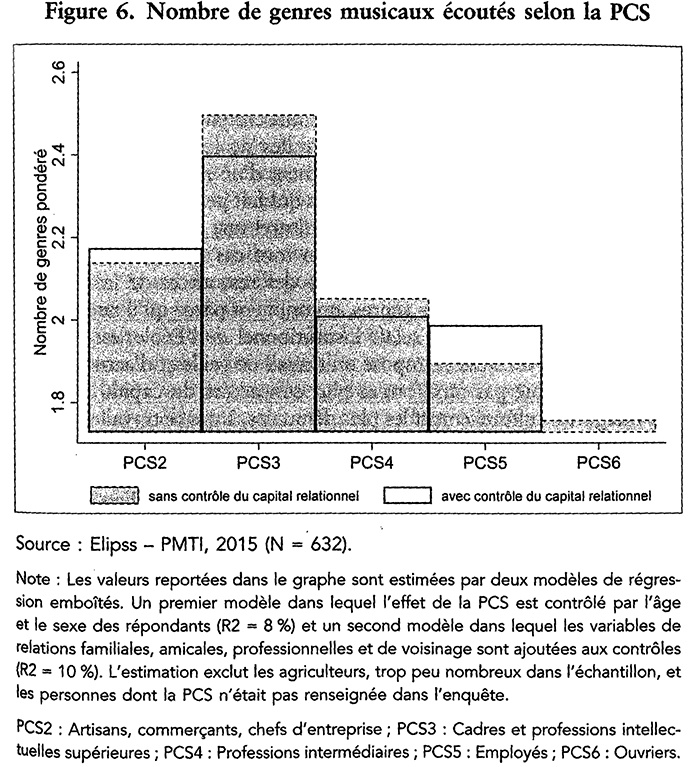 SOMMAIRE
SOMMAIRE
Introduction
De la culture comme identité à la culture comme ressources
Le brouillage des frontières culturelles et politiques entre classes
Les mutations de l'économie des ressources culturelles
Le capital culturel au XXIème siècle
Une société de classes sans culture de classes ?
Chapitre 1 - Culture et inégalité
Qu'est-ce qu'une inégalité culturelle
Du relativisme au culturalisme - Désirabilité et légitimité - Inégalité d'accès et inégalité de traitement
Culture, stratification sociale et rapports de classe
La stratification sociale de l'accès aux ressources - La superstructure culturelle des rapports de classe - La culture comme frontière et comme marqueur de statut - Volume et structure des capitaux
Chapitre 2 - La culture comme capital
Capital culturel et handicap scolaire
Arbitraire culturel et « violence symbolique »
La supériorité empirique des usages faibles du concept de capital culturel
Chapitre 3 - Un siècle d'expansion scolaire et de diffusion culturelle
Les conséquences sociales et culturelles de la diffusion de l'éducation
Un décalage transatlantique
La pluralité des modèles d'expansion : école de masse et écoles de classes
Chapitre 4 - Expansion scolaire et inégalités
Les trois dimensions de l'inégalité scolaire
La réduction incertaine de l'inégalité globale de la distribution des ressources éducatives - L'inertie du biais socioculturel de l'école - Les forces de rappel de l'origine
L'érosion de la rente scolaire et culturelle
L'inflation des diplômes - L'affaiblissement du magistère culturel de l'école
Chapitre 5 - Les fonctions émancipatrices de l'expansion scolaire en question
L'investissement éducatif au coeur de l'accumulation
Éducation et croissance - Rendements sociaux et financement public
L'éducation et la culture, arguments du bien-être individuel et collectif
Le salut scolaire à l'épreuve des théories critiques de l'École
L'École capitaliste - L'éducation au service de l'accaparement des opportunités - Qui trop éduque mal intègre ?
Les théories critiques de l'expansion scolaire au défi de ses effets
La robustesse des effets sui generis de l'éducation - L'effet compensateur des transferts culturels
Chapitre 6 - Le savant, le populaire et le mélange des genres
La métaphore de l'omnnivore
Un tropisme musical - Ouverture culturelle et distance sociale entre les répertoires
L'essor controversé d'un contre-modèle
Des formes éclectiques de la distinction culturelle - Des élites sans élitisme
Le recul de la distinction savante
Socialisation plurielle et éclectisme
Chapitre 7 - Les formes émergentes du capital culturel
Un capital multiculturel
Capital savant et capital technique
Capital culturel et réflexivité
La politique culturelle au défi de la redéfinition des clivages
Chapitre 8 - La recomposition des structures sociales du goût et des attitudes culturelles
Une mise à l'épreuve empirique de la portée du syncrétisme des goûts musicaux
Légitimité académique et légitimité éclectique
Chapitre 9 - L'ouverture à la diversité à l'épreuve des inégalités
Ouverture culturelle et rapports de classe
La gentrification comme relation de pouvoir et instrument paradoxal de l'entre-soi - Le capital multiculturel au risque de l'approriation
La déhiérarchisation incertaine des répertoires culturels
L'asymétrie des échanges symboliques entre les groupes sociaux - Les ambiguïtés du relativisme culturel - Les ressources relationnelles de l'ouverture - Un capital versatile inégalement accessible
Chapitre 10 - L'ouverture politique et culturelle comme horizon de la légitimité
Les avatars du vote de classe
Aux origines du vote « non naturel » - Les déterminants sociaux de l'ouverture à l'altérité
Le moteur générationnel du changement
De la révolution silencieuse au backslash conservateur - La structure générationnelle des changements culturels - Le double visage de l'expansion éducative
Chapitre 11 - Normes politiques, normes culturelles et normes morales
Le libéralisme culturel et son double
Quatre profils d'attitudes politiques
La superposition imparfaite des clivages hétérogènes
A lire au fil de la conclusion (extraits)...
- La massification scolaire, partout où elle s'est produite, a exercé des effets modestes et incertains sur la dynamique historique des inégalités. La diffusion de l'éducation ne s'est pas toujours accompagnée d'un réduction substantielle de l'inégalité sociale des chances d'accès aux différents niveaux de diplômes et de l'inégalité sociale des performances scolaires, frappées l'une et l'autre d'une assez forte inertie...
- Par ailleurs, l'école n'a favorisé la plupart du temps qu'un accroissement limité de la mobilité sociale au regard du rôle que lui prêtaient les doctrines de la méritocratie scolaire.
- Les changements associés à l'intensification et à la diversification de la production et des échanges culturels [analysés dans l'ouvrage] décrivent des sociétés traversées par des clivages culturels qui correspondent de moins en moins à l'opposition traditionnelle des registres savants et populaires mais de manière croissante au clivage entre l'ouverture et la fermeture à la diversité culturelle.
- Les transformations culturelles observées plus particulièrement depuis les années 80 au sein de la société française procèdent ainsi plus largement d'une inversion historique de la relation entre la distance symbolique et la distance physique entre groupes sociaux.
POUR EN SAVOIR PLUS
Site de l'éditeur (PUF)
Page de Philippe Coulangeon
Entretien sur France Culture (1er octobre, podcast, La Suite dans les idées par Sylvain Bourmeau)
Aux frontières de l’école : les choix parentaux en matière d’instruction alternative

 Image Eugenio Marongiu (via Shutterstock)
Image Eugenio Marongiu (via Shutterstock)
Soutenance de thèse, le jeudi 21 octobre 2021 à 14h00 à l'École de la recherche de Sciences Po (accès limité).
Jury
Marta Dominguez Folgueras (Associate Professor, Sciences Po - OSC, Directeur de recherche), Géraldine Farges (Maîtresse de conférence, Université de Bourgogne - IREDU), Pascale Garnier (Professeure des universités, Université Sorbonne Paris Nord - Experice), Claude Martin (DR CNRS, EHESP), Laura Merla (Professeure, UCLouvain), Agnès van Zanten (DR CNRS, Sciences Po - OSC, Directeur de recherche)
 Ces dernières années, deux modalités relevant de l’éducation scolaire privée, encore peu répandues jusqu’à présent en France, connaissent une certaine popularité : l’instruction à domicile et l’école privée hors contrat « alternative ».
Ces dernières années, deux modalités relevant de l’éducation scolaire privée, encore peu répandues jusqu’à présent en France, connaissent une certaine popularité : l’instruction à domicile et l’école privée hors contrat « alternative ».
Le nombre d’enfants scolarisés dans des écoles privées hors contrat (premier degré), dont font partie les écoles alternatives, a été multiplié par 3,22 entre 2010 et 2019, un chiffre qui reste cependant marginal rapporté à l’ensemble des enfants scolarisés en France (0,23% en 2010 contre 0,75% en 2019).
Le nombre d’enfants instruits en famille est en augmentation de 111,11 % en 2018-2019 par rapport à l’année 2014-2015, selon une étude récente, mais qui pourrait les sous-estimer. 61% des enfants concernés étaient âgés de 6-10 ans et 39% de 11-16 ans.
Mais qu'est-ce qui conduit les parents à choisir une scolarité non conventionnelle pour leur(s) enfant(s) ? Quelles sont les conditions sociales pour s'engager dans un choix d’instruction « alternative » ?
En partant des enfants actuellement scolarisés à domicile et/ou inscrits dans des écoles dites « alternatives », cette thèse s'intéresse aux parcours biographiques de leurs parents. Elle propose une approche qui réunit la sociologie de l'éducation et la sociologie de la famille afin de comprendre comment les normes qui régissent l'espace familial ont un impact sur les choix éducatifs et, en retour, comment ces choix ont un impact sur les parents.
In recent years, two little-used private schooling options have been developing in France : homeschooling and "alternative" schooling, independent from the State.
The number of children enrolled in independent schools (primary level) increased by a factor of 3.22 between 2010 and 2019, a figure that remains marginal in relation to the total number of children enrolled in France (0.23% in 2010 versus 0.75% in 2019).
The number of homeschooled children is also up by 111.11 percent in 2018-2019 compared to 2014-2015, according to recent figures from the government-led impact study, although these figures remain imperfect and may be underestimated.
But what leads parents to choose non-conventional schooling for their child(ren) ? What are the social conditions for engaging in an "alternative" schooling choice ?
Starting with children currently homeschooled and/or enrolled in so-called "alternative" schools, this thesis focuses on the biographical paths of their parents. It proposes an approach that brings together the sociology of education and the sociology of the family in order to understand how the norms that govern the family space impact on educational choices and, in turn, how these choices have an impact on the parents.
Ségrégation urbaine et choix du collège

 Image LeManna (via Shutterstock)
Image LeManna (via Shutterstock)
Ségrégation urbaine et choix du collège :
quelles contributions à la ségrégation scolaire ?
Béatrice Boutchénik, Pauline Givord, Olivier Monso
Revue économique, 2021, vol. 72, n° 5, p. 717 à 747
Le système scolaire français fournit une illustration intéressante de l’impact du choix scolaire sur la ségrégation entre établissements, car il combine une affectation géographique assez stricte des élèves dans les collèges publics, avec l’existence d’établissements privés financés par l’État, non soumis à la carte scolaire.
En utilisant une approche d’équilibre partiel, les résultats empiriques de l'article donnent une mesure des contributions relatives de la ségrégation urbaine et du choix du collège sur la ségrégation scolaire pour trois zones urbaines françaises : Bordeaux, Clermont-Ferrand et Paris. En utilisant les limites précises des secteurs de recrutement scolaire et les données administratives sur les élèves inscrits, il a été possible d’identifier, pour chaque élève, le collège public dans lequel il aurait dû être inscrit selon la règle d’affectation, et le collège qu’il fréquente effectivement.
On peut comparer le degré de ségrégation scolaire qui serait observé si tous les élèves étaient inscrits dans le collège public de leur quartier au degré réel de ségrégation sociale dans les collèges. La différence entre la ségrégation résidentielle et la ségrégation scolaire indique dans quelle mesure le choix des familles de ne pas fréquenter leur collège public de secteur aggrave ou, au contraire, atténue l’impact de la ségrégation résidentielle sur la ségrégation scolaire. L'article détaille les deux principaux mécanismes opposés qui peuvent expliquer cette relation : effets de « réallocation » et d’« évitement ».
Sur le plan méthodologique, cet article propose un nouvel outil pour décomposer les indices de ségrégation, en s’appuyant sur une mesure couramment utilisée, l’indice d’entropie normalisé, version normalisée de l’indice d’information mutuelle.
Les résultats confirment que dans les trois villes, le niveau de ségrégation observé entre collèges reflète en grande partie le niveau de ségrégation urbaine. Cependant, les possibilités de choix scolaire, et notamment l’inscription dans les collèges privés, contribuent à réduire encore la mixité sociale dans les collèges de ces trois villes.
Le fait que certains parents évitent le collège de secteur contribue pour 37 % à 49 % au niveau de ségrégation dans les collèges, selon la ville considérée, résultat essentiellement déterminé par l’évitement vers l’enseignement privé.Si la mixité sociale se détériore dans les collèges publics évités, la polarisation sociale entre collèges privés est également marginalement plus élevée (et dans le cas de Paris, significativement plus élevée) que celle observée au niveau local.
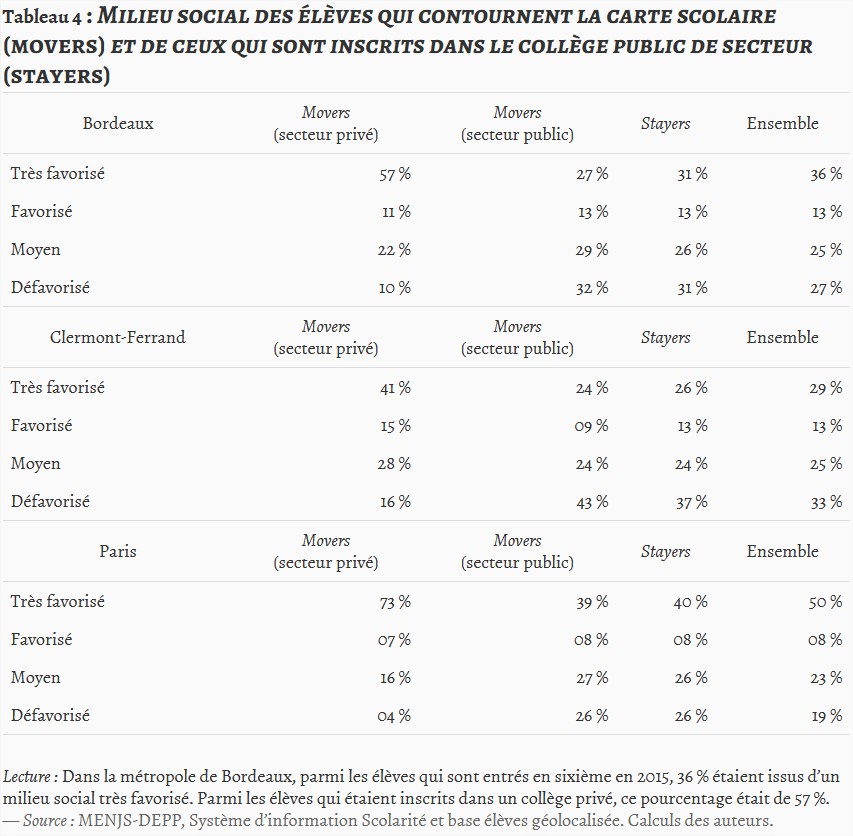 Ces estimations empiriques statiques suggèrent que dans le contexte actuel, les pratiques de contournement de la carte scolaire sont étroitement liées au milieu socio-économique et au lieu de résidence des familles, et sont un mécanisme déterminant de la ségrégation scolaire.
Ces estimations empiriques statiques suggèrent que dans le contexte actuel, les pratiques de contournement de la carte scolaire sont étroitement liées au milieu socio-économique et au lieu de résidence des familles, et sont un mécanisme déterminant de la ségrégation scolaire.
Subjective wellbeing in rural and urban areas under the Covid-19 crisis in France

 Image sun ok (via Shutterstock)
Image sun ok (via Shutterstock)
OSC Scientific Seminar 2021-2022
Friday 24th September 2021, 11:30 am / 1:00 pm (Zoom videoconference)
Subjective wellbeing in rural and urban areas under the Covid-19 crisis in France
Marta Pasqualini
Post-Doc Research Fellow, Sciences Po - OSC
 The difference between urban and rural areas, in terms of standard of living, is still being debated. If, on one hand, cities offer higher job opportunities, leisure activities, and cultural events, they are also characterized by higher cost of living, higher levels of pollution, and greater wealth inequality.
The difference between urban and rural areas, in terms of standard of living, is still being debated. If, on one hand, cities offer higher job opportunities, leisure activities, and cultural events, they are also characterized by higher cost of living, higher levels of pollution, and greater wealth inequality.
The Covid-19 pandemic, imposing everyone to be locked down at home, might have increased the relevance of living spaces by (re)opening urban-rural differences in subjective wellbeing.
By using a probability-based panel study, consisting of 1,404 individuals, we explored changes in subjective well being (SWB) over time, from the pre-pandemic period (2019) to about one year of lockdown (April 2021).
In addition, we investigated between-individuals differences based on rural-urban differential factors (i.e., compositional factors) and within-individuals differences based on events that have been experienced during the pandemic period (i.e., contextual factors).
Registration is mandatory to join the Zoom meeting (the link will be sent one day before)
Care earnings in the US and 24 European countries

 Image JP Wallet (via Shutterstock)
Image JP Wallet (via Shutterstock)
Care earnings in the United States and 24 European countries:
The role of social policy and labour market institutions
Emanuele Ferragina (Sciences Po, OSC & LIEPP)
Zachary Parolin (Bocconi University Milano and Columbia University)
Social Policy & Administration
First Published 08 September 2021 - Available online (Wiley Online Library)

 Care occupations are gendered and remain relatively poorly paid, particularly in the United States. Prior research on the ‘care penalty’ primarily points to individual, relational, and market-valuation factors in explaining the relative earnings of care workers.
Care occupations are gendered and remain relatively poorly paid, particularly in the United States. Prior research on the ‘care penalty’ primarily points to individual, relational, and market-valuation factors in explaining the relative earnings of care workers.
This study integrates these explanations with a comparative institutional perspective. Using higher-quality data and methods than previous comparative research in the field—that is, harmonized micro-data from the Current Population Survey and EU-SILC from 2005 to 2016, country and year fixed effects models, and a counterfactual analysis—we find that national variance in labour market and welfare state institutions explains most of the difference in the relative earnings of reproductive care workers between the United States and European countries.
Higher rates of collective bargaining coverage, stronger employment protection and welfare state spending contribute to higher relative earnings for reproductive care occupations, and lower relative earnings for high-status nurturant care occupations.
Differences in the relative earnings of care workers appear to be mostly a construct of social policy and labour market institutions rather than individual, relational, and market-valuation factors.
Classification of care occupations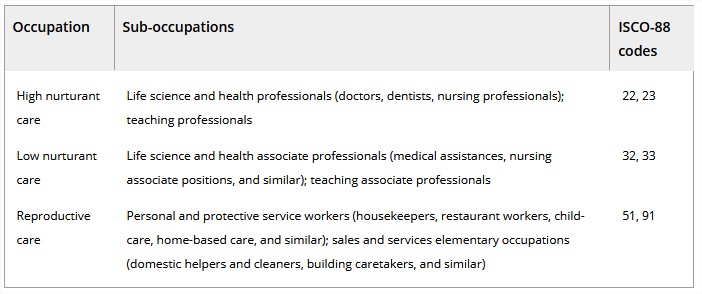
Total employment shares by occupation type and region, 2016
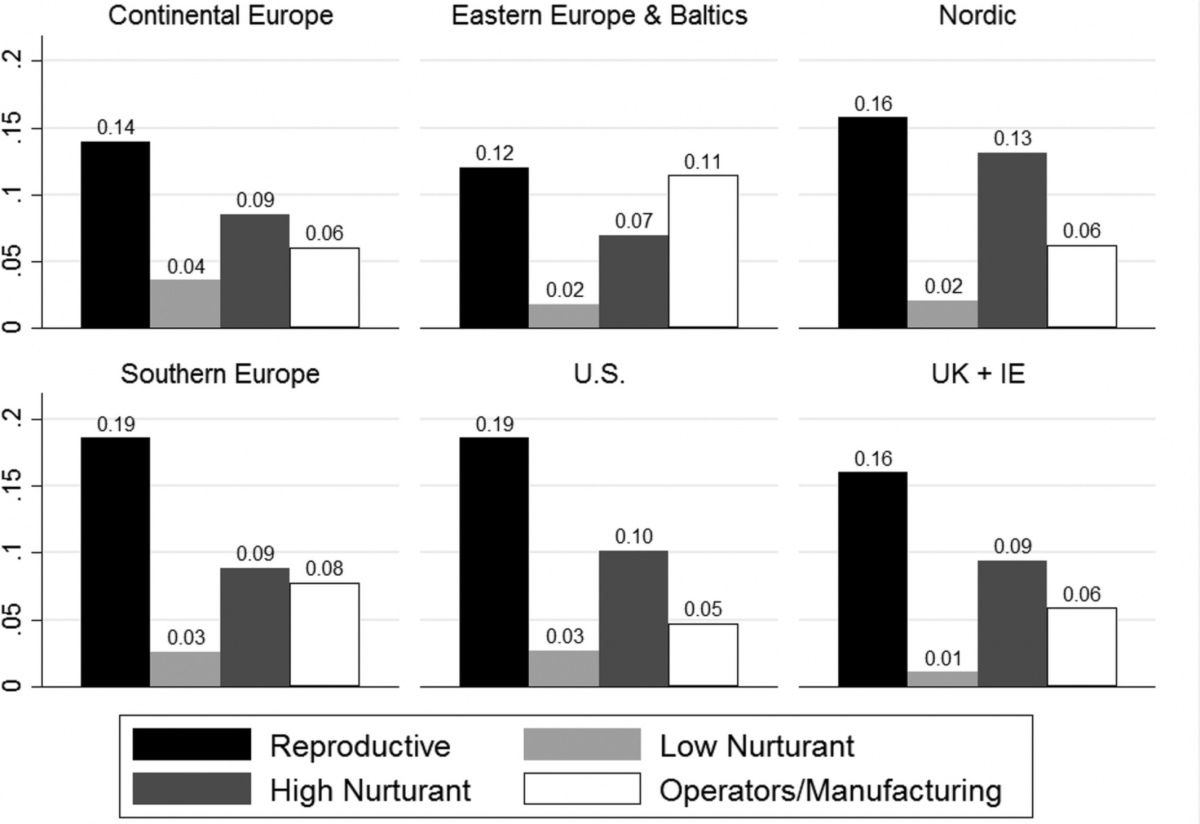
Unequal from birth: causes and consequences of socio-economic inequalities in health at birth

 Image Anek Soowannaphoom (via Shutterstock)
Image Anek Soowannaphoom (via Shutterstock)
OSC Scientific Seminar 2021-2022
Friday 10th September 2021, 11:30 am / 1:00 pm (Zoom videoconference)
Unequal from birth: causes and consequences of socio-economic inequalities
in health at birth
Lidia Panico
Chargée de recherche, INED
Socio-economic inequalities in health are well documented in the literature. Such inequalities appear to persist over time, accumulate throughout life, and seem to begin from birth.
A long standing literature has described significant socioeconomic disparities in key birth health indicators, such as prematurity and birthweight, which appear to influence health and development throughout life.
While studies are mostly based on data issued from Anglosaxon countries, a smaller literature has shown that inequalities in birth health are also evident in countries such as Italy, Sweden, Finland, and Spain, where the underlying socioeconomic stratification and health care access is significantly different.
This presentation will paint a picture of inequalities in France in birtweight, using nationally representative birth cohort data.
Using highly harmonized data, I first will compare gradients in France to those issued from the US and the UK, and analyse whether the relative importance of a set of potential mechanisms producing inequalities in birthweight varies across these three countries.
Finally, I will explore whether birthweight is correlated to a number of developmental indicators in early childhood, and explore potential mechanisms behind these relationships.
Registration is mandatory to join the ZOOM meeting (the link will be sent one day before)
What goes around meat eating, comes around

 Image kaikups - Market in Chariduar (via Shutterstock)
Image kaikups - Market in Chariduar (via Shutterstock)
PhD Defense, Wednesday 22th September 2021, 2pm (via Zoom)
Jury
Philippe Coulangeon (PhD supervisor, CNRS, OSC), Sonalde Desai (reviewer, University of Maryland), Magne Paalgard Flemmen (reviewer, Universitetet i Oslo), Christophe Jaffrelot (PhD supervisor, CNRS, CERI), Jules Naudet (CNRS, CEIAS), Divya Vaid (Jawarhalal Nehru University) Since 2010, more than two hundred cases of violence related to the sale or alleged consumption of beef or non-vegetarian products, against religious minorities and low castes, have occurred in India.
Since 2010, more than two hundred cases of violence related to the sale or alleged consumption of beef or non-vegetarian products, against religious minorities and low castes, have occurred in India.
How can food trigger such violent attacks? In a context of deep transformations of the social structure, the dissertation suggests that these incidents mirror symbolic struggles between religious and caste groups, and that they indicate the continued cultural hegemony of the Hindu high castes, of which vegetarianism is one of the most emblematic markers.
Based on secondary analysis of quantitative surveys and on fieldwork conducted in Uttar Pradesh, a region in northern India, I show how this diet remains salient in the contemporary period.
In doing so, I highlight the importance of religion and caste in food lifestyles and I uncover the mechanisms of diffusion of cultural practices, whether through processes of cultural emulation deriving from class mobility or in relation to the stigmatization of the Muslim minority.
I also highlight the plurality of repertoires of justification for vegetarianism, particularly within the most affluent and educationally endowed classes. In sum, the convergence between the different meanings attributed to this diet – ranging from religious, economic, political, dietary, and even environmental – favors the centrality of vegetarianism in the Indian social space, which in turn plays a key role in the social dynamics of status, integration and stigmatization in contemporary India.
Depuis 2010, plus de deux cent cas de violence liés à la vente ou à la consommation présumée de bœuf ou de produits non végétariens, à l'encontre de minorités religieuses et de basses castes, ont eu lieu en Inde.
Comment l’alimentation peut-elle déclencher des attaques aussi violentes ?
En étudiant les transformations de la structure sociale, la thèse suggère que ces incidents sont le reflet de luttes symboliques entre groupes religieux et de castes et qu’ils traduisent le maintien de l’hégémonie culturelle des hautes castes hindoues, dont le végétarisme en est un des marqueurs les plus emblématiques.
À partir de l’analyse secondaire d’enquêtes quantitatives et d’entretiens menés dans l’Uttar Pradesh, une région du Nord de l’Inde, je montre comment ce régime alimentaire demeure central dans la période contemporaine.
Ce faisant, je souligne l’importance de la religion et de la caste dans les styles de vie alimentaires, tout en mettant au jour des mécanismes de diffusion culturelle, qu’ils relèvent de processus d’émulation culturelle liés à la position de classe ou qu’ils soient en lien avec la stigmatisation de la minorité musulmane.
Je souligne enfin la pluralité des répertoires de justification du végétarisme, en particulier au sein des classes les plus aisées et les plus dotées en capital scolaire. En somme, la convergence entre les différentes significations – religieuse, économique, politique, diététique, environnementale – attribuées à ce régime alimentaire favorise la prégnance du végétarisme dans l’espace social indien, faisant ainsi jouer à ce dernier un rôle clef dans les dynamiques sociales de statut, d’intégration et de stigmatisation dans l’Inde contemporaine.
The combined effect of Covid-19 and neighbourhood deprivation on two dimensions of subjective well-being

 Illustrative picture by Ian Francis, via Shutterstock
Illustrative picture by Ian Francis, via Shutterstock
Laura Silva, PhD at Sciences Po - OSC, join to Franco Bonomi Bezzo (University of Milan, La Stalate) and Marteen van Ham (Delft University of Technology and University of St Andrews, Scotland) have just published a paper on PLOS ONE: "The combined effect of Covid-19 and neighbourhood deprivation on two dimensions of subjective well-being: Empirical evidence from England". This peer-reviewed paper is available in open access.

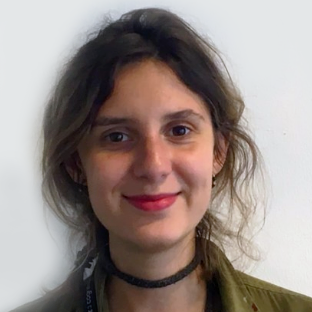
 The spread of the pandemic offers new opportunities to investigate the relationship between neighbourhood deprivation and well-being. There is
The spread of the pandemic offers new opportunities to investigate the relationship between neighbourhood deprivation and well-being. There is
growing evidence that Covid-19 has exacerbated existing spatial inequalities.
Authors investigate the combined effects of the Covid-19 crisis and living in U.K. deprived neighbourhoods on two dimensions of subjective well-being: hedonic (i.e. mental health) and evaluative (i.e. life satisfaction) subjective well-being.
Their starting hypothesis is that individuals who live in more deprived neighbourhoods, which tend to be more densely populated with smaller houses and overall less desirable living conditions, have experienced the effect of the pandemic more severely than those living in less deprived areas.
They use data from Understanding Society, the UK Household Longitudinal Study, which began in 2009 and covers over 100,000 individuals from around 40,000 households in the UK. In addition, they designed specific surveys for understanding the changing impact of the pandemic on the welfare of UK individuals.
A complex statistical analysis with a set of cross-sectional Ordinary Least Squares regressions and a fixed effect difference-in-differences model is fully described in the paper.
Among the results: for those living in more deprived neighbourhoods the level of hedonic well-being decreased more than for those living in better areas. But there is no such difference for evaluative well-being. Before the Covid-19 lockdown both hedonic and evaluative well-being measures were strongly negatively correlated with neighbourhood deprivation, but the restrictions imposed during the lockdown have had a different effect on the two correlations.
Birth Order and First Sexual Experience: Do Siblings Influence Sexual Debut in Adolescents?

 Image Dmitry Naumov (via Shutterstock)
Image Dmitry Naumov (via Shutterstock)
Birth Order and First Sexual Experience:
Do Siblings Influence Sexual Debut in Adolescents?
Marta Pasqualini (Sciences Po - OSC), Amanda Sacker (University College of London)
& Anne McMunn (University College of London)
Archives of Sexual Behavior, The Official Pulication of the International Academy of Sex Research
First Published, 21 August 2021 (Open Access)
Authors explored the relationship between birth order, sex, timing of sexual initiation, and its consequences for risky sexual behavior and sexual health. They evaluated several research hypothesis. Data are drawn from the third UK National Survey of Sexual Attitudes and lifestyles. A selected sample of young adults aged 16-24 sexually active was build for face to face interviews and self-completion questionnaires.
Birth order represents a social determinant of individual development, which strongly affects the propensity to adopt certain behaviors and attitudes. Empirical evidence has suggested that siblings are major socializing agents with regard to issues that are relevant for adolescents, such as the first sexual experience.
Whereas women born as only-children were more likely to sexually debut at later ages, middle-child boys were significantly more prone to initiate sexual intercourse earlier compared with first-borns. As expected, early sexual initiation was associated with riskier behaviors and sexual health outcomes.
Authors hypothesized that having a sister as the confidant concerning sexual issues would protect both men and women from adopting risky behaviors and contracting sexual diseases (“mentor effect”)... read here the full paper to consult the whole results and strengths.
Uncertain Matchmaking: the Reproduction of Unequal Opportunities through the Hiring Process

 Illustration d'après nnnnae (via Shutterstock)
Illustration d'après nnnnae (via Shutterstock)
OSC Scientific Seminar 2021-2022
Friday 3rd September 2021, 11:30 am / 1:00 pm (Zoom videoconference)
Uncertain Matchmaking: the Reproduction of Unequal Opportunities
through the Hiring Process
Gerbrand Tholen
Senior Lecturer in Sociology, City, University of London
 The paper to be presented analyses how employers identify their labour market needs within the recruitment and selection process. It is based on a qualitative study of external recruitment consultants who help employers hire professionals in sectors such as engineering, finance, and marketing. It demonstrates that relational claim-making and categorisation by employers – and negotiation between stakeholders, including consultants – fundamentally shape what constitutes a suitable or desirable candidate.
The paper to be presented analyses how employers identify their labour market needs within the recruitment and selection process. It is based on a qualitative study of external recruitment consultants who help employers hire professionals in sectors such as engineering, finance, and marketing. It demonstrates that relational claim-making and categorisation by employers – and negotiation between stakeholders, including consultants – fundamentally shape what constitutes a suitable or desirable candidate.
The paper argues that this leads to unequal opportunities for particular groups and individuals, using two examples. The first part investigates how organisational fit is defined and applied by employers. The second part explains how hiring criteria and requirements are co-created and continue to shift during the recruitment process.
Registration is mandatory to join the ZOOM meeting (the link will be sent one day before).
The End of Austerity as Common Sense?

 Picture: 1358bensalvo (via Shutterstock) - "Austerity wage reduction"
Picture: 1358bensalvo (via Shutterstock) - "Austerity wage reduction"
The End of Austerity as Common Sense?: An Experimental Analysis of Public Opinion Shifts and Class Dynamics During the Covid-19 Crisis
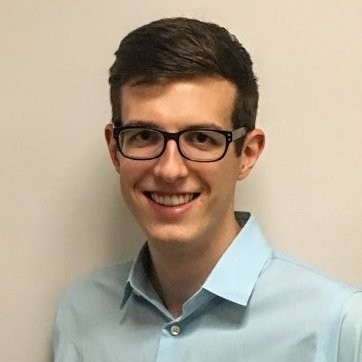
 Emanuele Ferragina (Associate Professor, Sciences Po - OSC)
Emanuele Ferragina (Associate Professor, Sciences Po - OSC)
Andrew Zola (Research Assistant and Ms Student, Sciences Po)
New Political Economy, online 20th July 2021 - The paper is available online for subscribers (Taylor & Francis journals)
The authors investigate the question of the austerity politics acceptance during the Covid-19 crisis in France. They test if citizens’ viewpoints are sensitive to the trade-off between health and economics, receptive to austerity and conditioned by their socioeconomic status. They find change into public opinion through the lockdown and afterwards.
"The aim of this paper is to understand if, and to what degree, public opinion regarding the suitability of austerity politics and support for public services has begun to realign. While the French public appears to have widely acquiesced to fiscal consolidation measures in the aftermath of the global financial crisis, we examine whether this is still the case today. Theoretically, we take pro-austerity crisis narratives as our basis for measuring public attitudes. These narratives make the policy path towards fiscal consolidation appear as a necessary and inevitable response to economic crisis".
"The Covid-19 pandemic constitutes an exceptional setting to study the salience of austerity in crisis narratives. Moving within this context, our paper provides a timely analysis of public viewpoints of austerity in the midst of a public health and economic crisis based on a unique set of panel data and a methodological approach mixing survey questions and experiments".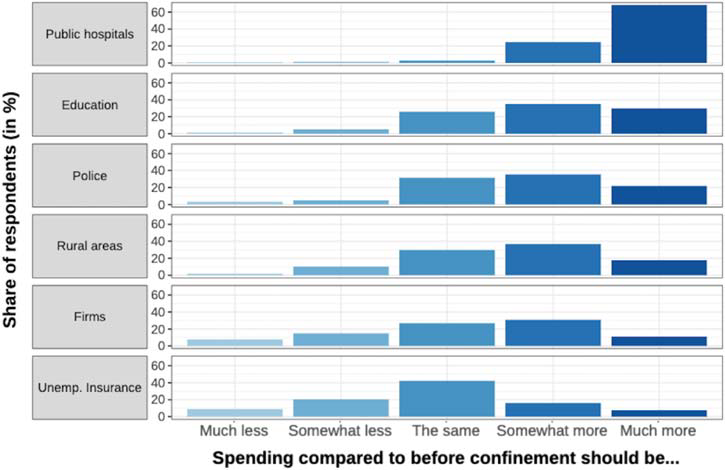 "Our empirical evidence suggests that public preferences favour increased public spending in relation to pre-epidemic levels, especially in healthcare and education — sectors greatly impacted by austerity measures in the recent past. Additionally, while public opinion is highly manipulable with authoritative messages about health and economic concerns, this is not the case with pro-austerity crisis narratives for the large majority of the public. Only the upper class (...) continue to partially support these narratives".
"Our empirical evidence suggests that public preferences favour increased public spending in relation to pre-epidemic levels, especially in healthcare and education — sectors greatly impacted by austerity measures in the recent past. Additionally, while public opinion is highly manipulable with authoritative messages about health and economic concerns, this is not the case with pro-austerity crisis narratives for the large majority of the public. Only the upper class (...) continue to partially support these narratives".
"The potential implications of these results for the study of class and conflict in political economy and sociology are considerable. There is a class divide of public preferences for austerity that cuts across wealth, profession and self-perception of position in society. Does this mean that the crisis precipitated by the Covid-19 outbreak might contribute both to an increased division of material privilege along class lines (‘class in itself’) and also to increased divisions in the ‘common sense’ held by these groups (‘class for itself’)?"
"Our findings seem to suggest that the political economy order underpinned by neoliberal economics and austerity does not seem to be considered as viable by the large majority of the French public".
Une analyse territoriale fine de l'exposition à l'insécurité en Île-de-France

 Image Vasin Lee (via Shutterstock)
Image Vasin Lee (via Shutterstock)
Comment affiner des statistiques qui peuvent apparaître trompeuses s'agissant du sentiment d'insécurité ou de la victimation ? Comment sortir d'un effet de stigmatisation de certains quartiers ? L'exposition à la délinquance gagnerait à être analysée de manière fine, en tenant compte de la diversité des territoires : ville centre, périurbain, lointaine banlieue...
C'était l'objectif des chercheurs du Centre de recherches Sociologiques sur le Droit et les Institutions Pénales (CESDIP) et de l'OSC réunis dans le projet INSOCPOL (financement ANR - Appel à projet « Inégalités, discriminations, migrations ») clôturé en 2020. On en trouvera les principales conclusions exposées dans un article de la revue Déviance et société.
Antoine Jardin (CESDIP), Edmond Préteceille (Sciences Po - OSC), Philippe Robert (CESDIP) et Renée Zaubermann (CESDIP), « Territoires et insécurité en Île-de-France », Déviance et société, vol. 45, n° 2, p. 319-355, juin 2021. Article disponible sur CAIRN.
Déjà en 2005, des chercheurs de l'OSC (Nicolas Herpin et Hugues Lagrange), avait distingué dans leurs travaux les zones résidentielles aisées peu concernées par la délinquance, les centres-villes exposés à la victimation mais sans grande inquiétude exprimée et des zones populaire de relégation très affectées par le sentiment d'insécurité. Au fil des études, la typologie s'est enrichie... les scientifiques cherchant à combiner les caractéristiques des populations avec les spécificités territoriales.
Dans le projet ici présenté, les chercheurs sont partis des caractéristiques des unités territoriales en combinant 4 bases de données permettant de construire 4 types d'indicateurs :
- les enquêtes de victimations ont permis de bâtir des indicateurs d'atteintes aux personnes et de sentiment d'insécurité (Institut Paris Région) ;
- l'INSEE a fourni la composition socioprofessionnelle ainsi que l'origine géographique des populations présentes sur l'unité (recensement national à l'échelle de l'IRIS) et Edmond Préteceille a pu tirer profit de sa typologie des types socioprofessionnels (à partir des PCS) et de celle des types migratoires pour situer le milieu social et la présence de populations immigrées ;
- enfin l'analyse des résultats électoraux a fourni un indicateur des comportements politiques sur la question de l'insécurité.
La maille territoriale d'observation revêt une importance particulière. Les chercheurs ont finalement choisi la commune (arrondissement à Paris) pour exploiter les données. Une comparaison des territoires a pu être menée, chaque commune possédant ses variables de profil de composition sociale et migratoire, victimation, peurs et préoccupations, rapport au quartier et résultats électoraux.
L'étude fait ressortir 8 types distincts de territoires :
- Sécure de la bourgeoisie parisienne
- Sécure des classes supérieures à Paris
- De classe moyenne supérieures parisienne, avec victimes ++ et insécurité -
- De grande banlieue, avec victimes - et peu insécure
- De banlieue éloignée moyen/mélangé, avec victimes - et insécure +
- De proche banlieue moyen/mélangé, peu insécure
- De banlieue éloignée, petite classe moyenne et ouvrière, avec insécurité ++
- Prolétaire et immigré de proche banlieue, avec victimes ++ et insécurité ++
Les auteurs de l'étude tirent plusieurs conclusions exposées dans l'article.
Les espaces apparaissent très divers par leur exposition à certaines victimations ou au sentiment d'insécurité, les deux n'étant pas toujours corrélés. Victimations et sentiment d'insécurité ne fonctionnent pas selon la même logique.
Le risque de victimation est lié à la position géographique, culminant dans la capitale.
L'insécurité concerne les classes « dominées » selon 2 modalités : territoires de la précarisation et hantise de la précarisation...
We're hiring a postdoctoral fellow

 Image Susan Leggett (via Shutterstock)
Image Susan Leggett (via Shutterstock)
The OSC is hiring a Postdoctoral fellow for the project "Assessing the Individual and Societal Economic Consequences of Premature Widowhood following the Covid-19 Pandemic", leading by Zachary Van Winkle (ANR funded).
The project involves different European teams (INED, ENSAE, University of Cologne, Finnish Centre for Pensions and Oxford University) to examine the individual, economic and social consequences of the increase in premature widowhood resulting from deaths linked to the covid-19 pandemic. It aims to expand the knowledge base on widowhood and to enable policy makers to adapt social policies in response to the pandemic.
The person recruited will be expected:
- To work in collaboration with the project leader on the analysis of data from the Survey on Health, Ageing and Retirement in Europe, the Permanent Demographic Sample and the tax data (provided by the CASD Secure Data Access Centre),
- To contribute to the production of papers for publication in academic journals or dissemination within international networks.
She/he will be funded to participate in international conferences, will be integrated into the international research team of the project, as well as into the OSC, which will provide a supportive working environment.
Skills required:
- PhD in social sciences, preferably in sociology, demography or economics
- Processing and analysis of quantitative data with Stata and/or R
- Proficiency in scientific English
Starting date: 01/10/2021
Duration: 9 months
Application file must be send by e-mail before 31 July 2021 to Zachary Van Winkle with a CV and a letter of motivation.
Nouveau regard sur le rural et l'urbain via les statistiques éducatives
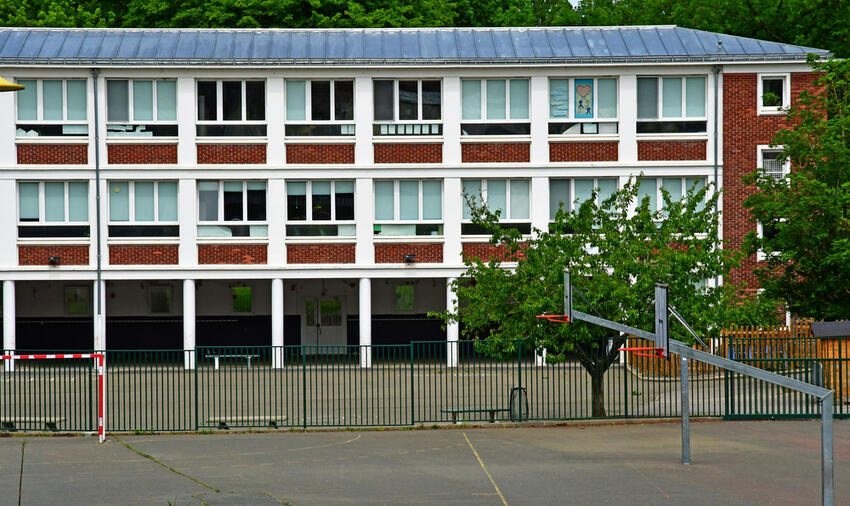
 Image Pack-Shot (via Shutterstock)
Image Pack-Shot (via Shutterstock)
Du rural à l'urbain, les variations du milieu social des collégiens selon la densité des communes et la proximité des villes
Olivier Monso (DEPP-MENJS, sous-direction des synthèses), Sciences Po - OSC et LIEPP
Education et formations, n° 102, « Les territoires de l'éducation : des approches nouvelles, des enjeux renouvelés », numéro dirigé par Jean-Richard Cytermann et Olivier Monso, p. 105-132. Article disponible en ligne.
Plusieurs articles de ce numéro de Education et formations ont pour objectif de montrer comment le fonctionnement du système éducatif, le parcours, la réussite des élèves, se différencient selon le type de territoire. Du rural éloigné à l’urbain très dense, les problématiques éducatives et les réponses qui leur sont apportées peuvent être différentes. Ces comparaisons, pour être faites de façon pertinente, prennent en compte le fait que les élèves résidant dans le rural ne correspondent pas en tous points aux élèves urbains, en matière de contexte socioéconomique et notamment de milieu social. À défaut d’intégrer cette dimension dans l’analyse, on risque d’interpréter de façon erronée le lien entre le type de territoire et les variables éducatives.
La première partie de cet article décrit les milieux sociaux des parents d’élèves du point de vue de leur groupe socioprofessionnel, issu de la nomenclature des professions et catégories socioprofessionnelles (PCS) de l’Insee. La seconde partie mobilise un indice synthétique élaboré par la DEPP à partir des professions des deux parents, prenant en compte leur lien avec les ressources culturelles et matérielles facilitant la réussite scolaire. Cette double approche permet, à la fois, d’étudier comment les transformations de la structure sociale des actifs français se traduisent dans celle des parents d’élèves, et d’envisager les conséquences que ces transformations pourraient avoir sur la réussite et les parcours scolaires.
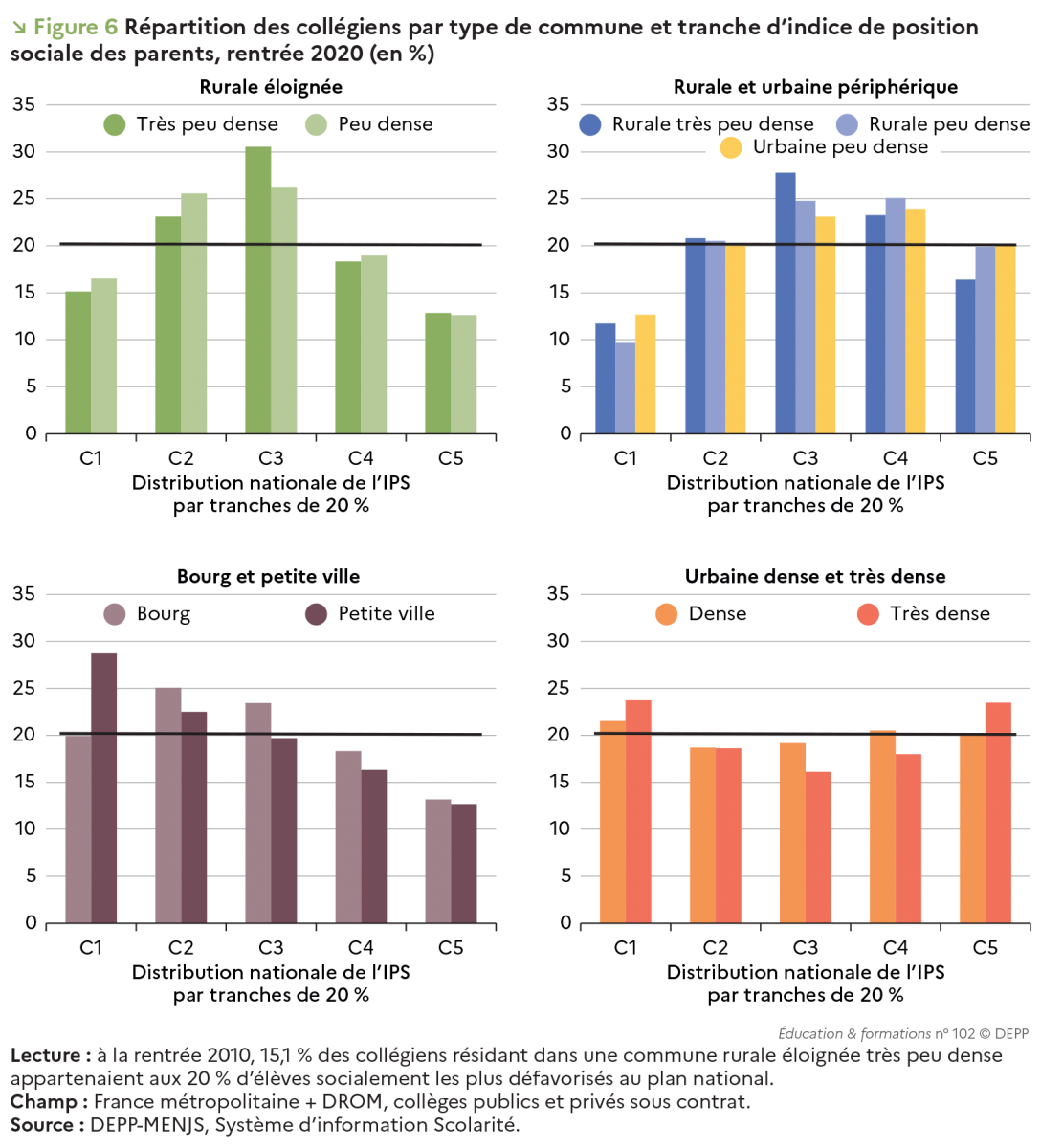 Quelques constats :
Quelques constats :
En appliquant la définition de la ruralité « historique », encore courante dans la statistique publique, appuyée sur les communes hors unité urbaine, il ne semble plus possible, aujourd’hui, de dire que les élèves issus d’un milieu rural sont plus défavorisés socialement que les élèves urbains.
(...) les positions sociales restent plus défavorisées dans les types de communes éloignées des principaux centres urbains et de leur périphérie, qui incluent également les bourgs et les petites villes. Ces dernières ont connu, dans leur ensemble, une précarisation relative, ne bénéficiant pas (ou peu) de la dynamique des métropoles, ni de l’attractivité résidentielle de certains territoires ruraux.
Inversement, les élèves ayant les situations sociales les plus favorables, en moyenne, se situent aujourd’hui dans le rural et l’urbain périphérique peu dense, qui ont bénéficié d’un dynamisme économique et résidentiel relativement aux autres types de communes. Bien que classées, l’une dans le rural, l’autre dans l’urbain selon la définition historique de la ruralité, ces deux types de communes partagent des similitudes quant aux milieux sociaux des collégiens.
L'article intégral est téléchargeable ici (pdf, 1,4 Mo).
Lien vers le sommaire de la revue, numéro 102.
Comprendre la ségrégation genrée des cursus et métiers

 Image LightField Studios (via Shutterstock)
Image LightField Studios (via Shutterstock)
Cursus et métiers : comprendre la ségrégation genrée
En matière d’éducation, les femmes surpassent désormais les hommes : leurs taux de réussite aux diplômes dans le secondaire et l’enseignement supérieur sont nettement plus élevés dans quasiment tous les pays de l’OCDE (1). Grâce à ces progrès, les écarts de rémunération et de carrière entre les sexes se sont considérablement réduits au cours des dernières décennies. Aujourd’hui, les femmes accèdent autant que les hommes aux emplois diplômés.
Cependant, lorsque l’on examine leurs domaines d’études, les femmes restent sous-représentées dans certains emplois, en particulier les mieux rémunérés comme l’ingénierie et les TIC. Au contraire, elles sont surreprésentées dans d’autres emplois ou secteurs, caractérisés par des revenus inférieurs à la moyenne, tels que le domaine artistique ou les sciences humaines.
On constate aussi que la ségrégation entre les sexes dans l’enseignement supérieur est très résistante au changement, y compris dans les cohortes les plus récentes.
Or, cette ségrégation dans les métiers et les secteurs est l’un des facteurs principaux expliquant l’écart salarial entre les hommes et les femmes. Il faut donc comprendre comment et quand elle se génère, afin de la contrer par des politiques efficaces. Malheureusement, ses ressorts ont été peu étudiés. Si plusieurs hypothèses ont été proposées, les preuves empiriques restent rares et surtout limitées aux États-Unis.
Pour éclaircir cette énigme, Carlo Barone et Estelle Herbaut ont exploité une riche enquête longitudinale à grande échelle, réalisée en France par l’office statistique du Ministère de l’Éducation nationale (DEPP). Elle permet de suivre une cohorte d’étudiants depuis leur entrée dans l’enseignement secondaire jusqu’à la fin de leur cursus supérieur. Les auteurs ont ainsi utilisé un ensemble de données recueillies auprès d’élèves, d’enseignants, de parents et de plusieurs sources administratives (2).
La suite de l'article est à retrouver sur la page du magazine COGITO : https://www.sciencespo.fr/research/cogito/home/cursus-et-metiers-comprendre-la-segregation-genree/
Version en anglais prochainement disponible.
(1) En France 26% des femmes, contre 23% des hommes, ont en 2020 un diplôme de niveau Bac+3 (Source INSEE).
(2) Estelle Herbaut, Carlo Barone, “Explaining gender segregation in higher education: longitudinal evidence on the French case”, British Journal of Sociology of Education, 2021.
The Social Life of Inequality: Why Unequal Countries Stay That Way

 Image Kent E Roberts (via Shutterstock). Gate Housing Community at Venice FL
Image Kent E Roberts (via Shutterstock). Gate Housing Community at Venice FL
OSC Scientific Seminar 2020-2021
Friday 2nd July 2021, 4:00 pm / 5:30 pm (Zoom videoconference)
The Social Life of Inequality: Why Unequal Countries Stay That Way
Jonathan Mijs
Boston University & Erasmus University Rotterdam
 This talk offers a diagnosis for the current political moment marking societies across the west, where historically high levels of inequality have been met with limited public consternation.
This talk offers a diagnosis for the current political moment marking societies across the west, where historically high levels of inequality have been met with limited public consternation.
In fact, research suggests that residents of more economically unequal societies tend to be less worried about inequality than people in more egalitarian countries. Understanding why requires that we take a closer look at the “social life of inequality.”
How have decades of growing inequality shaped and reshaped the social landscape: our social networks, neighborhoods, schools and workplaces? I argue that inequality increases the distance between rich and poor, who increasingly live their lives in separate neighborhoods, schools, and workplaces and befriend, date, and marry people exclusively from within their own socio-economic circles.
This disconnect means that neither rich nor poor can see the full extent of inequality in their everyday life or appreciate the non-meritocratic causes of economic “success” and “failure.”
From this diagnosis follow four suggestions for the study of perceptions, beliefs, and attitudes about inequality:
(1) A need to firm up the theoretical grounds from which we start data collection, specifically our conceptualizations of belief formation and belief change;
(2) Widening the empirical scope to include case studies and comparative research on non-Western settings;
(3) More attention to how beliefs and processes of belief formation and belief change are socially situated, locally and in social interaction;
(4) Consideration of alternative methodologies to study belief formation in action.
Registration is mandatory to join the ZOOM meeting (the link will be sent one day before).
Jonathan Mijs is an Marie Skłodowska-Curie Fellow at Erasmus University Rotterdam.
He held appointments as Lecturer on Sociology at Harvard University and Assistant Professorial Research Fellow at the International Inequalities Institute, London School of Economics.
His UnEquality project investigates how people across the Atlantic make sense of inequality, and how their beliefs in turn fuel feelings of sympathy and solidarity with fellow citizens, inform their policy attitudes and motivate their political behavior.
Angela Greulich membre de l'IUF
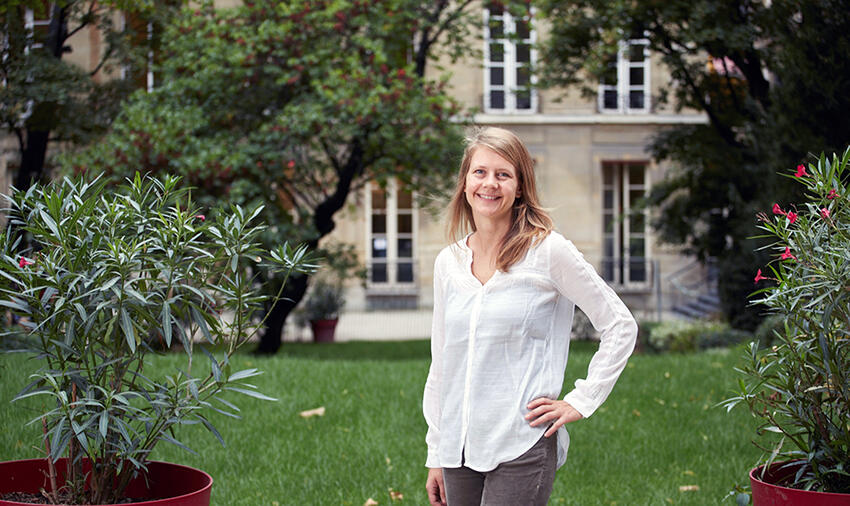
 Image Alexis Lecomte, Sciences Po
Image Alexis Lecomte, Sciences Po
L'Institut universitaire de France favorise, depuis 30 ans, le développement de la recherche de haut niveau en renfonçant l'interdisciplinarité. Chaque année, elle nomme, après examen de leur dossier, des lauréats qui deviennent membres juniors ou séniors de l'Institut pour une durée de 5 ans. Ce statut présente plusieurs avantages : outre des crédits de recherche et une prime d'encadrement doctoral et de recherche, il permet de consacrer plus de temps aux travaux scientifiques pour mener à bien des projets innovants et nouer des partenariats.
Après l'INED et l'Université Paris 1 Panthéon Sorbonne, Angela Greulich, a rejoint l'OSC en 2019, où elle est aujourd'hui Professeure des universités. Elle inscrit ses recherches dans le champs de la démographie économique, observant les évolutions affectant les structures familliales, notamment les inégalités de genre, d'éducation et de revenus.
Lauréate du concours 2021, elle envisage avec enthousiame les années qui viennent :
« Je suis très heureuse d'être membre junior de l'IUF. Ma délégation me permettra de disposer de temps et de moyens financiers supplémentaires pour réaliser un projet de recherche qui se focalise sur les interactions entre dynamiques démographiques, activités professionnelles des femmes et politiques sociales dans les pays européens. Dans mon projet de recherche IUF, je vais décrire et évaluer les différentiels intra-pays de fécondité périodique et leur dépendance au contexte institutionnel en Europe. Les gradients éducatifs des niveaux de fécondité seront quantifiés pour les cohortes qui sont actuellement en âge de procréer, en couvrant l'ensemble des pays européens, pendant plus de 15 années. Ces nouvelles données démographiques permettront d'améliorer l'évaluation des impacts des politiques sur les différentiels et les niveaux de fécondité en Europe. En mettant l'accent sur l'interaction entre les politiques familiales et les fonctionnalités du marché du travail, le projet vise à mieux comprendre comment les incohérences politiques entraînent actuellement des inégalités de fécondité entre, et au sein, des pays européens. »
[English] Angela Greulich is junior fellow of the Institut universitaire de France (IUF), 2021-2026. Since 30 years, the IUF grants researchers to reinforce interdisciplinarity, excellence and international recognition.
"I am very happy to be a junior member of IUF. My delegation (2021-2026) will allow me to have additional time and financial resources for realizing a research project that focusses on interactions between demographic dynamics, women’s working activities and social policies in European countries. In my IUF research project, I will describe and evaluate within-country differentials in period fertility and their context dependency in Europe. Educational gradients of fertility levels will be quantified for those cohorts who are currently at childbearing age by covering the whole set of European countries, during more than 15 years. These new demographic measures enable improving the assessment of policy impacts on fertility differentials and levels in Europe. By setting the focus on the interplay between family policies and labour market functionalities, the project intends to provide a better understanding of how policy incoherencies currently cause fertility inequalities between and within European countries."
A New Old Macroeconomics of Social Cohesion:

 Image StunningArt (via Shuttersstock)
Image StunningArt (via Shuttersstock)
OSC Scientific Seminar 2020-2021
Friday 18th June 2021, 11:30 am / 1:00 pm (Zoom videoconference)
A New Old Macroeconomics of Social Cohesion:
Rising Prosperity Still Trumps Rising Inequality, at Least for Many
Markus Gangl
Professor of Sociology
Goethe-University Frankfurt, Dpt of Social Sciences
The presentation takes up concerns about socially corrosive effects of rising economic inequality in Western societies. We compile a harmonized database of cross-nationally comparable survey data from 32 countries and spanning a four-decade observation window to provide new evidence on the relationship between inequality and social trust. We not the least conduct our research in response to the empirical challenge posed by the conflicting evidence from prior research based on cross-sectional data (that generally confirms a negative effect of inequality on trust) and more recent studies using longitudinal designs (that offer much less conclusive evidence, at least when considering countries other than the United States).
Based on our own estimates, we contribute the following key observations: first, rising economic inequality has led to lower levels of trust, but properly isolating this effect requires to account for the role of simultaneous increases in prosperity. Rising prosperity increases social trust, and tends to empirically outweigh the adverse effects of rising inequality in the aggregate. However, there is evidence of a tunnel effect, i.e. declining tolerance of inequality at higher levels of prosperity, so that inclusive growth and public redistribution become increasingly important for sustaining social cohesion.
Finally, we find that positive implications of rising prosperity to a significant extent accrue as private gains among successful citizens, so that the contextual effects of macroeconomic conditions appear decidedly more negative than their total effects. As contextual effects furthermore vary by level of education, we find rising prosperity (but not rising inequality) to create an increasing trust wedge between privileged and less fortunate members of society.
Registration is mandatory to join the ZOOM meeting (the link will be sent one day before).
Fariba Adelkhah
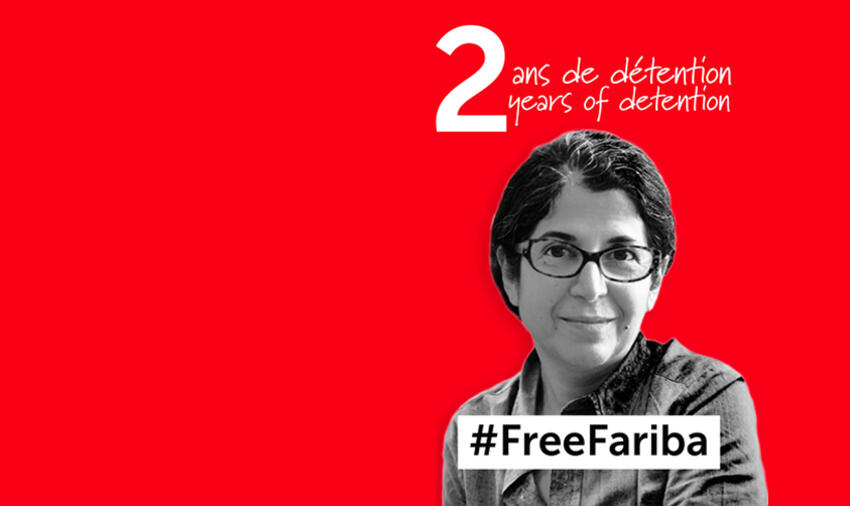
 Actualité Sciences Po
Actualité Sciences Po
Fariba Adelkhah : deux ans sans liberté
2 ans de privation de liberté : le 5 juin 2021 marque le deuxième anniversaire de l’arrestation en Iran de Fariba Adelkhah et Roland Marchal, chercheurs du centre de recherches internationales de Sciences Po (CERI).
Si Roland Marchal a été libéré le 20 mars 2020, Fariba Adelkhah demeure, depuis deux ans, “privée de liberté sur la seule base de ses travaux universitaires,” selon le comité de soutien à la chercheuse qui le souligne dans une tribune à l’occasion de ce triste anniversaire.
Fariba Adelkhah a été condamnée le 16 mai 2020 à cinq ans de prison pour « collusion en vue d’attenter à la sûreté nationale » et « propagande contre le système » politique de la République islamique d’Iran. Après un an et quatre mois d’incarcération à la prison d’Evin, au cours de laquelle elle a mené une grève de la faim de 49 jours conjointement avec l’universitaire australienne Kylie Moore-Gilbert aussi incarcérée en Iran, elle a pu bénéficier le 3 octobre 2020 d’une permission de sortie et a regagné son domicile à Téhéran où elle est assignée à résidence, sous contrôle d'un bracelet électronique.
“Vu de loin, cela peut sembler être un régime de privation de liberté moins sévère. Vécu de près, tel n’est pas forcément le cas : c’est sortir des murs d’une prison pour retrouver ceux d’un périmètre de 300 mètres qu’elle ne pourra pas franchir pendant trois ans encore” écrit le comité de soutien : “Mais c’est surtout, pour Fariba, être encore privée de sa vie affective et professionnelle depuis deux ans pour la seule et unique raison qu’elle a exercé son métier d’anthropologue en toute intégrité scientifique.”
Fariba Adelkhah a été nommée “Femme scientifique de l’année 2020” le 15 décembre dernier, recevant le Prix Irène Joliot-Curie décerné par le Ministère de l'enseignement supérieur et de la recherche pour l'ensemble de ses travaux de recherche en anthropologie et science politique.
Sciences Po et les autorités françaises continuent de tout mettre en œuvre pour que Fariba Adelkhah soit définitivement libérée sans condition.
Avec le comité de soutien, rappelons-le : “À travers elle, c’est chacune et chacun d’entre nous qui est attaqué(e) car, comme l’écrit Fariba Adelkhah dans l’un de ses derniers papiers, « la recherche est l’abreuvoir de la liberté »”.
Free Fariba !
En savoir plus :
A contentious category: ethnoracial self-identification in a colorblind France

 Image d'après melitas (via Shutterstock)
Image d'après melitas (via Shutterstock)
OSC Scientific Seminar 2020-2021
Friday 11th June 2021, 11:30 / 13:00 am (Zoom videoconference)
A contentious category: ethnoracial self-identification in a colorblind France
Patrick Simon
Directeur de recherche, INED
Unité Migrations internationales et Minorités
Recent controversies about the use of the concepts of race, racialization, institutional racism, etc in social science and antiracist activism are echoing recurring so-called ethnic statistics controversies in France. Indeed, studying race is contentious in the French context, and especially in quantitative studies. The first article of the Constitution has been recently revised to delete reference to race as an illegitimate distinction in laws and policies. Beyond the legal and political framing, what consequences produces this reinforcement of colorblindness in social representations and interactions. Instances of racialization in social life have not been curtailed by the colorblind framing, even though it is plausible that such framing has an impact on the forms and intensity of racial tropes in colorblind vs race-conscious societies.
To contribute to this research agenda, our paper, written with Haley McAvay, will take stock of questions about ethnoracial identification in an handful of surveys in France, namely the "Mesure de la diversité" survey (Ined, 2006), "Perceptions et expériences des discriminations en Ile-de-France" (ARDIS/INED, 2015) and "Accès aux droits" (DDD, 2016).
After a quick overview of the issues with ethnoracial statistics in France, I will discuss the answers to self and third party identifications in ethnoracial classification in these surveys. The refusals to self-identified are collected via different items, from the usual non response to a "I don't fit in" opt out version or non expected answers like "Human", "Citizen of the world", etc. These answers vary consistently across ethnicity and race, other socio-demographic profiles and social experiences including discrimination. These answers document indirectly a state of the art of the racialization processes in France and the different ways to cope with them.
Registration is mandatory to join the ZOOM meeting (the link will be sent one day before).
Offre de contrat doctoral
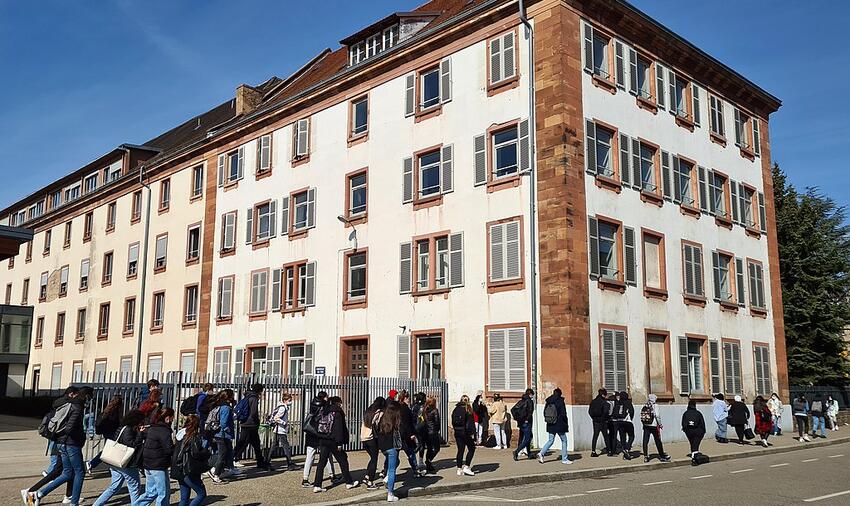
 Image Ji_Elle (CC BY-SA 4.0)
Image Ji_Elle (CC BY-SA 4.0)
Offre de contrat doctoral CNRS, à l'Observatoire sociologique du changement (Sciences Po - OSC) pour une durée de 36 mois à compter du 1er octobre 2021.
Choix résidentiels et inégalités éducatives. Une comparaison de plusieurs métropoles françaises
La thèse est encadrée par Marco Oberti, Professeur des universités en sociologie à Sciences Po.
Temps complet, rémunération de 2135€ brut mensuel.
La forte augmentation des prix de l'immobilier dans les métropoles conduit une partie des classes moyennes à développer des stratégies résidentielles mettant en jeu l'accession à la propriété, le logement locatif privé ou social afin d'accéder à une offre scolaire publique attractive. La thèse contribuera à analyser ces dynamiques qui ont un impact important sur la ségrégation résidentielle et scolaire, et recoupent des dimensions politiques locales.
La cas parisien faisant déjà l'objet d'études, il s'agira d'élargir l'analyse à d'autres grandes villes françaises, afin de mieux saisir les spécificités locales, et ainsi mieux penser l'articulation des politiques du logement et scolaires dans un objectif de lutte contre les inégalités éducatives.
Compétences attendues : méthodes qualitatives (entretiens et analyse textuelle), méthodes quantitatives (R, Stata), connaissances en cartographie (QGIS), anglais oral et écrit, aptitude au travail en équipe.
Pour déposer votre candidature, créez un compte sur le site emploi du CNRS, puis suivez ce lien vers l'offre proposée (bouton "postuler") où les documents à fournir sont indiqués (mémoire de M2, relevé de notes, lettre de motivation et de recommandation). La date limite de réponse est le 6 juillet 2021.
Discrimination of Muslims in European Labour Markets

 Image Nadia Snopek (via Shutterstock)
Image Nadia Snopek (via Shutterstock)
OSC Scientific Seminar 2020-2021
Friday 28th May 2021, 11:30 / 13:00 am (Zoom videoconference)
Discrimination of Muslims in European Labour Markets:
Evidence from Cross-National Field Experiments
Valentina Di Stasio
Assistant Professor
Utrecht University
European Research Centre on Migration and Ethnic Relations (ERCOMER)
Drawing on the GEMM Project, a cross-nationally harmonized field experiment conducted in five European countries (Britain, Germany, Netherlands, Norway and Spain), I analyze whether and how employers discriminate on the basis of ethnicity, religion and gender when making hiring decisions.
I compare the callbacks received by applicants with identical skills, qualifications and work experience but varying in gender, ethnic and religious background, across different institutional contexts.
In the seminar, I present selected findings from a set of studies on the topic of anti-Muslim discrimination. I show that applicants originating from countries where Islam is the dominant religion are targets of employer discrimination. In particular, in the British context, a meta-analysis indicates that the level of discrimination faced by South Asians is as high today as it was 50 years ago.
With regard to cross-national differences (and similarities!) in discrimination rates, institutional theories cannot convincingly explain the pattern of findings I observe. Results indicate that employers are not simply avoiding applicants from any culturally distant group, but rather show an especially strong reluctance to hire Muslims. At the same time, I find large variation in the callbacks received by Muslim applicants, depending on their country of origin: employers are less likely to hire Muslims originating from more authoritarian and more gender-unequal countries, which suggests that Islam is a brighter boundary for some Muslim groups than others.
Registration is mandatory to join the ZOOM meeting (the link will be sent one day before).
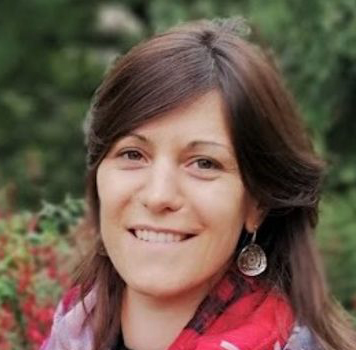 Valentina Di Stasio is Assistant Professor at the Utrecht University - ERCOMER and a research fellow of the WZB Berlin Social Science Centre. Her recent work, based on experimental and observational data, focuses on discrimination on grounds of ethnicity, race, gender and religion, and has a strong comparative focus.
Valentina Di Stasio is Assistant Professor at the Utrecht University - ERCOMER and a research fellow of the WZB Berlin Social Science Centre. Her recent work, based on experimental and observational data, focuses on discrimination on grounds of ethnicity, race, gender and religion, and has a strong comparative focus.
Before joining Utrecht University, Valentina worked at the University of Oxford, the WZB Berlin Social Science Centre and the University of Amsterdam.
Her PhD thesis – "Why Education Matters to Employers: A Vignette Study in Italy, England and the Netherlands" – was awarded a prize for best dissertation of the year (2015) by the European Consortium for Sociological Research.
Her work has been published in various peer-reviewed journals, including: Annual Review of Sociology, Social Forces, European Sociological Review, Sociology of Education, Research in Social Stratification and Mobility, The British Journal of Sociology, Journal of Ethnic and Migration Studies.
The Intersection of Organizational Inequalities

 Image Vitalii Vodolazskyl (via Shutterstock)
Image Vitalii Vodolazskyl (via Shutterstock)
The Intersection of Organizational Inequalities
How Gender, Migrant Status, and Class Inequality Relate to Each Other
in French workplaces
Olivier Godechot (OSC, MaxPo) & Mirna Safi (OSC)


OSC Papers 2021/1 (May 2021, pdf, 1.6Mo, 28 p.)
In this working paper, we combine intersectional and organization theoretical insights and ask how different types of inequality are related within French workplaces. Our motivation is to clarify the meaning of workplaces as “inequality regimes” by asking if workplaces reinforce multiple inequalities or if there are tradeoffs between them.
Using French administrative data and novel techniques, we scrutinize correlations between class, gender and nativity wage gaps at the workplace level. We also study how each of these gaps relate to a fourth measure of wage inequality we call intra-categorical inequality (i.e within the three-level cross-categorization class × gender × nativity).
We discuss two sets of findings. First gender and nativity wage gaps are negatively correlated within workplaces. Second, while the gender gap is higher in more unequal workplaces, the nativity gap is higher in more equal workplaces. Finally, we also ask how industry, urban environment, and various workplace characteristics affect these patterns.
Our findings suggest that workplaces are not just sites of producing multidimensional inequality, but sites which specialize in inequality types.
Katharina Meitinger (Utrecht University)

 Illustration d'après Andrew Krasovitckii (via Shutterstock)
Illustration d'après Andrew Krasovitckii (via Shutterstock)
Assessing Comparability and Explaining Why It is Absent
Katharina Meitinger (Assistant Professor, Utrecht University)
21st May, 11:30am, Online
As part of the Méthodes quantitatives et analyse des données seminar (La soufflerie interdisciplinaire Sciences Po)
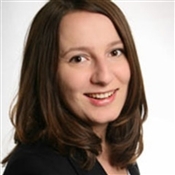 There has been a tremendous increase in cross-national data production in social science research in recent decades. Before drawing substantive conclusions based on cross-national survey data, researchers need to verify whether the measures are indeed comparable. If cross-national data are not tested for comparability, researchers risk confusing methodological artifacts as “real” substantive differences across countries. Therefore, quantitative measurement invariance tests are an essential tool for researchers working with cross-national data.
There has been a tremendous increase in cross-national data production in social science research in recent decades. Before drawing substantive conclusions based on cross-national survey data, researchers need to verify whether the measures are indeed comparable. If cross-national data are not tested for comparability, researchers risk confusing methodological artifacts as “real” substantive differences across countries. Therefore, quantitative measurement invariance tests are an essential tool for researchers working with cross-national data.
However, researchers often find it particularly challenging to establish the highest level of measurement invariance, that is, exact scalar invariance. When measurement invariance is rejected, it is crucial to understand why this is the case. The recently developed qualitative method of web probing can supplement a quantitative assessment and reveal why measures are incomparable.
This presentation will start with a short introduction of different types of biases that can threaten the comparability of data (e.g., construct bias, item bias). This will be followed by an overview of quantitative measurement invariance tests and how missing exact scalar invariance is addressed in the quantitative approach (e.g., alignment, BSEM). It will introduce the qualitative approach of web probing and present results from an article by Meitinger (2017) that illustrates a mixed-methods approach to assess and explain (in)comparability with the example of patriotism and nationalism and the 2013 International Social Survey Program (ISSP) module on “National Identity.”
In addition, the presentation will also discuss further substantive applications of web probing, such as measures of gender attitudes, health, and national identity (national pride and patriotic feelings).
Registration is mandatory to join the ZOOM meeting (the link will be sent one day before).
MORE INFORMATION
Dr Katharina Meitinger, activities and publications (Utrecht University)
Pathways to Social Class: A Sequence Analysis of Class Histories in France

 Image Sergey Tinyakov (via Shutterstock)
Image Sergey Tinyakov (via Shutterstock)
OSC Scientific Seminar 2020-2021
Friday 14th May 2021, 11:30 / 13:00 am (Zoom videoconference)
Pathways to Social Class: A Sequence Analysis of Class Histories in France
Marta Veljkovic
Doctorante, Sciences Po - OSC et INED
While it is generally accepted that life courses are largely structured by the social class to which one belongs, class trajectories have seldom been analyzed in the French context.
Our previous analyses have shown that while the degree of intragenerational mobility has changed (showing a slight increase of career fluidity across cohorts), the structure of this mobility has remained rather stable over time.
Based on this observation, this work focuses on the second dimension of mobility (i.e. its structure) and thus proposes to study the different routes to social classes. Using the retrospective survey Histoire de vie (Insee, 2003) and applying sequence analysis, it seeks to reconstruct the career paths of men and women in order to identify the typical trajectories of entry into different social classes; these class trajectories will then be analysed in the light of the social resources they are likely to share, particularly with regard to the individual’s social origin and level of education.
Registration is mandatory to join the ZOOM meeting (the link will be sent one day before).
Parental employment uncertainty and early childhood development

 Image Fizkes (via Shutterstock)
Image Fizkes (via Shutterstock)
Séminaire scientifique de l'OSC 2020-2021
Vendredi 7 mai 2021, 11h30 / 13h (Zoom video conference)
Parental employment uncertainty and early childhood development.
An analysis of the French case
Marta Facchini
Doctorante, Sciences Po OSC et LIEPP
Early childhood is a critical moment for the development of skills crucial for school success and social adjustment. A large body of literature has described socio-economic gradients in children’s skills. Following the life-course approach, scholars found that in Anglo-Saxon countries a turbulent work trajectory has a negative impact on child skills. However, we lack evidence from countries where parents can access larger and more comprehensive welfare support.
In this work, I investigate whether in France the employment uncertainty of the parents is associated with a reduced development of their children’s cognitive and soft skills. More specifically, I compare households whose parents have a permanent job to households whose parents have temporary jobs. Moreover, I study the role of persistent employment uncertainty, defined as a series of temporary jobs and may include episodes of unemployment.
Using multivariate regressions and linear probability models, I analyze nationally representative data from the birth cohort ELFE, collected by INED and Inserm starting in 2011. This work focuses on the first four waves of the survey, conducted when the children were respectively 2 months old, 1 year old, 2 years old and 3.5 years old.
The first findings depict a complex picture, where the role of employment uncertainty seems to differ according to gender, social class and income of the parents.
L'inscription est obligatoire pour accéder à la session ZOOM (lien envoyé 1 jour avant).
Migrations et santé au prisme du genre

 The Calais Jungle Camp, 2016 - Image Edward Crawford (via shutterstock)
The Calais Jungle Camp, 2016 - Image Edward Crawford (via shutterstock)
Séminaire scientifique de l'OSC 2020-2021
Vendredi 30 avril 2021, 11h30 / 13h (Zoom video conference)
Migrations et santé au prisme du genre
Julie Pannetier
Maîtresse de conférences
Université Paris Nanterre, CRESPPA-GTM
Cette présentation traitera de plusieurs aspects de recherches menées actuellement sur les migrations internationales et la santé des populations. Notamment ceux portant sur les liens entre masculinités et santé en contexte migratoire, ainsi que des éléments sur la santé mentale des populations immigrées et réfugiées. Julie Pannetier s'intéresse aux imbrications entre trajectoires sociales et de santé, analysées sous l’angle des rapports sociaux de sexe, définis comme des rapports inégalitaires et hiérarchisés s’appuyant sur des représentations du masculin et du féminin socialement construites.
L'inscription est obligatoire pour accéder à la session ZOOM (lien envoyé 1 jour avant).
Pour en savoir plus
- Julie Pannetier, présentation et bibliographie (site du CRESPPA)
Test participation or test performance: Why do men benefit from test-based admissions to higher education?

 Image Roman Samborskyi (via Shutterstock)
Image Roman Samborskyi (via Shutterstock)
OSC Scientific Seminar 2020-2021
Friday, 23rd April 2021, 11:30 am / 1 pm (Zoom video conference)
Test participation or test performance:
Why do men benefit from test-based admissions to higher education?
Heike Solga & Claudia Finger
WZB (Berlin Social Science Center), Skill Formation and Labor Markets
This study illuminates the male advantage in test-based admissions to higher education by examining whether this advantage is due to gender differences in test performance or, rarely studied, female avoidance of test situations (i.e., gender differences in test participation).
We use register data for the whole population of more than 300,000 applicants to highly selective and prestigious medical programs in Germany. In contrast to many other countries, admission tests in Germany are optional. This fact offers the unique opportunity to disentangle the two mechanism of test performance versus test participation on gender differences in admission chances.
Our study reveals that men demonstrate better test performance and female applicants are more likely to withdraw from admission tests, however depending on their high school grade point average (GPA): the male advantage in test performance emerges only among test takers with lower GPA and female applicants’ test avoidance only among female applicants with medium GPA. Together, both mechanisms generate a male advantage in test-based admissions (ceteris paribus of GPA), with better test performance being the major source for male applicants’ higher admission chances. As the final outcome, we observe that this male advantage in testing is somewhat neutralized by on average higher GPA of female candidates.
Registration is mandatory to join the ZOOM meeting (the link will be sent one day before).
More information
- Prof. Dr. Heike Solga, Director, Skill Formation and Labor Markets (WZB) & Professor for Sociology, Institute of Sociology, Freie Universitaet Berlin
- Dr. Claudia Finger, Research Fellow of the Research Unit, Skill Formation and Labor Markets (WZB)
A New Look at the Separation Surge in Europe: Contrasting Adult and Child Perspectives

 Images Romolo Tavani (Shutterstock)
Images Romolo Tavani (Shutterstock)
OSC Scientific Seminar 2020-2021
Friday, 16th April 2021, 11:30 am / 1 pm (Zoom video conference)
A New Look at the Separation Surge in Europe:
Contrasting Adult and Child Perspectives
Thomas Leopold
Full Professor, Institute of Sociology and Social Psychology, University of Cologne
This study contrasts adult and child perspectives on divorce and separation. Based on harmonized retrospective life history data from eight European countries, we study the risk of divorce and separation from the perspective of adult unions and the perspective of children born into these unions. The analysis connects adult and child perspectives, focusing on union cohort changes (1945 to 2005) in the associations between parenthood, education, and (parental) separation.
Our findings show that trends differ substantially between adult and child perspectives. First, the cohort surge in divorce and separation is stronger in adults than in children. Second, inequality in the risk of divorce and separation grows faster in children than in adults. For both trends, disparities between adult and child perspectives grow across cohorts due to increasingly negative associations between parenthood, education, and separation. In several countries, the separation surge has been trivial for children of higher-educated couples.
Registration is mandatory to join the ZOOM meeting (the link will be sent one day before)
More information
Inégalités sociales et désynchronisation du sommeil au sein des couples

 Image Antonio Guillem (via Shutterstock)
Image Antonio Guillem (via Shutterstock)
Inégalités sociales et désynchronisation du sommeil au sein des couples
 Capucine Rauch (doctorante, Sciences Po - OSC et INED)
Capucine Rauch (doctorante, Sciences Po - OSC et INED)
Économie et Statistique, INSEE, n° 522-523, avril 2021, p. 81 - 104.
Doi: 10.24187/ecostat.2021.522d.2040
Télécharger l'article - Télécharger les annexes - Voir le numéro sur le site de l'INSEE
Dans la majorité des couples, les conjoints synchronisent leur sommeil, mais la synchronie n’est pas identique dans toutes les classes sociales ; le sommeil des couples d’employés et d’ouvriers est le plus désynchronisé.
À partir des enquêtes Emploi du temps 1986, 1999 et 2010, Capucine Rauch propose une typologie de l’organisation du sommeil au sein des couples, afin d’étudier les facteurs de désynchronisation et leurs évolutions entre le milieu des années 1980 et la fin des années 2000.
Entre ces deux dates, la désynchronisation augmente dans la quasi-totalité des classes sociales, en raison d’un allongement du temps d’écoute de la télévision. Toutefois, les inégalités face aux horaires de travail restent le principal facteur explicatif des différences de synchronisation du sommeil. La désynchronisation du sommeil reflète également les inégalités de genre dans la division du travail au sein des couples, femmes et hommes ne réalisant pas les mêmes activités pendant le sommeil de leur conjoint ou de leur conjointe. Plus la situation dans l’emploi est favorable, plus les individus ont la possibilité d’accorder leurs horaires de travail à ceux de leur partenaire, et plus le couple a la possibilité d’avoir un sommeil synchronisé.
Social Inequalities and the Desynchronisation of Sleep within Couples
Download the Paper, English version - Online Appendices - Economics and Statistics Journal (INSEE)
In the majority of couples, the partners synchronise their sleep; however, synchrony is not the same across all social classes: the sleep of white-collar and blue-collar couples is the most out of sync.
Based on the Time Use Surveys conducted in 1986, 1999 and 2010, we are creating a sleep organisation typology for couples in order to study the factors behind desynchronisation and the ways in which they have changed between the mid-1980s and the late 2000s.
Between these two dates, an increase in desynchronisation has been observed in almost all social classes due to an increase in the amount of time spent watching television. However, inequality with regard to working hours remains the principal factor behind the differences in sleep synchronisation. Sleep desynchronisation also reflects gender inequalities in the division of work between couples, with men and women undertaking different activities while their partner is sleeping. The more favourable a person’s employment situation is, the more opportunity they have to match their working hours to those of their partner, and the greater the opportunity for the couple to synchronise their sleep.

